
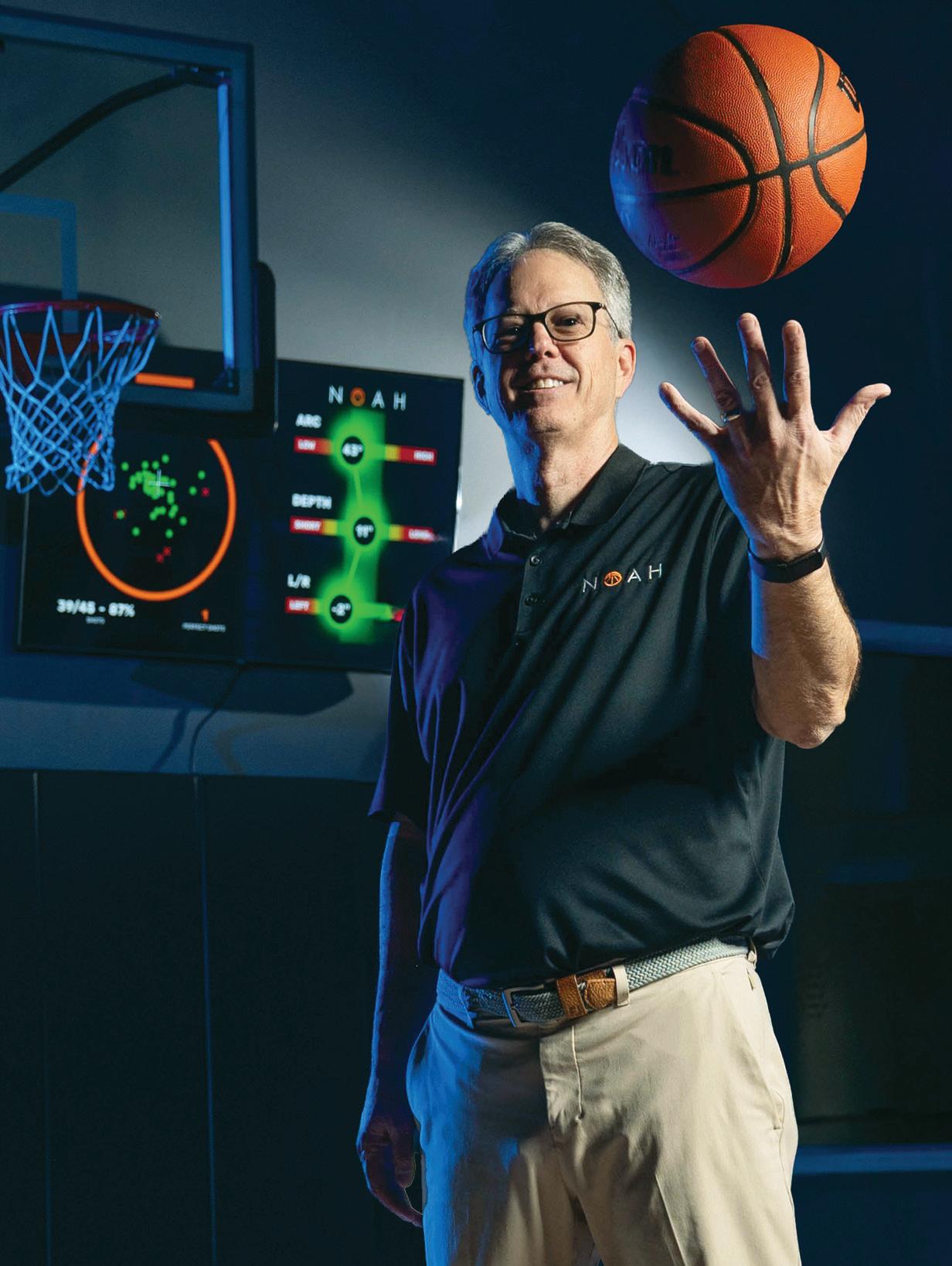



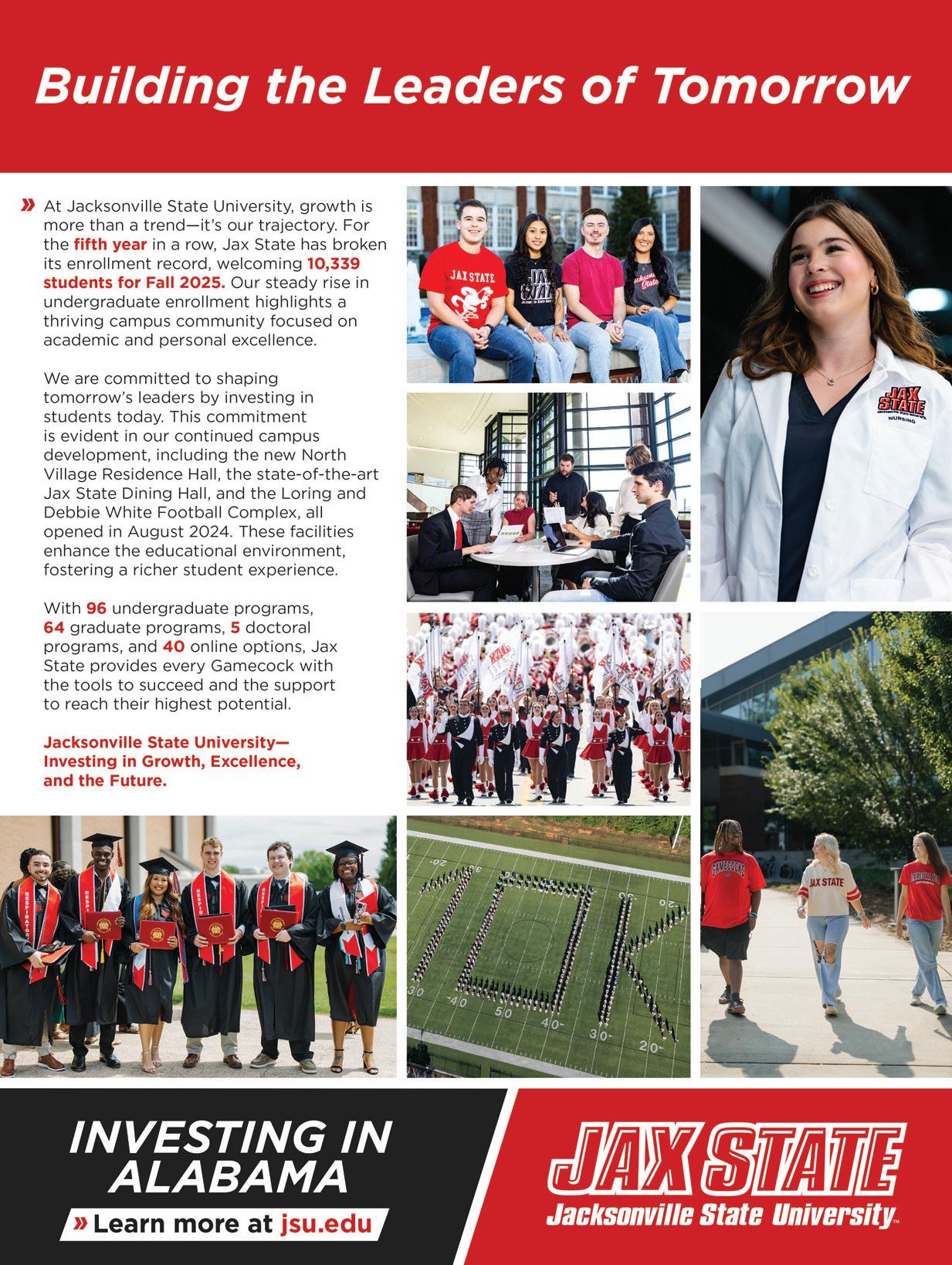

47

63
66
Association
But it’s
Strategies
70
John
77
A temporary fix for Wilson Dam’s floating guide wall allows a steady flow of goods to move swiftly again
98 THREADS OF
The cotton kingdom of Isidor Weil



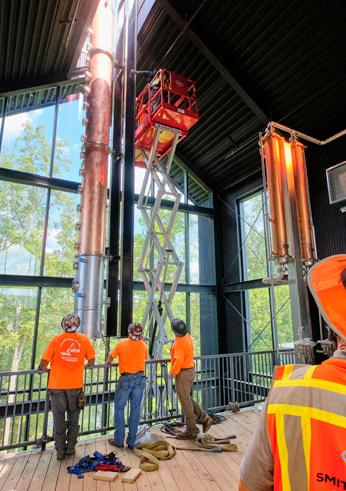


PUBLISHER
Walker Sorrell / wsorrell@pmtpublishing.com
ASSISTANT PUBLISHER
Stephen Potts / snpotts@pmtpublishing.com
EXECUTIVE EDITOR
Alec Harvey / alec@pmtpublishing.com
EDITOR

































Erica Joiner West / ewest@pmtpublishing.com
COPY EDITOR
Nedra Bloom / nedra@pmtpublishing.com
ART DIRECTOR
Vic Wheeler / ads@pmtpublishing.com
DIGITAL EDITOR
Abby Parrott / abby@pmtpublishing.com
ACCOUNTING














Keith Crabtree / acct@pmtpublishing.com








ACCOUNT EXECUTIVES
Birmingham: 205-802-6363
Lee Mills / Ext. 102 / lmills@pmtpublishing.com
Carrie Hicks / Ext. 111 / carrie@pmtpublishing.com
DIRECTOR OF INTEGRATED MEDIA & EVENTS
Sheila Wardy / swardy@pmtpublishing.com
ADMINISTRATIVE
Rachel Mayhall / rmayhall@pmtpublishing.com
BIRMINGHAM OFFICE 3324 Independence Drive / Homewood, AL 35209 205-802-6363
MOBILE OFFICE 166 Government Street / Mobile, AL 36602 251-473-6269
CORPORATE
T.J. Potts, President & CEO
Thomas E. McMillan, Partner & Director
Business Alabama is published monthly by PMT Publishing Co., Inc. Copyright 2025 by PMT Publishing Co., Inc. All rights reserved. Reproduction in whole or in part without written permission prohibited.
Letters to the editor are welcome.
Moving? Please note US Postal Service will not forward magazines mailed through its Bulk Mail unit. Four to six weeks before moving, please send old mailing label and new address to Business Alabama, P.O. Box 43, Congers, NY 109209922 or call 1-833-454-5060.


META has increased its investment in its Montgomery Data Center, which is now under construction, to $1.5 billion. That’s nearly double the originally announced investment of $800 million.
“Meta’s continued investment in Montgomery is a powerful validation of Alabama’s reputation as a destination for world-class technology and innovation,” Alabama Department of Commerce Secretary Ellen McNair said. “This expansion reinforces our state’s ability to compete for global projects, create high-quality jobs and build the infrastructure needed to support a modern economy.”
Meta first announced the data center in April 2024. Once
Alabama ranked 8th overall on Area Development’s list of top states for doing business. The state ranked first for its favorable property tax and in the top 10 in eight other categories.
The Kentuck Festival of the Arts, long a fixture in Northport, has struck a deal with nearby Tuscaloosa to have the festival there the next 15 years. The festival was held in Tuscaloosa’s Snow Hinton Park last year and this year. The Rock the South country music festival, held in Cullman for 15 years, will move to Decatur. The festival will take place in June 2026 at the Fields of Decatur, a 150-acre site.
The University of Alabama board of trustees in September proposed plans for $5 million in upgrades for Bryant-Denny Stadium, including four new suites on each corner of the stadium. The upgrades would begin following the current football season.
Mark Callender has taken the reins as president and CEO of Great Southern Wood Preserving in Abbeville, while longtime CEO Jimmy Rane will be chairman of the board. Clay Scofield is leaving the Business Council of Alabama to become president and CEO of the Energy Institute of
completed, it will total more than 1.3 million square feet and support more than 100 operational jobs. The data center will be part of the global infrastructure that runs Meta technologies such as Facebook and Instagram.
“Montgomery has proven to be a perfect home for a Meta data center,” said Henry Thornton, community development regional manager at Meta. “The support of this incredible community, together with the partnership we’ve experienced with state and local leaders, have made it possible for us to expand our facility and continue investing in Montgomery’s long-term vitality.”
Alabama. Scofield has been executive vice president at BCA since 2023. Joseph Pelfrey stepped down as director of Huntsville’s Marshall Space Flight Center but will remain with the agency. Former Deputy Director Rae Ann Meyer is now acting director. MartinFederal Consulting has promoted Ted Martin to president. Martin joined MartinFed in 2023 as executive vice president, federal solutions. Deanne Kyrimis has been named president and CEO at Mobile’s Springhill Medical Center Scott Gelber has been named CEO at Luckie, a marketing agency with offices in Birmingham and Atlanta. Huntsville banker Ron Poteat
has been named interim CEO of Downtown Huntsville Inc.
AMAZON IN OXFORD
Amazon has opened an 85,000-square-foot delivery facility in Oxford. It is the latest in a number of Amazon facilities opened in Alabama in the past few years.
TIMBER
Molpus Woodlands Group LLC has purchased 173,000 acres of timberland in Alabama, Mississippi and Louisiana. The timberland investment management group has had a presence in Alabama since 1905 and now has offices in Bay Minette and Jasper.

OWENS CORNING is constructing a new manufacturing facility in Prattville that is expected to bring nearly 100 jobs to Autauga County.
“Our new Prattville facility will service our growing contractor network as we strengthen our U.S. manufacturing footprint,” said Nico Del Monaco, Owens Corning Roofing president. “This is an attractive location to service our customers, with a dedicated workforce that takes pride in producing a quality product. We look forward to deepening our engagement with the local community.”
The new 250,000-square-foot plant will house a four-wide laminator capable of producing approximately 6 million squares of laminate shingles per year, increasing Owens Corning’s production capacity for its high-performing roofing products, including its Duration series.
Graham Creek Nature Preserve, in Foley, will undergo a major expansion thanks to a $4 million federal environmental grant. The money will go toward acquiring coastal land for conservation.
Southern Ionics has announced plans for a $34 million expansion at its Tuscaloosa plant where it makes specialty chemicals for water treatment and other industrial applications. Kaishan Compressor USA has completed its $11 million expansion in Loxley. The expansion doubles the size of Kaishan’s 65,000-square-foot facility. Trinity Design Group is doubling the size of its Pell
City repair and logistics center, adding another 30,000 square feet. The company works with returnable packaging for shipment of auto parts to OEM facilities.
Birmingham-based architecture and engineering firm Goodwyn Mills Cawood has acquired Cassetty Architects, a firm based in Nashville. The move expands GMC’s health care division. Waverly Advisors, an investment adviser based in Birmingham, has acquired Brass Tax Wealth Management in Blue Ash, Ohio. This makes Waverly’s 25th acquisition since accepting an equity investment from Wealth Partners Capital Group and HGGC’s Aspire
Based in Toledo, Ohio, the company operates 150 facilities worldwide, with 17 asphalt roofing and components manufacturing facilities in the U.S. following the completion of the Prattville plant.
The project is supported by a $4.9 million investment from the Growing Alabama program, accelerating improvements at the site in Prattville’s South Industrial Park. In addition, AIDT will provide training services valued at $885,000.
“Your decision to invest in Prattville showcases your commitment to innovation and excellence in building materials but also represents a significant milestone for our local economy, which promises to create high-quality jobs, stimulate growth and strengthen our workforce for generations to come,” said Prattville Mayor Bill Gillespie Jr.
Construction is expected to begin soon, with production beginning in Prattville in 2027.
Holdings platform in December 2021. Dothan-based DSI Security Services has acquired Apex3 Systems, a security provider based in Chicago. Several of Apex3’s leaders will step into key executive roles at DSI. Mobile-based Turner Supply has acquired certain assets of Benchmark Industrial Supply, which is headquartered in Nashville. Turner Supply, founded in 1905, is an industrial supply distributor. Birminghambased real estate acquisition and development firm Sanders Capital Partners has acquired the AMA Medical Office Building in Kennett, Missouri. Sanders purchased the building for $3.5 million. Dothan-based Construction Partners Inc.
has acquired eight hot-mix asphalt plants throughout the Houston, Texas, metro area from affiliates of Vulcan Materials Co., also based in Birmingham. The operations will be part of Durwood Greene Construction Co., which Construction Partners acquired last year.
Representatives of Jackson Healthcare and Jackson Investment Group, which have provided a loan to Jackson Hospital & Clinic in Montgomery, told the Montgomery City Council in early October that the hospital might close in 30 days. The hospital has $2 million in the bank, which will run out in 30 days, the groups said.
GLAUKOS CORP., an ophthalmic pharmaceutical and medical technology company, broke ground in late September on a research and manufacturing campus in Huntsville.
The campus, in Cummings Research Park, will focus on therapies for treating glaucoma, corneal disorders and retinal diseases.

Investment in the project will be more than $80 million, the company says.
“We are proud to expand our U.S. footprint with the development of this new state-of-the-art facility to augment our current infrastructure and support our long-term growth plans, underscoring our commitment to American manufacturing and the critical role it plays in advancing healthcare innovation,” said Thomas Burns, Glaukos chairman and chief executive officer. “After evaluating over 100 potential sites worldwide, we ultimately chose Huntsville for its strong talent base and vibrant business climate.”
Huntsville-based Lakeland LHD has been awarded a three-year, $5.6 million contract to provide fire protection gear for the Hong Kong Fire Services Department.
Calhoun Community College cut the ribbon on a major expansion of its Advanced Technology Center in September. It has facilities for training in aerospace, mechatronics, advanced manufacturing and more.
The real estate program at the University of Alabama’s Culverhouse College of Business is now the Rance M. Sanders Real Estate
Program, which includes a new undergraduate major. The name is in recognition of a $5 million gift from UA alumni Rance M. Sanders and Angie L. Sanders of Vestavia Hills.
Tuskegee University has been awarded a $2 million National Science Foundation grant to support the Investing in Brilliance STEM project. The money will be used to fund 23 freshman and sophomore students in mathematics and aerospace engineering with annual scholarships of up to $15,000 for five years.
The city of Huntsville has broken ground on a $44 million
Glaukos’ campus will include a 200,000-square-foot facility on 25 acres with the option of 15 acres for future expansion.
“For decades, Huntsville has worked to build an environment where science, technology and advanced manufacturing thrive together in a community that knows how to support discovery,” said Huntsville Mayor Tommy Battle. “Glaukos’ decision to grow here builds on that foundation, showing how our community’s strengths attract companies that are shaping the future of human health around the world.”
Glaukos is based in Aliso Viejo, California.
expansion of its ice sports center. The expansion will include a second sheet of ice with curling surfaces, a new arena, expanded locker rooms and more.
Limestone County will build a boat launch site on Sugar Creek with a $200,000 grant. The grant is awarded through the federal Land and Water Conservation Fund.
A 400-acre nature preserve in western Jefferson County with hiking and biking trails and mountaintop views will open in the first quarter of 2026. The West Rock Mountain Nature Preserve, in Hueytown, will be on part of an 840-acre property
acquired from the University of Alabama.
A 7.5-foot sculpture of singer/ songwriter Jimmy Buffett is being created to stand in front of Mobile’s National Maritime Museum of the Gulf. The statue is being created by sculptor Ben Victor. Buffett, who died in 2023, grew up in Mobile.
The Alabama Port Authority has awarded a contract to Konecranes for the delivery of two rubber-tired gantry cranes to be used in container handling at the Montgomery Intermodal Container Transfer Facility Konecranes’ U.S. headquarters is in Ohio.
The Mobile Ship Channel, which guides ocean-going vessels to the PORT OF MOBILE, has officially achieved its new 50-foot depth and wider turning basin.
Officials celebrated completion of the $366 million project Oct. 13.
Even before the celebration, the new deeper channel was put to use.
“Yesterday (Oct. 2), the Port, in coordination with the U.S. Army Corps of Engineers (USACE) and the Mobile Bar Pilots, reviewed the latest soundings for the Mobile Ship Channel. All parties concurred that the channel is suitable for vessel transits with a draft of up to 50 feet,” the port said in a statement.

APM Terminals is expanding on the Mobile waterfront.
The deeper channel is part of a $366 million, multi-year project that makes the Port of Mobile the deepest container port on the Gulf.
“Within hours of the certification,” the port said, “the SAKIZAWA POWER, already docked at the Port’s McDuffie Coal Terminal, became the first vessel to utilize the deeper channel, loading additional tonnage and sailing with a 48.4-foot draft — the maximum load for that particular vessel. As of 12:15 p.m. (on Oct. 3), the vessel officially cleared the newly deepened ship channel.”
Port officials called the project a “transformational milestone for the Port of Mobile and Alabama’s economy.”
“This milestone shows the immediate value of the project,” said Alabama Port Authority Interim Director and CEO Doug Otto. “As soon as the Corps confirmed the channel was ready, our customers took advantage of the additional depth. This is exactly why this project matters — it means lower shipping costs, more efficient trade, and an even stronger economic engine for Alabama.”
GENEROUS
Dwight Sandlin, chairman of the board and founder of Signature Homes, and his wife, Sandy, have created the Sandlin Foundation for Kids and Kindness with plans to provide grants for several nonprofits in Hoover, where the Sandlins live. Toyota Alabama announced in September that it is giving Huntsville City Schools up to $4.2 million in grants for STEM education. The grants are part of the automaker’s Driving Possibilities initiative, which has already given the school district $6.7 million.
HAPPY ANNIVERSARY
Airbus marked its 10th year building airplanes in Mobile
on Sept. 14. The company has expanded from one assembly line to three and grown from 300 employees to about 2,000.
JLab, a personal and audio brand, is the new title sponsor of the Birmingham Bowl. During the four-year agreement with ESPN Events, the game will be called the JLab Birmingham Bowl.
The city of Hoover is selling riverfront property to a group planning a mixed-use development. The property along the Cahaba River will be sold to Cahaba Landing Development.
Meanwhile, APM Terminals Mobile, which handles containerized freight movement at the port in Mobile, is at work on a $58.6 million project to increase cargo-moving capacity and efficiency and upgrading the port’s Intermodal Container Transfer Facility. The project, in conjunction with the port, has won support from the Mobile Industrial Development Board.
Two 3,000-foot tracks and two cantilever rail-mounted gantry cranes will be added at the waterfront facilities in Mobile.
“APM Terminals Mobile is proud to support the expansion of the Intermodal Rail Facility, which marks a significant step forward in strengthening the Port of Mobile’s connectivity. With direct access to Class I railroads, this enhanced infrastructure positions us to serve major population centers across the U.S. and Canada and opens new opportunities for industries moving containerized cargo. We’re committed to being a gateway for growth and global trade,” said Brian Harold, managing director of APM Terminals Mobile.
The Alabama Department of Transportation will soon start on a $33.66 million rehabilitation of the Dauphin Island Bridge The project is expected to be completed by 2029.
Southwest Airlines is adding several daily nonstop flights at the Birmingham-Shuttlesworth International Airport in 2026. The airline will add a second nonstop flight to Nashville and Denver, as well as a third to Orlando. Allegiant Airlines is launching flights to two new destinations from Gulf Shores International Airport with flights to Appleton, Wisconsin, and Des Moines, Iowa.
FC Barcelona is opening its U.S. Barca Academy in Hoover. The academy, the football club’s seventh, is a partnership with the Hoover Soccer Club.
Tom Walker, who founded American Village, which opened in Montevallo in 1999, has died at age 71. American Village is a 188-acre educational campus featuring interactive exhibits and historical recreations.
Astronaut Don Pettit was misidentified in a photo of Marshall Space Flight Center’s 65th anniversary festivities, in our October issue.
Six people have been chosen as this year’s inductees into the ALABAMA BUSINESS HALL OF FAME at the University of Alabama.
Established in 1973, the Alabama Business Hall of Fame honors individuals who have brought lasting fame to the state of Alabama through their business contributions.
Here are this year’s inductees:
Terry C. Anderson is the chairman and CEO of American Promotional Events, known as TNT Fireworks. Anderson earned his business marketing degree from the University of Tennessee, where he played football.
Fournier J. “Boots” Gale III is of counsel at Maynard Nexsen PC, a Birmingham law firm. Gale was instrumental in founding Maynard Nexsen and served for many years as managing shareholder and chairman. He is a longtime board member of the Business Council of Alabama. He is a graduate of the University of Alabama School of Law.
Benny LaRussa Jr. is the founder and CEO of Sterling Capital Management, a multi-asset holding company in Birmingham. Sterling Capital owns three primary platform companies: Fenwick Food Group, American Pipe and Supply and StoneRiver Co. He has a degree in finance from Auburn University.

Tim Parker Jr. is chairman of Parker Towing Co., a commodities transportation company in Tuscaloosa that transports supplies throughout the Southeast. Parker earned a business administration degree from the University of Alabama, where he played basketball.
William (Bill) J. Stevens is the retired CEO of Motion Industries, an industrial distribution company based in Birmingham. With Stevens as CEO, Motion’s sales grew from $1.85 billion in 1997 to $4.8 billion in 2014. He is a graduate of Samford University, where he played basketball.
Susan Story is the retired president and CEO of American Water Works Inc., the largest publicly traded water and wastewater utility company in the U.S. and a member of the S&P 500. Story earned an industrial engineering degree from Auburn University and an MBA from the University of Alabama at Birmingham. She also was president and CEO of Southern Company Services in Birmingham and Atlanta.
The induction ceremony will be Nov. 13 at Haven in Birmingham.

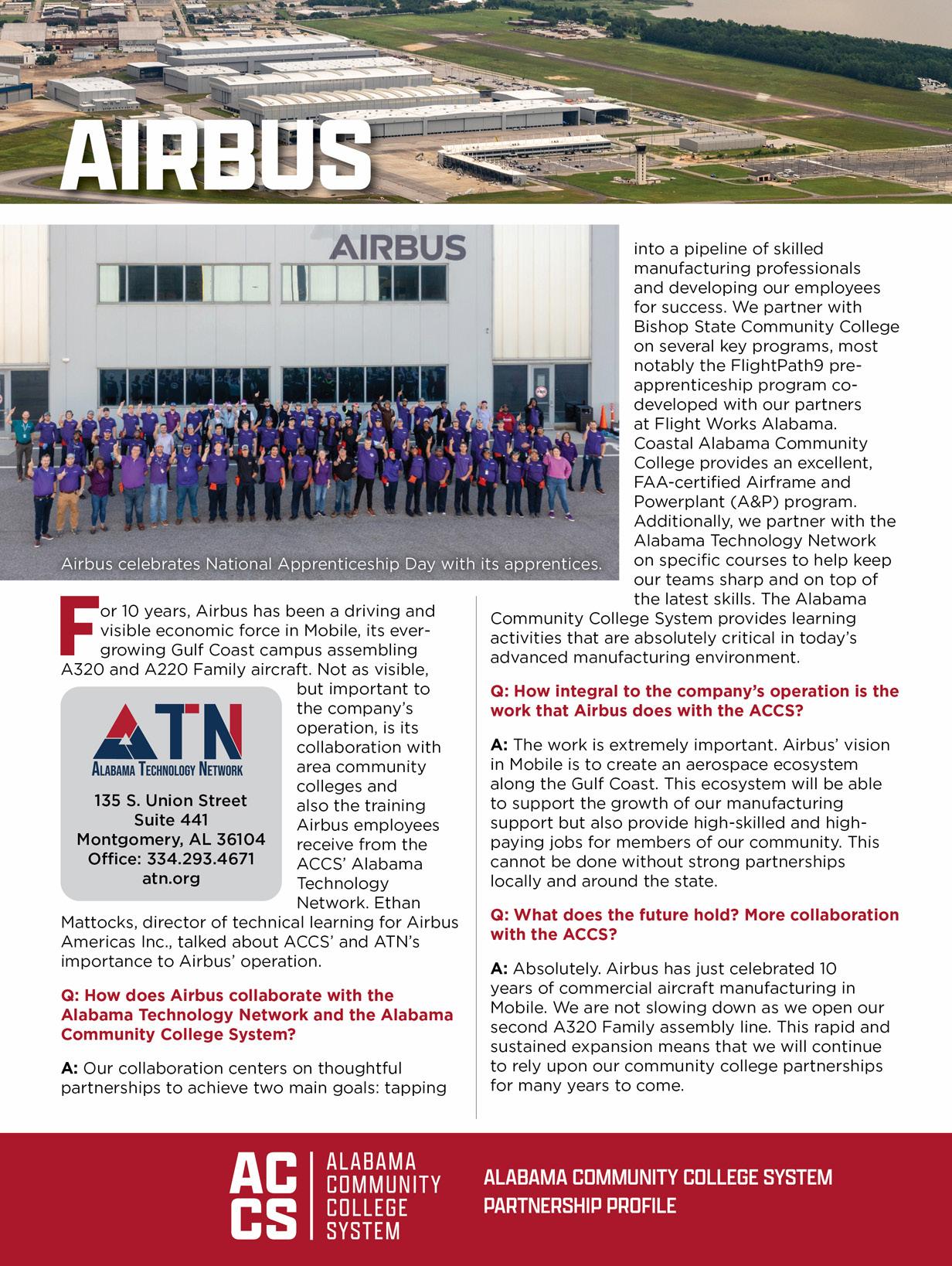



By NANCY RANDALL
The Great Recession of late 2007 to June 2009 was a harbinger for U.S. colleges and universities.
Enrollment declines were going to happen now, the present day, went the predictions.
Alabama’s higher education institutions have taken significant steps to thwart this dire forecast. Using unique recruitment approaches, tapping into workforce needs and adding new campus amenities, the state’s universities have increased enrollment numbers.
Samford just marked its 17th consecutive year of enrollment growth, according to Samford President Beck Taylor. “For private higher education, [that] is almost unheard of to have a streak that long,” he says. Enrollment has risen by nearly 36% since 2009, according to a September post on Samford’s website.
In its strategic plan, the school has budgeted for about a 3% enrollment rise year over year, Taylor explains. To support that increase and prepare for the “enrollment cliff,” Samford has targeted its recruitment efforts on Atlanta, Nashville, central Florida and Texas, especially Dallas.
“These are areas where we’ve focused our attention with a lot of success. And those are also areas that are predicted to not see as big a decline in college-going populations,” Taylor says.
Overall, the South is expected to be somewhat shielded from that decline, while the Northeast and Midwest are predicted to be “hard hit,” Taylor notes.
Out-of-state first-year students make up about 75% of Samford’s 2025 enrollment, says Taylor, and 44 states are currently represented.
Per Samford’s website, the university’s more than 92% freshmen-to-sophomore
retention rate far exceeds the national 68% retention average, according to National Student Clearinghouse data. Samford’s strong student retention rates are somewhat tied to a “relational educational approach” that faculty and staff have with students, Taylor explains.
He also gives kudos to Samford’s admissions team for listening closely to students’ demands. To that end, the university has spent more than $300 million on campus amenities the past two years, Taylor says. These include student housing, a new rec center and new dining areas. “All of these are amenities that meet current student demand but also really set us up well for students of the future.”
Beyond its targeted recruitment and new amenities, Taylor says that the most important factor in Samford’s current and future success is keeping true to its identity and mission.
“Clearly articulating that mission in
A rendering of the

a way that resonates with students and families is really important to us,” Taylor says. “Central to that is our commitment to a Christ-centered higher educational experience, and that Christian mission remains authentic, hasn’t softened in any way.”
Athletic team buses began “morphing” into recruitment buses at South, as it’s known, in 2022. When the buses aren’t ferrying athletic teams to events, they transport high-school students to South’s campus during Jag Days, explains Andi Kent, executive vice president and provost at South. These recruitment events started as part of a larger plan to grow the undergraduate population.
For Jag Days, Kent and a member of the enrollment services team take the bus in the mornings to high schools within about a 90-mile radius of the university. The students load up for a day trip to the campus. They get a taste of the school’s academic programs, from health care to business and engineering, Kent says.
“We really believe it’s made a big difference. A lot of the students that we bring have never stepped foot on a college campus before. It opens their eyes as to what may be possible for them,” she notes.
Jag Days, additional recruiting efforts in- and out-of-state, and hiring a new associate vice president of enrollment ser-
vices were all strategies to boost declining undergraduate enrollment, Kent says. In 2016, South reached a high of about 16,500 students. From then until 2022, the school saw a gradual decline to roughly 13,500 undergrads, she notes.
“We knew that we had to do something, we knew about the cliff. Of course, COVID didn’t help things. But even a few years before COVID, we were going in the wrong direction,” Kent says.
Today, it appears that the school’s recruiting efforts have paid off. According to a Sept. 5 post on South’s website, a total of 14,285 students enrolled for fall, a jump from 14,003 the prior year. An uptick in undergraduate enrollment helped boost the total, with 2,137 new first-year
students.
South also is working to serve different populations and beef up programs and amenities, Kent notes, including:
• New office of military services: Started last fall, the office will work to attract active military and their families, along with other militaryaffiliated prospects.
• Growing graduate programs: A new doctorate program in environmental sciences started last year, and a new nurse anesthetist program is under development.
• New Jaguar marching band practice facility: Opening in January, the space will enable South to grow the current 280-member band to 350 students.
“I think the state of Alabama will see its initial decline in graduating [high school] seniors in 2026 [enrolling in college],” says Julie Taylor on the predicted university enrollment decline. UNA, says the assistant vice president for enrollment management, has been preparing for the slide like other Alabama universities.
One step in UNA’s strategy has been to diversify its student population over the past five years. “Our initial traditional freshman class is still very important to us,” Taylor explains. “But we’ve also looked at different populations of students that we needed to focus on.” That
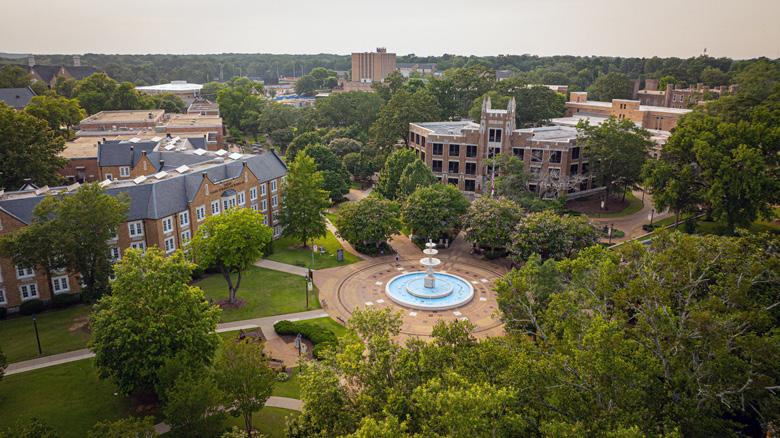


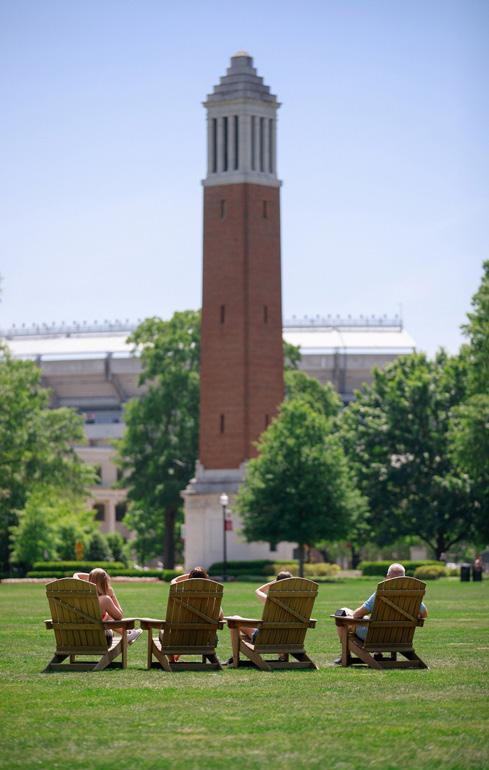
includes graduate students, transfer students and dual enrollment or early college students, she says.
Taylor has emphasized to UNA staff that it’s also important to be responsive to all students’ communication needs or wants (i.e., messages) and their preferred channels. “We’ve really tried to be agile and quick. We know that this day and age of students, they’re the Amazon generation, and they want to hear from us quickly,” she notes.
Decreasing paperwork and other barriers to students’ access to college also has been a goal.
UNA’s agile focus also has brought new programs the past five years and currently, some of which grew out of COVID and some out of regional workforce needs, Taylor explains. Those include respiratory care, occupational therapy assistant (launching in spring 2026) and a Doctor of Nursing Practice. Accreditation for the
full occupational therapy program is underway, says Michelle Eubanks, UNA spokesperson.
UA set another enrollment record this year, welcoming 42,360 students for fall 2025, a 3.7% increase and a more than 4% increase of in-state students, according to a UA spokesperson. Students represented all 50 states and 99 countries.
Nursing student enrollment is up 15%, and the College of Community Health Sciences saw a 10.8% increase, according to a post on UA’s website. The post also reported that UA enrollment in the graduate school was more than 6,200, another new record.
UAB recorded its largest freshman class in history this fall, with more than 2,500 freshmen estimated this semester, says a UAB spokesperson. UAB’s largest freshman class before this year was 2,415 in 2021.
“We are encouraged by the early data showing a strong increase in freshman enrollment,” says UAB President Ray L. Watts. “This growth reflects the excellence of our faculty and the transformative opportunities our students have inside and outside of the classroom, as well as our Success Initiative led by Provost Janet Woodruff-Borden and Vice President for Student Affairs John Jones.
“By aligning our academic, advising and student support services from initial interest through graduation, the initiative is creating a more seamless and empow-
ering experience for our students. It’s a testament to UAB’s commitment to student success,” Watts says.
Among new programs offered is a bachelor’s degree in eSports performance management and coaching, a first for the state, according to a July post on UAB’s website. ESports is where traditional sports meet video gaming. The program will teach students how to create training programs, among other things.
UAH has consistently maintained strong enrollment in recent years. For fall 2025, UAH welcomed 1,220 new freshmen, the second consecutive year of growth in first-year enrollment, says a UAH spokesperson.
UAH also continues to attract master’s and doctoral students, particularly in high-demand fields such as engineering, business and the sciences. Earlier this year, the university launched Charger EDGE (Educational Discount for

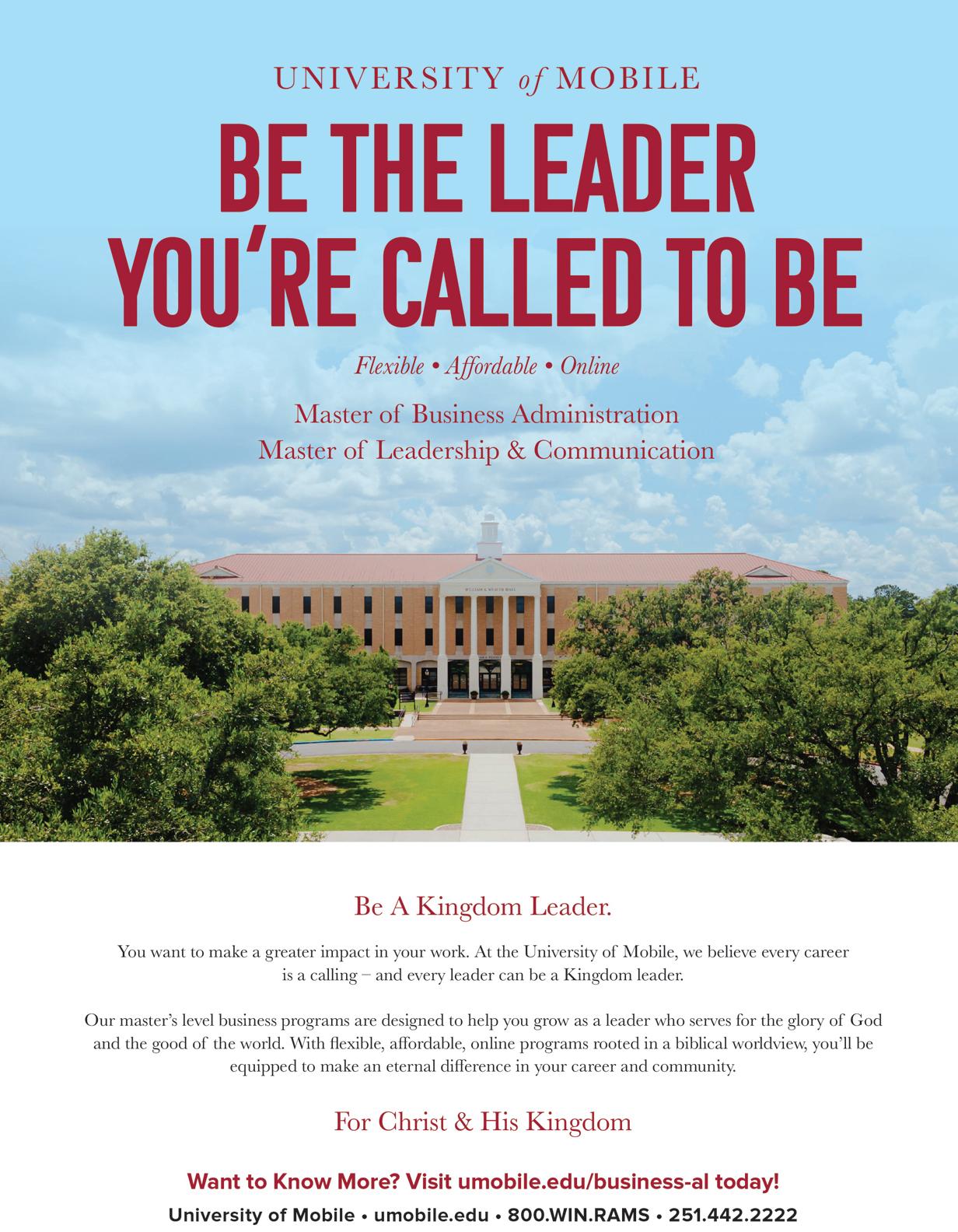
Graduate Excellence), a new program offering a 25% tuition discount for master’s degrees and graduate certificates. This initiative has contributed to sustained growth in graduate enrollment, the spokesperson says.
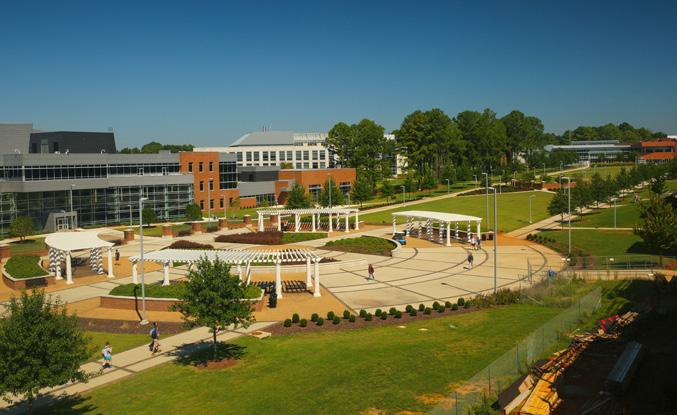
By Nancy Randall
College majors related to health care, engineering, business and marine sciences are top choices for students across Alabama’s universities.
While students still choose majors based on their personal affinities and aptitudes, experts say, finding a job post-graduation is equally important. At the same time, Alabama’s colleges and universities are responding to the state’s workforce needs by adding new programs.
At the University of North Alabama in Florence, listening to state legislators in Montgomery is key to staying on top of future workforce needs, says Julie Taylor, assistant vice president for enrollment management.
“They are helping inform these decisions, knowing [that] this [particular] company is looking at this part of the state [and saying], ‘We could sure use these kinds of employees to help fill these roles,’” Taylor explains.
With UNA’s proximity to Huntsville and the relocation of the U.S. Space Command headquarters from Colorado to the Rocket City in 2026, STEM programs like physics, math and engineering will be vital to its success, Taylor notes.
Responding to the region’s workforce needs, UNA recently added an engineering program, according to Taylor. Now in its second year, the Bachelor of Engineering offers concentrations in biological, chemical, manufacturing and power generation engineering, along with engineering management. Power generation was added based on feedback from the Tennessee Valley Authority, Taylor says.
UNA’s STEM programs have become more popular in the last five to 10 years, she notes. These fall under the College of Arts, Sciences and Engineering, which awarded 740 total degrees in 2022-2023, the largest number of UNA’s four colleges, according to institutional data on UNA’s website.
At 720 degrees awarded in the same period, the Sanders College of Business and Technology came in a close second.
It’s home to UNA’s MBA program, which Taylor says is the largest in the state for more than five years running.
“We’re agile in our ability to respond [to workforce needs] because they don’t have time to wait for us to stand up a program for 10 years. They need us to have [these programs] and these graduates ready to roll,” explains Michelle Eubanks, UNA spokesperson. “We feel like that’s our responsibility to ensure they are successful. And, in turn, it helps us be successful as well.”
Like UNA, the University of South Alabama in Mobile is seeing growth in STEM-related majors, according to Andi Kent, executive vice president and provost at South.
Engineering undergraduate enrollment increased 11% last year and another 9% this year, Kent says.
An aerospace engineering program began a year ago at South in answer to Mobile’s workforce needs. Airbus noted that in addition to mechanical engineers, aerospace engineers are needed at the commercial aircraft manufacturer’s Mobile plant, Kent explains.
The school of marine and environmental sciences, marking its fourth year, is another growth area for South, Kent notes. “Four years ago, we had zero undergraduate students. Today, we have about 233 undergraduate students and about 100 more graduate students, making it one of the largest and fastest growing in the country,” she says.
Of course, with South’s ownership of USA Health, an academic health system with three hospitals and the Mitchell Cancer Institute, it’s no surprise that 45% of South’s students major in a health care area. “We have the largest college of nursing in the state. Most people don’t know that,” Kent says.
And with construction of the new Whiddon College of Medicine building – expected to open in January 2027, per Kent – South will further cement its reputation for health care studies. The facility will enable South to expand the class size of first-year medical students from 80 to 100 and potentially 125, according to a September post on South’s website.


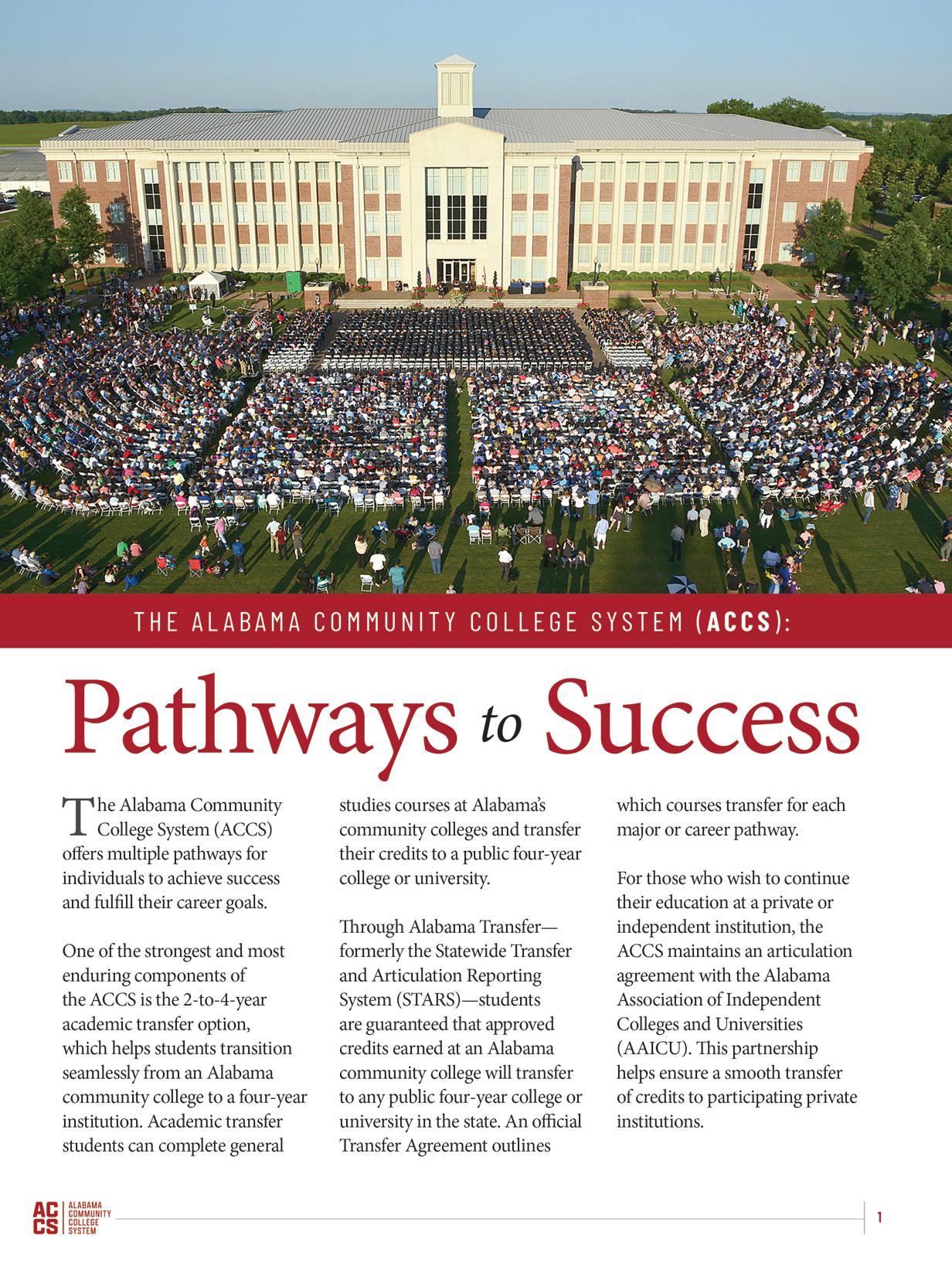
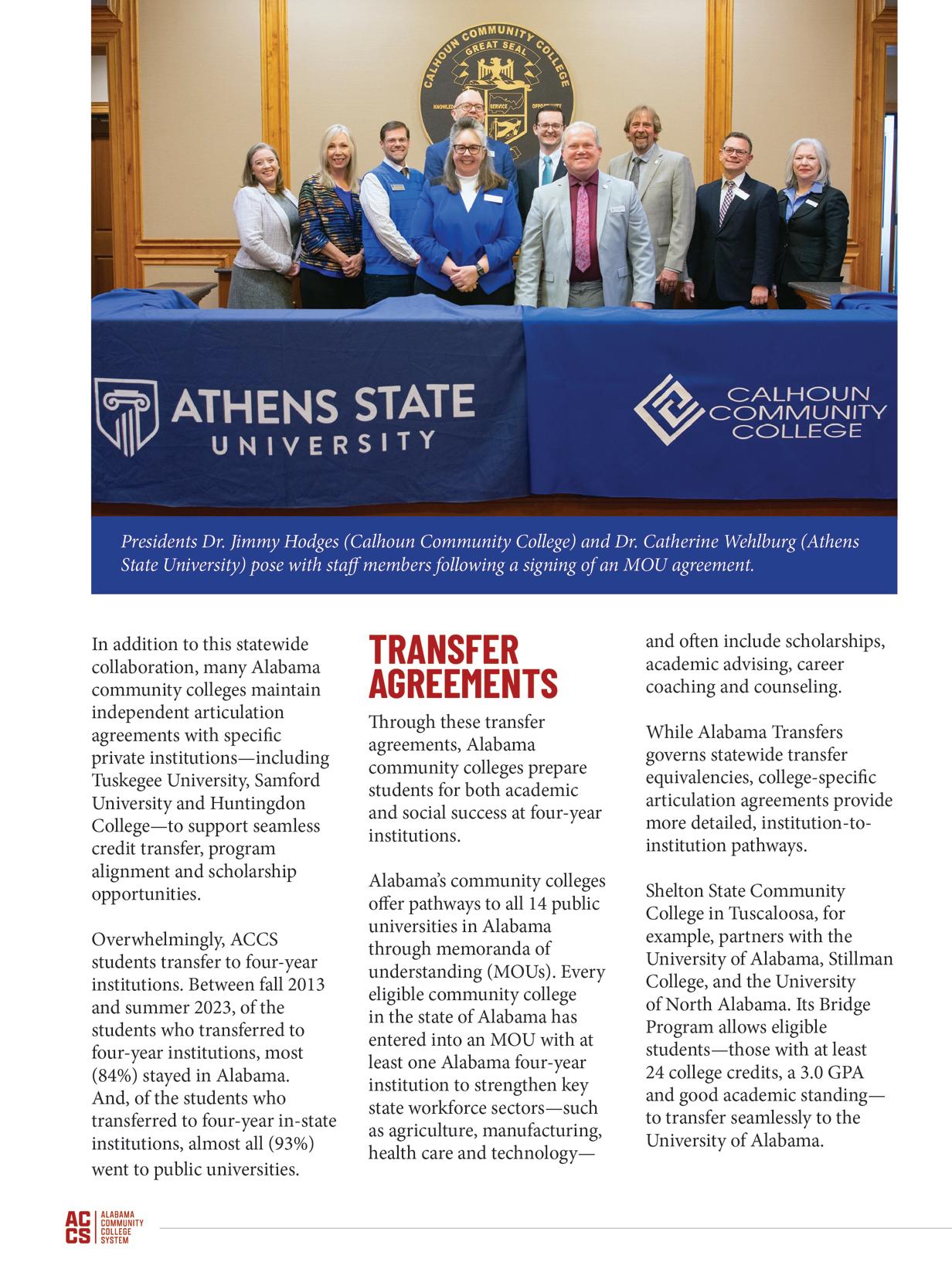
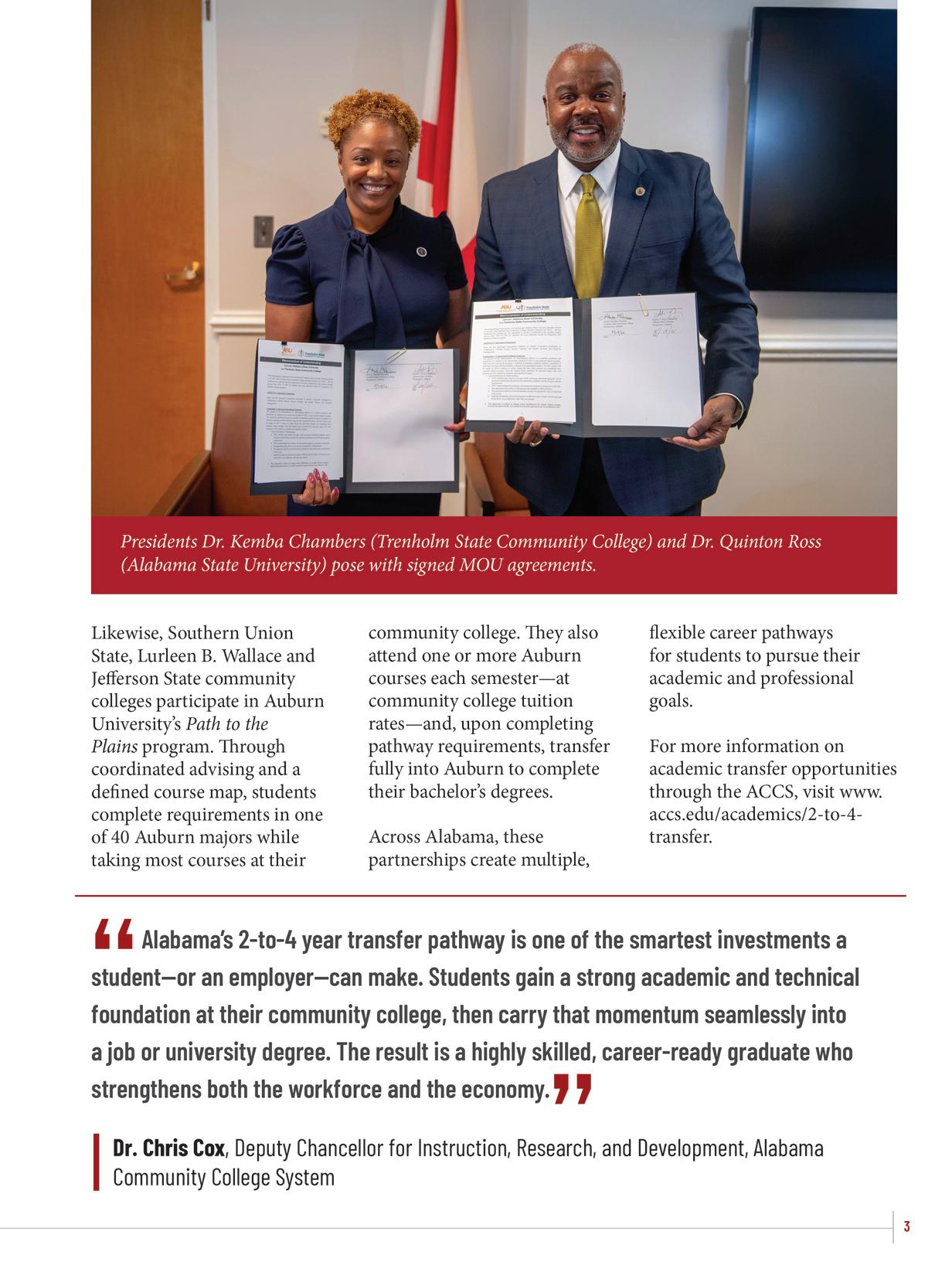
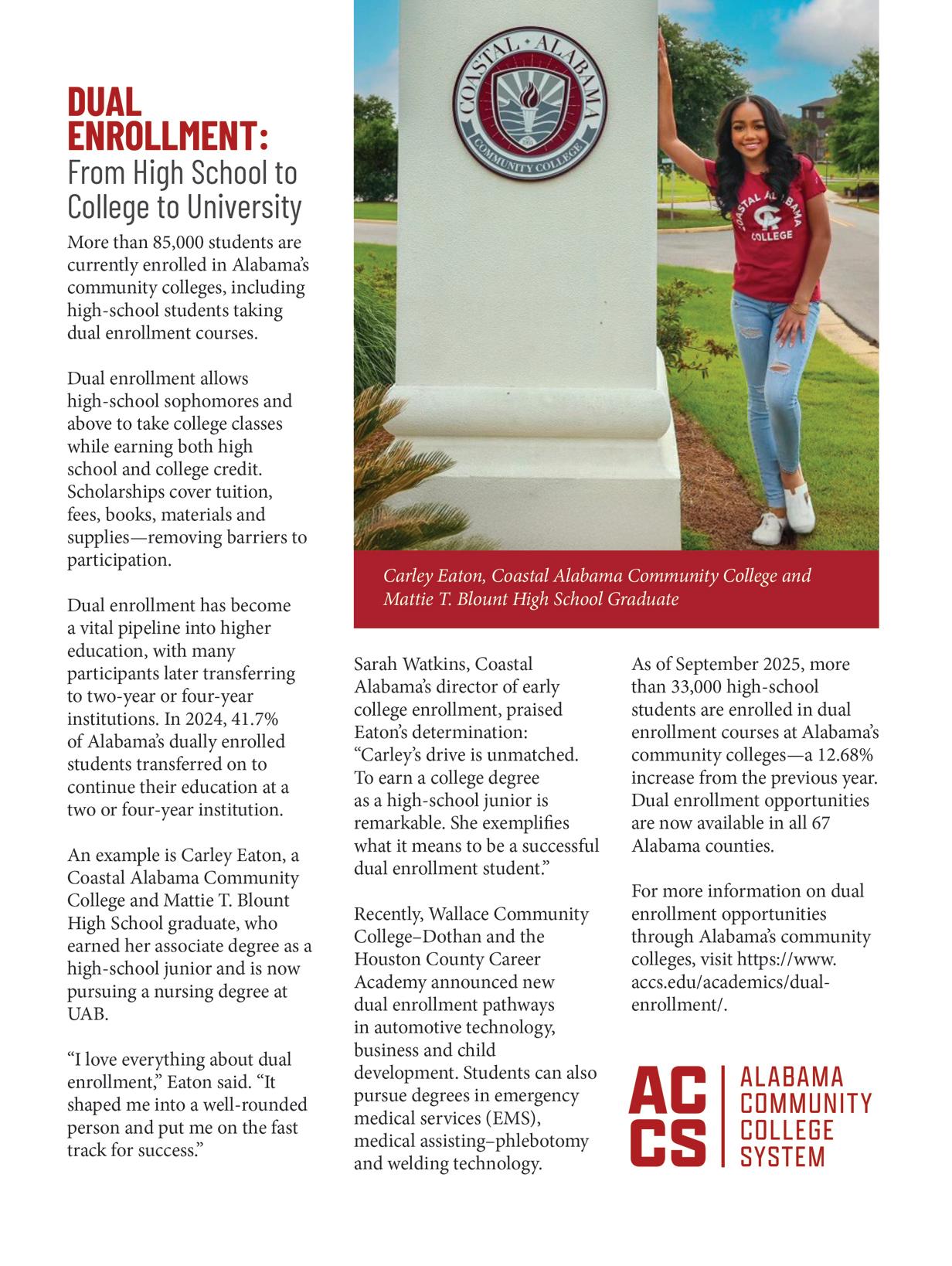

Just a few years away from its bicentennial, Spring Hill College is undergoing a transformation and a culture change
By AMELIA ROSE ZIMLICH
Photos by MIKE KITTRELL
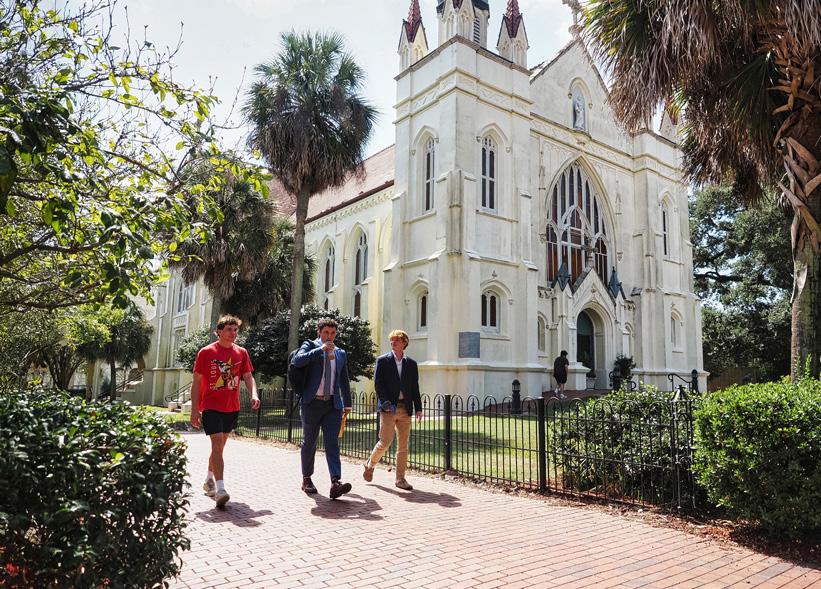


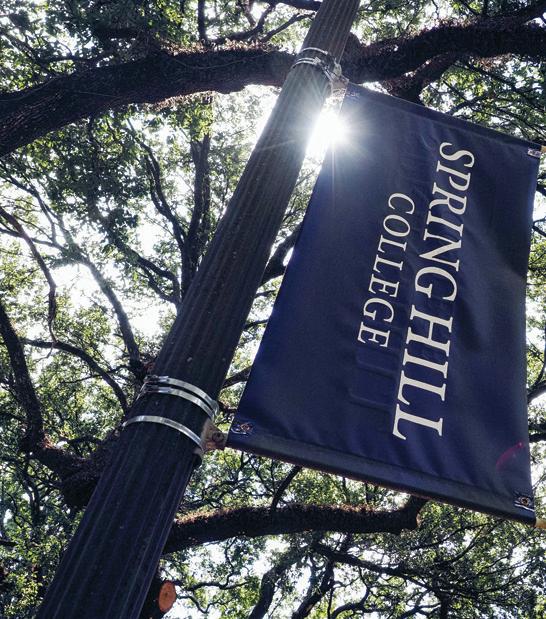
In Mobile, where idyllic oak trees sway and history abound, sits Alabama’s oldest college. Spring Hill College was established in 1830 by Bishop Michael Portier, Mobile’s first Catholic bishop. It holds several other distinctions in higher education. It is the first Catholic college in the Southeast, the 3rd-oldest Jesuit college and the 5th-oldest Catholic college in the United States.
“Throughout Spring Hill College’s history, we have constantly evolved,” says Spring Hill College President Mary Van Brunt. “Spring Hill has always been a trendsetter.”
The college has indeed championed changes before they became mainstream, from being the first and only integrated college in the Deep South for a decade beginning in the 1950s to its student center being the first green building of its size in Mobile when it broke ground in 2009.
Today, Spring Hill looks again to evolution to address new challenges. An ever-changing enrollment and financial landscape create hurdles for the historic college in the modern day.
“The number of students graduating is reducing across the country,” says Van Brunt. “Some rhetoric now asks, ‘What’s the value of a college education?’ You have

to be innovative and creative to battle those problems.”
Known for its beautiful campus and Jesuit education, the private college has a small student body and a 13:1 studentteacher ratio. Before Van Brunt became president in 2023, the college tried several strategies to increase enrollment and finances, including cutting tuition in half from $42,000 in 2020 to $21,100 in the fall of 2021. Last year’s tuition totaled $23,504. Price resets are common practice in higher education, Van Brunt explains. “Colleges have a high sticker price and then give big scholarships,” says Van Brunt. “Tuition may be $50,000, but they give $30,000 in scholarships, so it really only costs $20,000.” To attract more students, some colleges list the net price instead of the inflated version. While logical in theory, one factor has an unexpected impact. “You’re fighting now against people perceiving that your value has changed when it hasn’t,” says Van Brunt. “I don’t know many colleges that are successful with the price reset, given other colleges’ high sticker price.”
Regardless of trial and error, Van Brunt says that change is inevitable in today’s higher education world. The college is continuously monitoring how to offer the
most effective programs, attract students and maintain its impact in south Alabama.
“What we have at Spring Hill is a sense of urgency to face these challenges,” says Van Brunt. “It’s a little bit of a culture change.” One of the biggest enrollment changes at Spring Hill over the past few years has been an increase in retention of first-year students. Spring Hill College Provost and Chief Academic Officer
Rebecca Cantor credits a large part of this to the college’s $2.2 million Title III grant, efforts by faculty and staff and increased support of commuter students. “Our yearover-year retention rate has gone up by 8% in just two years,” Cantor says.
The culture change continues in Spring Hill’s academic programs. In February, Spring Hill College cut six majors: chemistry, biochemistry, history, philosophy, secondary education and studio art. With just 33 students enrolled in those programs, under-enrollment was the ultimate decision-maker. “It reflected a change in what students are looking for and the workforce now demands,” says Van Brunt. “It wasn’t easy to do, but it gave us the funding to refocus on programs that are in demand.”
Spring Hill College invested in developing and introducing new majors that

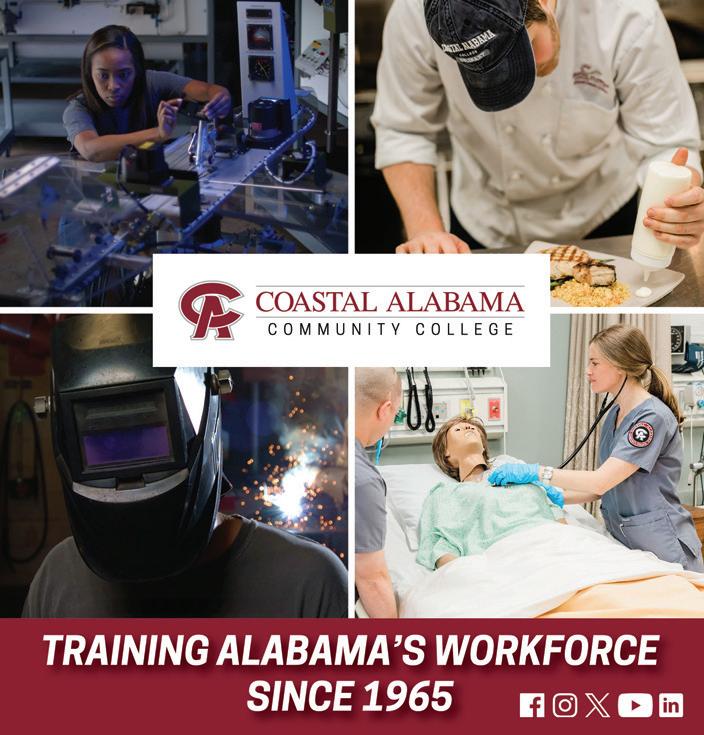
reflect a changing world. Of those majors, AI and data science, strategic communication, and digital communication and social influence launched this fall; an exercise science major will follow next fall. “Some students who started this fall are interested in these programs and others who were already taking classes want to switch to them,” says Van Brunt. “We expect to have more interest next fall as we really recruit and market them.”
Partnerships are a new avenue Spring Hill is exploring. Smaller institutions often cannot afford to offer a wide range of classes to a small student body. Partnerships let schools expand their offerings together. Spring Hill recently reached an agreement with Rockhurst University in Kansas City, another Jesuit college, that Cantor refers to as “a win-win partnership.”
Students across both colleges can take online classes from each institution. The move helps Spring Hill financially, allowing the college to be more strategic about what classes it offers and giving its students a broader curriculum. “The classes fill more, creating a more robust learning experience,” says Van Brunt. “It’s an alliance that asks, ‘How can we be better together?’” The partnership offers Spring Hill students a path to enroll in Rockhurst’s master’s and doctoral programs, and Rockhurst University students have access to Spring Hill College’s Italy Center in Bologna.
Spring Hill College’s latest investment in its medical students comes in the form of a new partnership with Kansas City University. A select number of Spring Hill students will experience Kansas City University’s osteopathic medicine school and dental program. “Osteopathic medicine is the care of the whole person, which fits perfectly into our Jesuit mission, the care of the whole person,” says Van Brunt. She says 100% of Spring Hill’s pre-med students are accepted into medical school. This new agreement will help Spring Hill attract undergraduate students with a direct path to medical or dental school.
The medical students at Spring Hill College have something new to look forward to on campus. The Annette N. Shelby Health and Science Innovation Center had its groundbreaking this summer. The
building will house the college’s science, health sciences and nursing programs, giving students state-of-the-art equipment and technology — such as digital cadavers, high-tech labs and collaborative classrooms — to further their education.
Renderings show a modern building with classic architectural elements echoed across Spring Hill’s campus, combining history with a glimpse into the future.
Van Brunt says the 57,000-square-foot center, slated to open in the spring of 2027, is a transformational investment in Spring Hill’s future, helping fill workforce demand and address shortages in the health care field. “This enables us to form the health care leadership right on the Gulf Coast,” she says.
‘‘
We believe in the power of connection to our community. We are very proud that so many of the incredible nurses, judges, doctors, teachers and leaders on the coast are Spring Hill College grads.”
— REBECCA CANTOR, SPRING HILL COLLEGE
Just five years away from the college’s bicentennial, Spring Hill leadership is optimistic about the future. “We believe in the power of connection to our community,” says Cantor. “We are very proud that so many of the incredible nurses, judges, doctors, teachers and leaders on the coast are Spring Hill College grads.” With $13 million raised over just the past two years, the foundation is being laid for Spring Hill’s future history. “We’ve engaged our alumni and improved our
donor recruitment,” says Van Brunt.
“That goes to scholarships, goes to academic innovation, like these partnerships, and it goes to growth on campus.”
Change, Van Brunt says, is an element of Spring Hill’s past and key to its future.
“You have to find a way to pivot and ask, ‘What now?’” says Van Brunt. “The legacy of Jesuit Catholic education is not just our
past; it’s our foundation and who we are. We’ve been doing it for almost 200 years, so we’re excited about the outlook and the changes and where we’re going to end up.”
Amelia Rose Zimlich is a staff writer for Mobile Bay magazine and a special contributor to Business Alabama. Mike Kittrell is a Mobilebased freelance contributor.
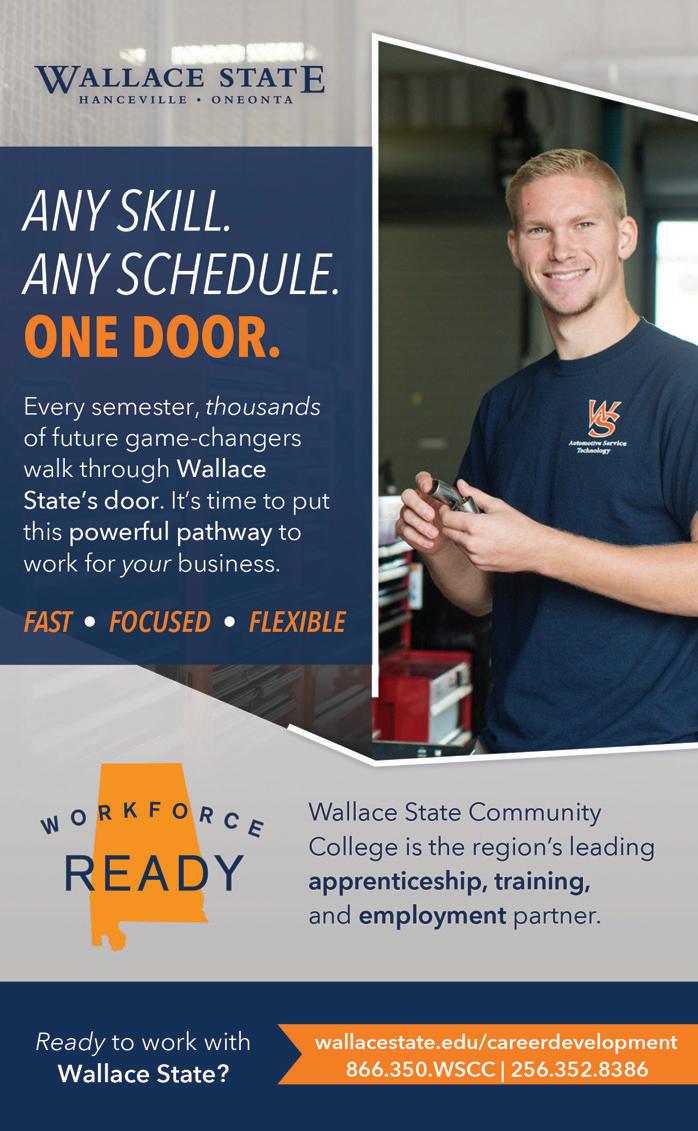
1
4
9
10


ne of the highest honors a person can receive is to be recognized by their peers for a job well done. Business Alabama’s Exceptional Educators section allows those within the education sector to do just that — nominate a peer who excels at their job, whether that is in the classroom or in an administrative role.
A Chinese proverb states: If you are planning for a year, sow rice; if you are planning for a decade, plant trees; if you are planning for a lifetime, educate people. Our honorees exemplify this proverb, dedicating their lives to helping students achieve success. The following are this year’s Exceptional Educators:

Justin Burnett serves as the department head of machine tool technology/CNC at Wallace State Community College. A Wallace State graduate, Burnett spent four years in the machining industry before transitioning into education. Now in his sixth year of teaching, Burnett is passionate about strengthening connections between industry and education. Under his leadership, the machine tool technology program continues to expand in multi-axis machining, automation and metal printing, serving as a HAAS Operator Certification Center, NASA HUNCH partner and a National Institute for Metalworking Skills-accredited program. Burnett holds an A.A.S. in machine tool technology, a bachelor’s degree in post-secondary technical education, and a master’s in career technical educationleadership from Athens State University.
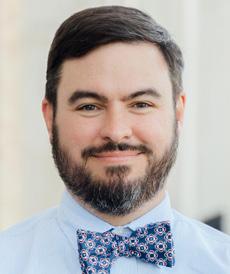
Matthew Downs, Ph.D., has led the College of Arts & Sciences at the University of Mobile since 2020. During his tenure, he has created the graduate programs in history, English, humanities and creative practices, as well as integrated five-year Bachelor of Science/Master of Science degree in counseling and family therapy. A published historian, Downs is the recipient of the James F. Sulzby Book Award from the Alabama Historical Society for “Transforming the South.” He has served as president of the Alabama Historical Association, editor of the Alabama Review, board chairman for the Alabama Men’s Hall of Fame and is a member of the operating board of the Historic Blakely State Park Authority. He has a bachelor’s degree from BirminghamSouthern College and earned his master’s and Ph.D. from the University of Alabama.
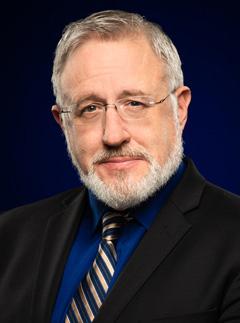
Joseph Scott Morgan, M.F.S., F-ABMDI, is the Distinguished Scholar of Applied Forensics and an associate professor who leads Jax State’s applied forensics program with immersive, case-driven instruction. He teaches students how to examine the dead—and what the dead reveal— through crime scene recreations informed by real-world cases. In Fall 2025, Jax State opened a cadaver lab, Alabama’s only undergraduate facility using cadavers for instruction. Morgan is regarded as one of the nation’s leading experts on the coroner system and made more than 200 media appearances last year, consistently promoting his work and the opportunities available to students in Jax State’s applied forensics program.

Linda North is dean of academics at Southern Union State Community College, where she affects more than 3,500 students each year. As chief instructional and academic officer, North guides the college’s largest division, which includes academic programs, adult education, distance learning and career and technical education. She uses her passion for continuous improvement and innovation to ensure Southern Union remains a place where students thrive. North earned her bachelor’s degree from Troy State University, a master’s from the University of Alabama at Birmingham, an Ed.S. at Troy State University at Montgomery and a Ph.D. at the University of Alabama.
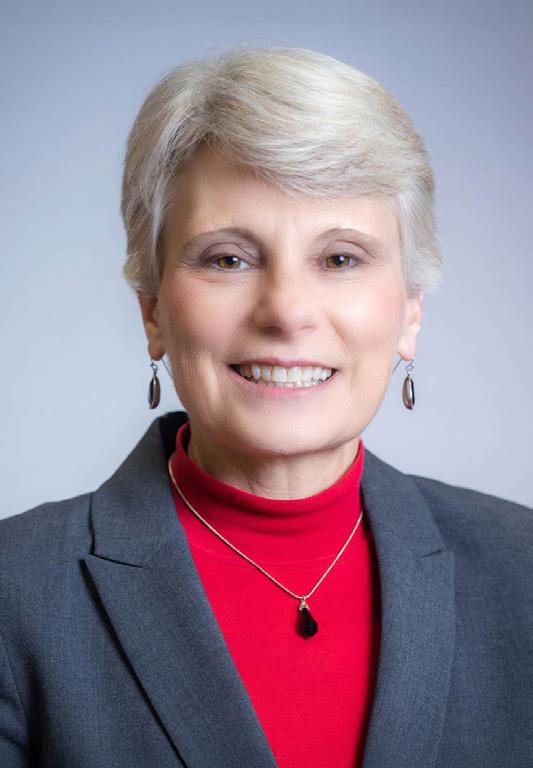
Kathy L. Murphy, Ph.D., was appointed president of Wallace Community College-Dothan in June. She previously served as president at Gadsden State Community College and as superintendent of Hoover City Schools and Monroe County Schools. A Troy University Alumni of the Year, she holds advanced degree from Auburn University and Auburn University at Montgomery. She was the first female member and chair of the National Beta Club board of directors and is a member of Leadership Alabama Class XXXIV.
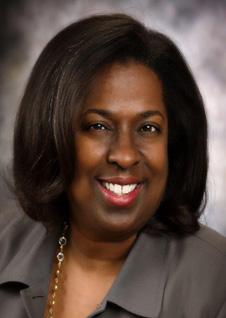
Susan Price is senior deputy chancellor and chief of staff for the Alabama Community College System, lending her vision and leadership to advancing education statewide. In this role, she partners with the chancellor to strengthen Alabama’s 24 community and technical colleges, aligning programs with workforce and economic needs. A steadfast advocate for student success, Price is celebrated for her commitment to expanding access, fostering innovation and transforming communities through the power of education. She is a graduate of Princeton University and earned a law degree from the University of Virginia.
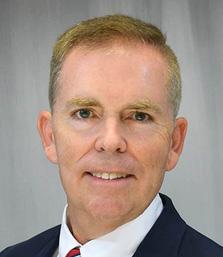
Alan Smith is president of Gadsden State Community College, which is celebrating its centennial year. With extensive experience in workforce development, capital projects and community relations, Smith has guided transformative investments in career and technical education while strengthening partnerships with schools, businesses and industry. His commitment to student success and regional growth reflects his understanding of how education fuels opportunity. Under his leadership, Gadsden State has continued to expand programs that prepare students for high-demand careers, drive economic development and uphold a century-long legacy of service and innovation. Smith holds degrees in agricultural business and economics and education from Auburn University and a master’s in educational leadership from the University of Alabama.
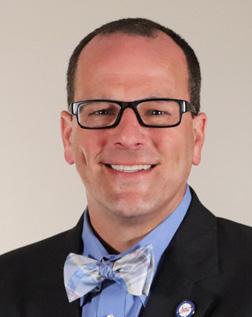
William V. “Butch” Young, Ph.D., is dean of instruction at J.F. Ingram State Technical College. His career has been marked by leadership, innovation and dedication to student success. With advanced degrees from the University of Alabama, Young began his career as a high school teacher, advancing to serve as principal before transitioning to higher and correctional education. His tenure includes leadership roles in federal correctional education and as department chair at Jacksonville State University. In his current role as dean of instruction at J.F. Ingram State Technical College, Young continues to transform lives by expanding educational access and workforce training across Alabama’s correctional facilities.
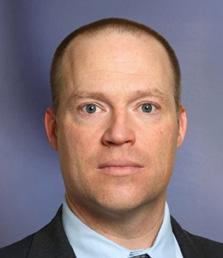
Michael “Myke” Whittington, Ph.D., teaches criminal justice and homeland security in the College of Safety and Emergency Services at Columbia Southern University, based in Orange Beach. Whittington draws upon his experience as a supervising criminal investigator in a district attorney’s office in California, and as a police detective at the San Jose Police Department. In California, Whittington created the state’s first Worker Exploitation Task Force. He is a graduate of the FBI National Academy and the California POST Command College. He holds a doctorate in criminal justice and homeland security from Liberty University. Whittington has taught at CSU for the past four years and is one of the winners of the 2025 Robert G. Mayes Sr. Faculty of the Year award.


Birdon is investing more than $27 million to transform the Bayou
site into a Tier 2 shipyard.
Shipbuilder to deliver 27 WCC vessels to the U.S. Coast Guard over the next 10 years, bringing hundreds of jobs to the region
By KATHLEEN FARRELL —

KITTRELL

In 2023, Australian Shipbuilder Birdon expanded its American operation, acquiring a 32-acre shipyard in Bayou La Batre from Metal Shark Boats. The facility’s existing infrastructure and proximity to the Gulf made it an ideal location to build and deliver a fleet of 27 new Waterways Commerce Cutters (WCC) for the U.S. Coast Guard (USCG). Birdon was awarded a $1.187 billion contract to design and construct the vessels in 2022.
The shipyard, which belonged to Horizon Shipbuilding before it was taken over by Metal Shark Boats, already featured more than 1,700 feet of waterfront, a 660-ton Travelift and multiple cranes, as well as five steel buildings for fabrication and construction.
“The site allows for in-house construction of both hull and superstructure, reducing technical risk and improving schedule control,” says Sandra Armstrong, Birdon’s director of communication and external relations.
In preparation for construction, Birdon made early investments in engineering and design, working to procure long-lead time materials by collaborating with carefully chosen U.S. subcontractors. Birdon has committed to more than $27 million in capital improvements to transform the Bayou La Batre site into a Tier 2 shipyard that can build up to six vessels simultaneously. The shipyard has received an updated USCG certification to handle vessels up to 589 long tons, expanding its operational capabilities.
The new WCC vessels will replace the USCG’s aging inland fleet. These vessels support the USCG as it maintains and pro-
tects the U.S.’ intra-coastal and inland Marine Transportation System (MTS). The MTS spreads across the 12,000 miles of commercially active inland waterways including the Mississippi River, the Great Lakes, the Columbia-Snake River system, and the Gulf and Atlantic intercoastal waterway.
Each year, 630 million tons of cargo move through these waterways, accounting for more than $5.4 trillion in economic activity and supporting 30.7 million jobs for the U.S. economy. WCCs establish and maintain more than 28,200 aids to navigation (ATON) that help ensure the safe and efficient flow of maritime commerce.
Additional WCC missions include search and rescue, marine safety, marine environmental protection and security of ports, waterways and coasts.
The WCC contract includes 16 river buoy tenders (WLR) and 11 inland construction tenders (WLIC) — two separate but related vessel designs.
Designed for dynamic river conditions, the 180-foot-long WLR is used to set, relocate and recover buoys on rivers. The WLIC measures 160 feet in length and is equipped to construct, repair and maintain fixed ATON, such as beacons. The only USCG platform capable of pile driving, the WLIC can erect towers and perform major structural repairs. Each vessel accommodates a crew of 17 and has an endurance of 11 days.
“Many of the current inland waterway’s fleet are more than 50 years old and are increasingly difficult and expensive to maintain,” says Armstrong. “The new WCCs will greatly enhance the Coast Guard’s ability to perform their MTS missions.”
Birdon’s WCC program incorporates 3D modeling and integrated logistics support systems to streamline design, maintenance and lifecycle management. In alignment with the USCG’s sustainability goals, the vessels are designed with fuel-efficient propulsion systems and reduced emissions.
“Birdon is using modular construction techniques to improve efficiency, quality control and scalability,” says Armstrong. “This approach allows different sections of the vessel to be built simultaneously and then assembled, reducing build time.”
All construction work on the WCC vessels will take place in Alabama.
In July 2023, Birdon announced that 98% of its suppliers are U.S. companies, and 70% of the contract will be performed by small businesses. Many of these smaller companies are located on the Gulf Coast.
“We are thrilled to be working with local subcontractors such as Kern Martin in Coden, Alabama; Hiller Systems in Mobile, Alabama; Techcrane International in Covington, Louisiana; Beier
Integrated Systems in Gray, Louisiana; and LeBlanc & Associates, based in Houma, Louisiana, with an office in Bayou La Batre,” Armstrong says.
Birdon employs more than 100 people in Bayou La Batre, and the company plans to create several hundred additional jobs over the next three years as part of its expansion.
“Birdon has made workforce development and community engagement central to its operation in Bayou La Batre, particularly through its Birdon Futures Apprenticeship Program and partnerships with local institutions,” says Armstrong. Developed entirely in-house, the two-year apprenticeship program is designed to prepare participants for successful long-term careers within the industry. Participants are paid and can earn National Center for Construction Education and Research (NCCER) certification.
This fall, Birdon was reviewing applications to select 10 local apprentices to receive hands-on career training and practical instruction in shipfitting, welding and fabrications from experienced mentors. Birdon also collaborates with community colleges and high schools to encourage the next generation of skilled workers.
“Birdon continues to invest in innovation, talent development and strategic partnerships to support its mission of delivering whole-of-life solutions across its industries,” says Armstrong.
Birdon was founded in Port Macquarie, New South Wales,

Australia, in 1977 as a family-owned business. Over the years, the company has grown into a diversified global group serving the maritime, military and resource sectors with operations in Australia, the U.S., Europe and Asia.
Since entering the U.S. market in 2009, Denver, Coloradoheadquartered Birdon America Inc. has partnered with U.S. government agencies, including the Department of Defense and the Department of Homeland Security. In the U.S., the


company operates through four main business divisions: Marine Shipbuilding and Repair, Disposals, Engineering and Marine Propulsion. Birdon is currently delivering major projects for the Army and Navy, in addition to the USCG.
Birdon’s U.S. operations are led by President Tony Ardito, an experienced maritime industry professional who held previous roles at BAE Systems and Austal USA. Ardito is the executive in charge of the WCC program. Director of Programs/General Manager Hoby Swiney oversees day-to-day operations in Bayou La Batre, including shipbuilding, workforce management and operations. Armstrong leads Birdon’s community engagement, public affairs, and strategic partnership efforts in the U.S. She works to build relationships with local institutions, promotes workforce development initiatives and leads U.S. government relations initiatives.
In June, Birdon began work on the first WCC. “Our entire team is thrilled to be entering this next phase of the WCC program with the start of construction,” Ardito says.
Capital investments currently underway at the shipyard include a 56,400-square-foot steel processing and fabrication facility, a 10,945-square-foot blast and paint facility, and two 19,320-square-foot final assembly buildings. Birdon plans to construct the 27 WCC vessels within a 10-year period, generating a significant economic impact for Bayou La Batre and reinforcing the region’s role in the maritime industry for years to come.
Kathleen Farrell and Mike Kittrell are Mobile-based freelance contributors to Business Alabama.

By KATHLEEN FARRELL — Photos by MIKE KITTRELL

Cookies and cream, blue raspberry, key lime pie, dark chocolate-dipped cold brew — there’s a flavor for everyone at Frios Gourmet Pops. Made with simple, quality ingredients, Frios aims to create fresh, hand-poured frozen treats that taste exactly like what they are named.
While the flavors may be the initial attraction to Frios, owner Cliff Kennedy says people of all ages keep coming back because of the way the pops make them feel.
His whirlwind journey with Frios began in Mobile in 2018.
Stuck in traffic and feeling miserable, Kennedy saw carefree children enjoying Frios pops and pulled over to try one for himself. While enjoying a key lime-flavored pop, he felt his stress give way to happiness.
“It literally changed my life,” says Kennedy. “I decided I had to
be part of this company.”
Kennedy bought out the owner of the local franchise in May of 2018.
Frios became Kennedy’s side hustle while he continued to work as director of sales in his family’s business in the oil and gas industry.
“I quickly realized that Frios is an amazing product” that lacked the infrastructure and support it needed, Kennedy says.
That August he called the original owner of Frios with a bold offer. He wanted to buy the entire company. Negotiations began and, with the help of family and friends, Kennedy completed the purchase on December 21, 2018.
He moved the company’s headquarters from Gadsden to Mobile. “The business culture in the state of Alabama has been a
great support,” says Kennedy.
Kennedy traces his entrepreneurial drive back to his grandfather, who — with an eighth-grade education — started a business out of the trunk of his car and grew it into a successful company, Gulf Supply. At a young age, Kennedy worked for the business sweeping warehouse floors. Years later, when Hurricane Katrina hit, Kennedy left business school to begin working full-time with his family, where he stayed for more than a decade before leaving to lead Frios.

“I think it’s a part of my grandfather’s DNA in me — wanting to control your own destiny,” says Kennedy. “I love the family business. I just needed to do my own thing.”
When Kennedy started with Frios, the company had 18 brickand-mortar locations across the country. At the time, they had carts that could be taken to events and birthday parties to deliver
vehicles, called Sweet Rides. “We purchased a van, wrapped it in tie-dye, put a freezer in and never looked back,” Kennedy says. Frios franchisees are called Happiness Hustlers. With more than 100 locations operating within 25 states, Frios Sweet Rides can be found across the country. Recent additions include Boston, Massachusetts, and Houston and Austin, Texas.
Kennedy estimates that numbers will rise to 300 or 400 franchises in the next several years. “In five to 10 years, I would love to have 600-800 more locations spreading happiness,” he says.
“We are such a diverse group of owners because that’s part of our core culture.”
Several of Frios’ franchisees have come from other countries for the opportunity to open a business in the U.S., and the majority of franchise owners are women. The average investment in Frios Gourmet Pops ranges from $62,900 to $93,000. “Most people


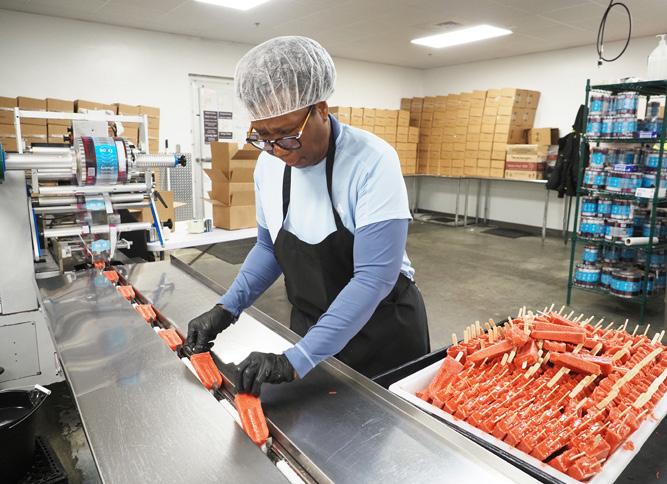

“These kids don’t deserve what they’ve got going on in their lives,” says Kennedy. “We hope they can just enjoy a Frios in their hospital bed with their parents or friends and put a smile on their face.” Kennedy says that all of his franchisees have wonderful stories about giving back, and the company has a program that allows Frios owners to request free pops to distribute if there’s something devastating that occurs in their community.
Dec. 21, 2025, will mark seven years since Kennedy took the helm of Frios. Under his leadership, Frios has experienced steady growth, adding 26 new franchises so far this year, and transitioned to a new marketing message.
“We sell amazing, flavored pops, but what we really sell is what they make you feel,” says Kennedy. “Maybe you’ve been stressed at work but go have a Frios pop with your kids or by yourself. It’s impossible to eat one and not feel happy or put yourself in a better place.”


Troy distillery celebrates the legend and the whiskey-making prowess of bootlegger Clyde May
By PAUL SOUTH
Clyde May was an unconventional whiskey man.
The 24-year-old, decorated veteran of World War II came home to Pike County in 1946 to make moonshine. Clyde May wasn’t the stereotypical “Thunder Road” story of outrunning liquor agents on country backroads to get his product to thirsty customers in the buckle of the Bible Belt.
Like most of his era, May was a hard-working, honest man, his family says, who worked full time in a variety of jobs — on a farm, and in cattle and timber. Moonshining was a side hustle to keep food on the table for his wife and eight kids, in Almeria, a community near the Bullock/Pike County line on County Road 12, known as the Rabbit Road.
L.C. May, Alabama state manager and national brand ambassador for the Clyde May’s brand, is grandson of the legendary Clyde May.
“If you lived on the front end of Rabbit Road, you lived in Bullock County and if you lived on the back half, your address was Troy, Alabama,” Clyde’s grandson L.C. May says.
May’s youngest son, Billy, carried illegal whiskey making into a new generation, and now Clyde’s grandson, L.C., serves as Alabama state manager and national brand ambassador for the now-legal brand.
Clyde May was a gentleman, family members say, whose word was his bond. His grandson L.C. was born shortly after his death. But he’s heard stories.
“When he was on his deathbed, he told his children to make sure that a customer got 10 gallons he ordered,” L.C. May says. “That’s how he was. He told his children to make sure every last open order of moonshine was filled.”
Distilled spirits and the distilleries to make them, once illegal in Alabama — Clyde May spent eight months in the federal pen for moonshining — is legal since the Legislature approved them in 2013.
For several years now, the makers of Clyde May’s Whiskey have been prepping to open the Conecuh Ridge Distillery and Visitor Center in Troy.
The state-of-the-art facility will produce 600,000 gallons a year, using up to 9,000 new American White Oak barrels, filled for the first time. Those toasted and charred barrels aging gently over time, will transform the clear liquor into smooth, amber whiskey. From there, it will be bottled and shipped globally. The facility will have a maximum bottling capacity of 2,500 bottles per hour. And there’s room for expansion.
Wine Enthusiast magazine has given Clyde May’s whiskies high marks. For example, Clyde May’s Straight Bourbon Whiskey was named a bourbon “perfect for wine lovers.”
In these two photos, a copper still is installed at the Conecuh Ridge Distillery in September.

The distillery plans to add 50 jobs and is slated to also become a tourist destination featuring tours, tasting rooms, a barrel house, food trucks, a shop and a restaurant.
To get a sense of the potential economic impact, in 2022 distillery tourism in neighboring Tennessee produced a $3.45 billion impact and created 30,000 jobs, according to the Distilled Spirits Council of the United States.
For Clyde May, the very idea of a legal distillery to make his recipe would have seemed impossible. But in the early 2000s, his son, Kenny, tried unsuccessfully to convince Alabama officials to allow him to open one in the state.
Rejected, Kenny turned north. Clyde May’s whiskies, as well as other distilled spirits, were made in Indiana under the umbrella of the Conecuh Brands investment group.
But while distilleries remained illegal in Alabama until 2013, lawmakers overrode a governor’s veto in 2004 and established Clyde May’s Alabama Style Bourbon as the official state spirit.
“I believe when they made it the official state spirit, they were honoring the spirit of the man, Clyde May, versus the spirit of the whiskey,” L.C. May says.
There’s more to whiskey making than water, grain, heat, wood and time, L.C. May says.
“We are very diligent about tasting multiple batches to find the right combination that are home run products,” L.C. May

says. “We take a lot of time to make sure we are honoring my grandfather appropriately.
“We care about the little things.”
The distillery will, of course, produce Clyde May’s Original Alabama Style Whiskey – Alabama’s official state spirit. It also will turn out Clyde May’s Straight Bourbon, Clyde May’s Straight Rye and Clyde May’s Special Reserve Bourbon, as well as some special release items.
The most recent offering on the company’s roster, Conecuh Ridge Bourbon, was unveiled in 2023. The name was inspired by an area where 27 natural springs come together to form creeks, inspiring the place name Union Springs.
“Some of those creeks flow right through our family property,” L.C. May says, “and they were my grandfather’s water source for making his whiskey. Those creeks flow into the Conecuh River in an area locals call Conecuh Ridge.”
The new distillery marks a homecoming, but it is about more than returning to roots.
Clyde May’s whiskey had been made in Indiana. But Conecuh Ridge Distillery brings it home.
“We wanted to bring it home to Alabama,” L.C. May says. “We wanted to bring it home to the area that Clyde May impacted when he lived in the Troy/Union Springs area. Troy made the most sense for us.”

But it was about more than coming home.
“We saw this is an opportunity, not only to bring Clyde home, but to build something special, to make something Troy and the state of Alabama could be proud of,” L.C. May says.
The brand, now in 50 states and a dozen countries, is growing.
Distillery Manager Steve May (no relation to the whiskey’s namesake) is a Rainbow City native who came to Conecuh Ridge Distillery from the Jack Daniel’s Distillery in Lynchburg, Tennessee, where he ran supply chain logistics, eventually rising to general manager. He’s spent a lifetime in the liquor business. His dad was the owner of a Gadsden bar.
“We’ve proven to ourselves … that we can compete with the big boys and girls,” Steve May says. “We feel like it’s our time.”
Even though the distillery’s equipment – mash cookers, fermentation tanks and stills — is cutting edge, tourists will bask in a warm glow of history.
Visitors will see Clyde May’s original still in the distillery’s lobby, a nod to the tried-and-true way of crafting whiskey.
As for the past, travel back to Almeria for a moment. Almeria is a community with its own colorful history beyond whiskey making. A young Hank Williams Sr. played a clubhouse there and local legend has it that Hank and his wife, Audrey, once climbed out a window to escape a brawl that erupted after a Williams show. Years later, Hank Williams Jr. recorded a critically acclaimed album in the community.
The colorful story that swirls like warm bourbon in a glass, of small towns, fistfights, country music and even a dash of jail time enriches the brand.
But country music, marketing and magical tales aren’t enough in the whiskey business. Clyde May knew that more than 75 years ago, a lesson his family has passed through generations.
“A story can only go so far,” L.C. May says. “Like my grandfather believed, your product’s got to do the talking for you.”
Paul South is an Auburn-based freelance contributor to Business Alabama.

November 12, 2025
The Club Birmingham
Thank you to our sponsors

Award Sponsors:

Platinum Sponsors:





For more than 40 years, the Association of Fundraising Professionals Alabama Chapter has hosted the National Philanthropy Day luncheon to recognize and celebrate the individuals and organizations whose achievements have made a significant impact across the state of Alabama.
The Association of Fundraising Professionals includes 27,000 members in more than 240 chapters throughout the world, including more than 140 members representing 84 organizations across Alabama. Members are working to advance philanthropy through education, training, professional development and networking opportunities.
The 2025 National Philanthropy Day honorees were selected by a committee of community leaders in Alabama. None of the committee members are affiliated with AFP Alabama as board or chapter members.
Please join us as we honor the 2025 National Philanthropy Day honorees.
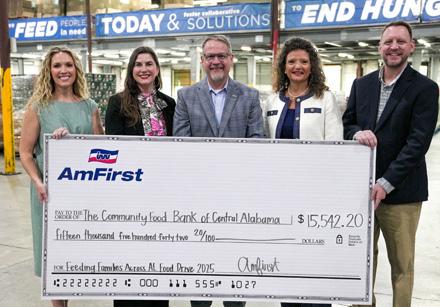
In 1936 during the Great Depression, 19 U.S. Steel employees pooled $1,500, kept in a cigar box, to provide mutual financial support. From those humble beginnings, AmFirst credit union has grown to serve more than 200,000 members across 21 branches, with assets exceeding $2.5 billion. But AmFirst hasn’t strayed from its founding mission: to enhance financial stability and strengthen the communities it serves. “At AmFirst, our Commitment to Community is one of our core values and a driving force behind everything we do,” says Jody Mattson, director of philanthropy and community engagement. Guided by the credit union motto, “People Helping People,” AmFirst supports organizations and initiatives across Alabama. In 2025, AmFirst and its employees contributed nearly $388,000 to United Way agencies statewide. In addition, employees dedicated 1,804 volunteer hours and participated in more than 1,000 community events. The credit union’s initiatives range from collecting 1,500 children’s books with Better Basics to providing 55,000 meals through its Feeding Families Across Alabama Food Drive. Seasonal programs like toy and pantry drives bring relief and joy to families in need. AmFirst also invests in future generations, sponsoring the Rising Star program with WBRC and awarding six annual $5,000 scholarships. Through its signature Community First program, employees select four nonprofits to receive $40,000 each year, with beneficiaries honored at the Annual Charity Golf Tournament. “Giving back is not just an initiative at AmFirst,” Mattson says. “It is woven into our mission and core values.”

Birmingham Corps, founded in July 2022, is transforming the city’s workforce by connecting overlooked talent to jobs in education, health care and neighborhood revitalization. Since its launch, the nonprofit has supported more than 1,000 residents in navigating the job market, providing six-week workforce readiness training, oneon-one career coaching and targeted partnerships with employers, colleges and training institutions. “Birmingham Corps was launched in 2022 to build a smarter, more effective workforce solution for our city,” says Yamini Bhat, founding executive director. “Modeled after Baltimore Corps, our mission is to transform service into career pathways — recruiting, training and placing underestimated talent into jobs that make a difference.” In just three years, Birmingham Corps has grown from one employee to a team of six. At the same time, it has trained and supported thousands of residents and placed dozens into meaningful roles with local employers and nonprofits. This integrated approach not only prepares individuals for sustainable careers but also strengthens the local economy by ensuring access to a diverse and motivated talent pipeline. Looking to the future, Birmingham Corps’ new strategic plan, Vision 2028, aims to double job placements, expand employer partnerships and generate an estimated $29 million in local economic impact. “Fundraising is absolutely vital to our mission,” Bhat emphasizes. “We run on a blended revenue model of public-private partnerships. Each dollar invested helps us create a stronger pipeline of local talent while also meeting employer needs in Birmingham’s workforce.”
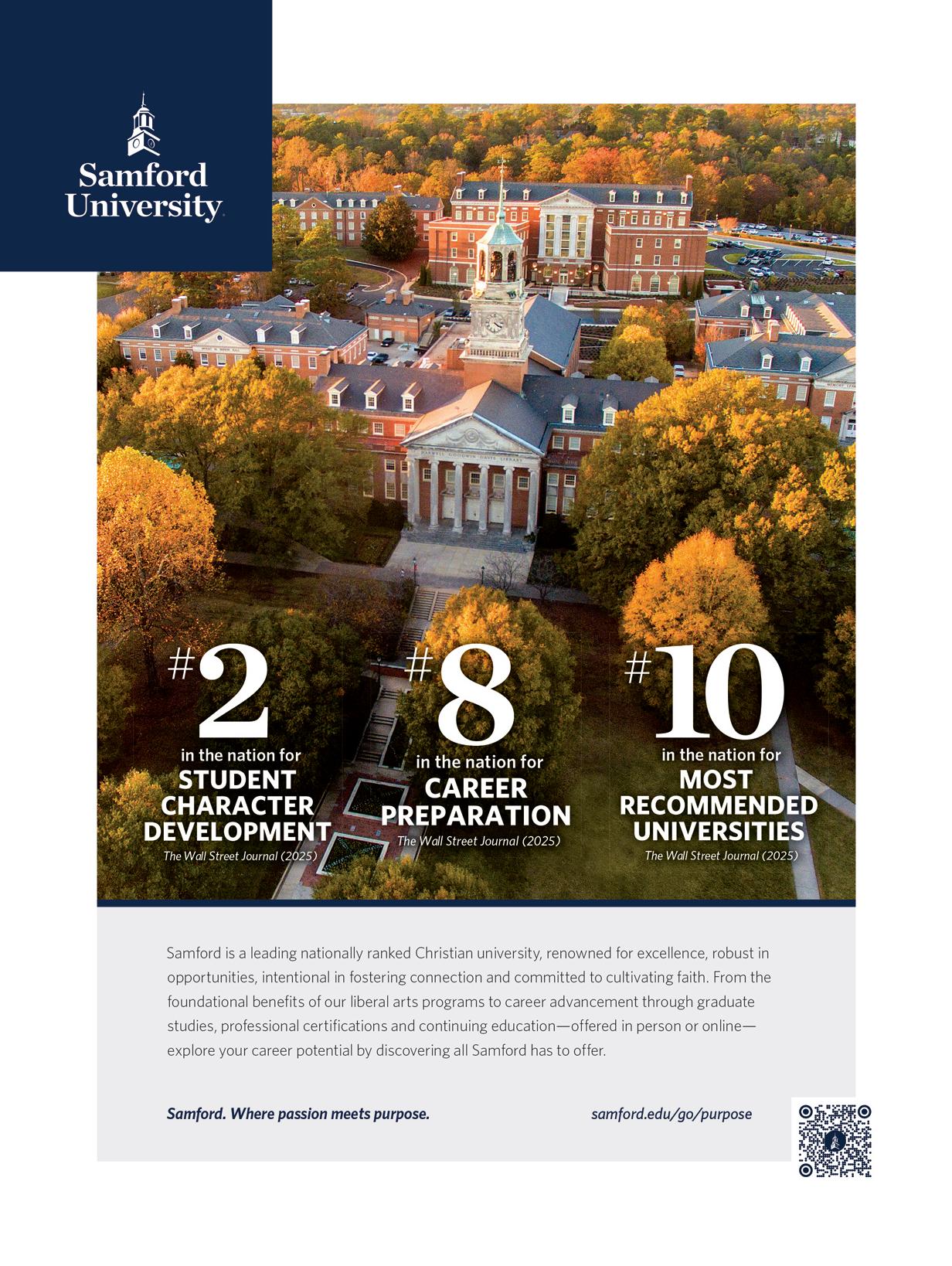
United
Nominated by the University of Alabama
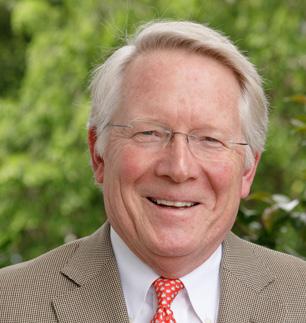
William “Will” Brooke Sr. has worn many hats over the course of his distinguished career — attorney, business leader, investor and political figure — but the role that has defined him most in recent years is philanthropist. After retiring from Harbert Management Corp. in 2021, which he co-founded nearly three decades earlier, Brooke has dedicated much of his time and energy to causes that strengthen communities across Alabama. With his wife, Maggie, by his side, Brooke has supported a wide range of institutions. Together, the couple has endowed scholarships and faculty funds at The University of Alabama, their alma mater, and championed organizations including the Alabama Symphony Orchestra, McWane Science Center, King’s Home and United Way of Central Alabama. Brooke says his commitment to philanthropy is rooted in both faith and family. “Both my father and my father-in-law were deeply involved in civic, charitable and church activities,” he recalls. “My faith taught me to give back, my father-in-law showed me how to do that, and throughout, my wife, Maggie, has encouraged us to do more.” For Brooke, giving has never been passive; it’s about rolling up his sleeves. “Nearly every civic, charitable and church organization is feeling the pressure to do more with less,” he advises. “Pick an organization of interest to you and ask how you can help. Then, really get involved.” Brooke has found that helping others is not just meaningful, but joyful. “As it turns out, participating and giving are fun,” he says. “That’s what keeps pulling us deeper.”
Philanthropist
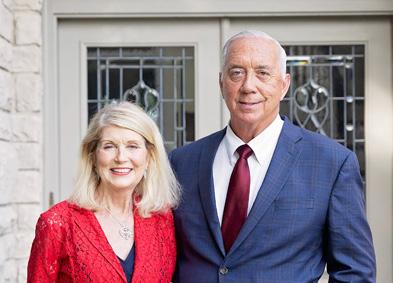
Fifty years ago, a chance decision set Frank Buck on a path that would change his life. Fresh out of Michigan State, the Ionia, Michigan, native flipped through a law school catalog and landed on Samford University’s Cumberland School of Law. “Obviously, the good Lord wanted me here in the Bible Belt in Alabama,” he says. What he didn’t know then was that Samford would give him more than a law degree — it would give him Marti. The bright undergraduate from Trussville caught his eye at a Samford basketball game, and by 1975, they were married. That love story is at the heart of the Bucks’ philanthropy. For more than four decades, Frank and Marti have poured their time, resources and hearts back into the place that brought them together. Their giving has touched nearly every corner of campus, from nursing scholarships and men’s basketball to the Cumberland School of Law, where Frank’s career began. This year, Samford honored them with the naming of a new central plaza. Their commitment is deeply personal. Two of their three daughters followed Frank into the law, while the third chose nursing, mirroring the very programs the Bucks support. “Samford has been very good to my family,” Frank says simply. A seasoned attorney focusing on plaintiff personal injury work and concentrating on trucking and auto accidents, Frank remains passionate about helping the underdog. “I’ve been a blessed, lucky man,” he says. “I call it Buck Luck.” His advice for would-be philanthropists? “Decide where your passion is,” Frank says. “Decide where your heart is.”
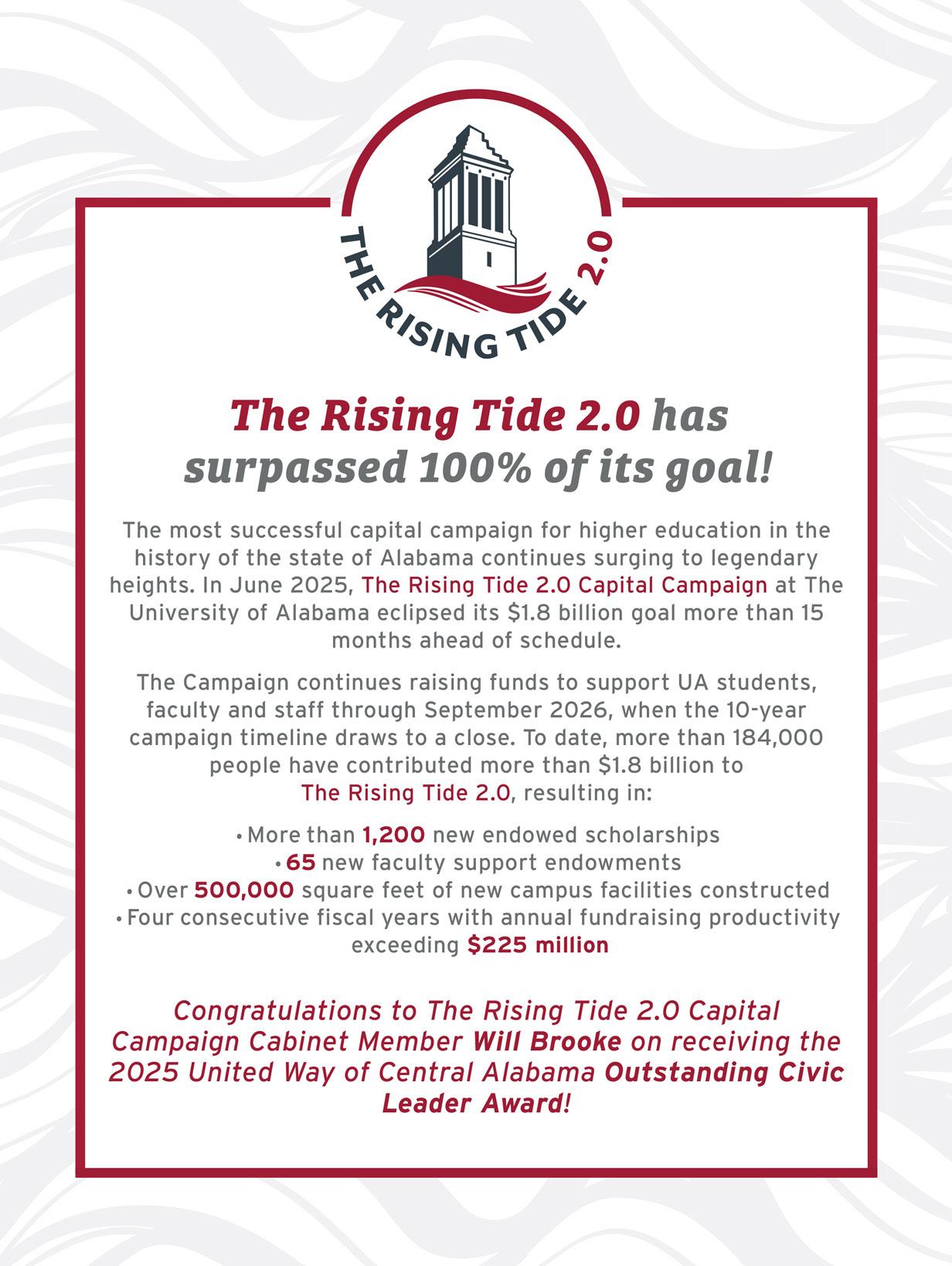
Bill Moran Outstanding Youth in Philanthropy
Nominated by Children’s of Alabama

At 26 years old, Frances Grace Hirs has already endured more battles than most face in a lifetime. She grew up in Fairhope and was diagnosed with Acute Lymphoblastic Leukemia (ALL) at age 3. After relapsing at ages 9 and 13, a life-saving bone marrow transplant in September 2013 gave her a second chance. “The people who have been with us all this time have watched me grow up, go through my last two diagnoses and overcome them.” That community spirit is at the heart of “Tee Off Fore a Cure,” a golf tournament her parents, Allen and Debbie Hirs, launched when Frances Grace was 5. Over two decades, the event has raised more than $1 million for childhood cancer research at Children’s of Alabama. “God and people are what have made this tournament go on for so long,” she said. “Most of the people on our committee have been with us since day one because they care about us and our cause.” Today, Frances Grace is turning her personal journey into a professional calling. After earning her B.S. in health sciences from Spring Hill College, she began working at Eastern Shore Children’s Clinic, the very office where she was once a patient. Now a licensed practical nurse, she is completing her RN and BSN programs. “I love kids and want to continue to work in pediatrics,” she said. “I love where I work and want to eventually go into pediatric oncology.”
Leigh A. Kaylor
Community Foundation of Greater Birmingham Outstanding Professional Advisor
Nominated by Community Foundation of Greater Birmingham

For nearly three decades, Leigh A. Kaylor has helped families and individuals in Alabama shape their financial futures and philanthropic impact. An attorney with Dentons Sirote in Birmingham since 1997, Kaylor is a member of the firm’s Trusts, Estates and Wealth Preservation practice. Her work spans everything from drafting basic wills to designing sophisticated estate planning strategies, such as grantor-retained annuity trusts and dynasty trusts. Kaylor’s practice is distinguished by her emphasis on philanthropy. She has guided numerous clients in establishing family foundations and nonprofits, ensuring they meet complex legal and tax requirements. Her expertise extends beyond technical compliance, however — she is focused on aligning clients’ values with long-term giving. “One of the most fulfilling parts of my work is helping clients connect their personal values with lasting impact,” Kaylor says. “Whether it is establishing a charitable trust, creating a foundation or incorporating philanthropy into an estate plan, I see firsthand how clients are able to support causes they care deeply about, often far beyond their lifetimes.” Her interest in trusts and estates began early in her career. “I saw how powerful thoughtful planning could be, not only in protecting families but also in honoring their values across generations,” she reflects. Recognized nationally for her excellence, Kaylor has been listed in “The Best Lawyers in America” for more than a decade and regularly earns top rankings for private wealth law.
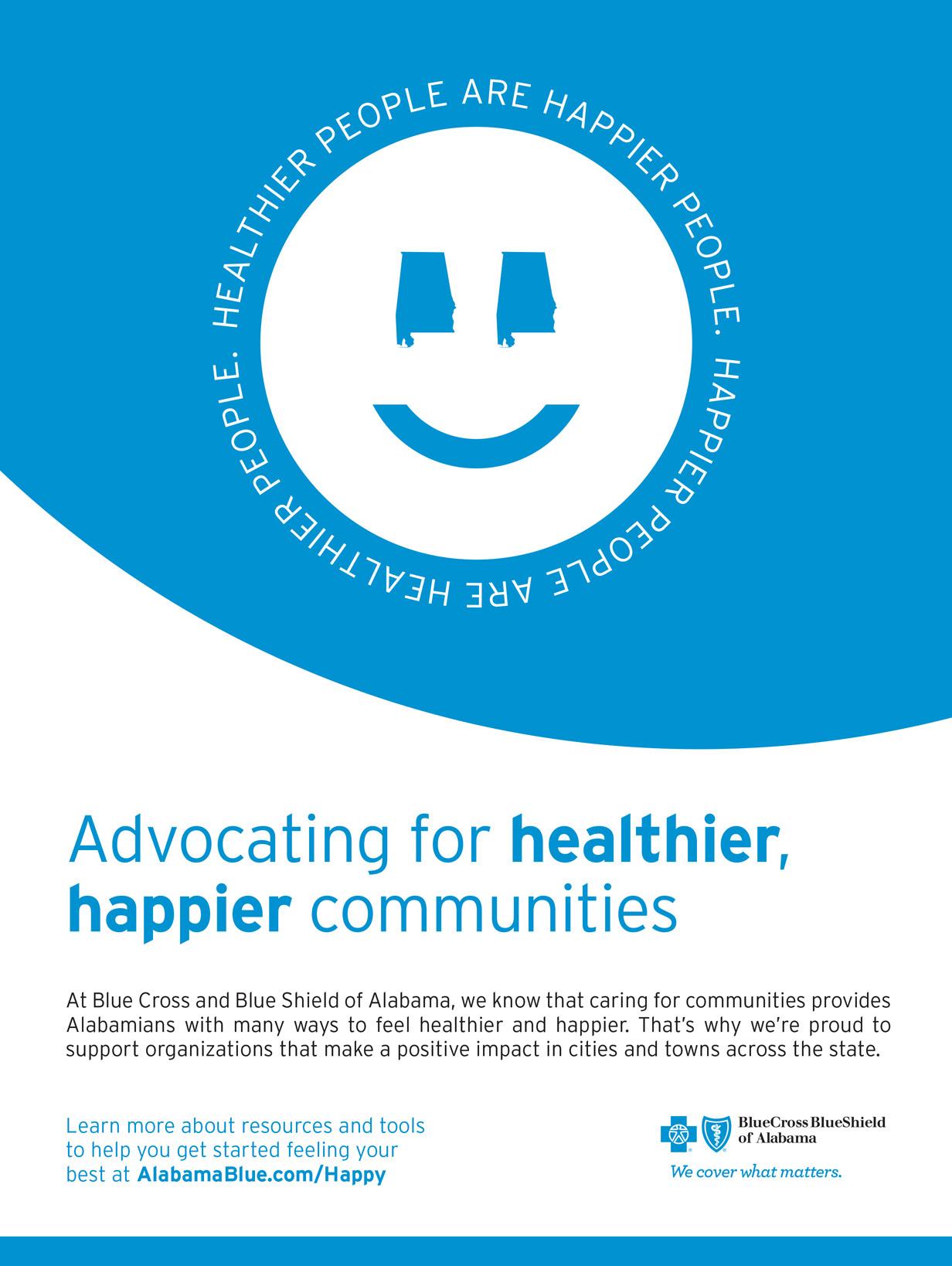
AFP Alabama Chapter IDEA Award
Nominated by XVI

When Lane and Debbie Hagan welcomed their daughter Libby into the world, they had no idea her life would inspire a movement of compassion across Alabama. Injured in the NICU at just 12 days old by a devastating insulin overdose, Libby’s doctors told the Hagans to “go home and love your baby” because she would not live long. But Libby defied every expectation. For 10 years, she lit up rooms with her radiant smile, contagious laughter and unwavering spirit. “Libby was an angel,” remembers her father, Lane. “Her smile and joy were infectious … We got 10 beautiful years with her. She was so loved and adored by her siblings, peers and school faculty and staff.” In 2020, the Hagans started Libby’s Friends, a nonprofit to help families like theirs navigate the steep costs of raising a child with special needs. From medical equipment and devices to therapies, expenses can quickly overwhelm families. “Those are three things that really impacted Libby and our family, and insurance is doing its best to cover less and less,” Lane said. Today, Libby’s Friends provides grants for medical equipment, devices and therapy to families across Alabama. Its support is funded through events such as a May baseball tournament, a fall festival called Franks N’ Steins and an annual golf tournament. Lane, executive director of the Libby’s Friends, says that Libby’s story continues to remind him of Genesis 50:20: “You intended to harm me, but God intended it for good.”

Katrina Watson has built a career on the belief that philanthropy is about people, relationships and the power of generosity to transform communities. Not only has she put that into practice, she’s teaching it to others as well. Watson is senior vice president of community impact at United Way of Central Alabama, where she oversees the annual distribution of more than $30 million to nonprofits. Among her innovations is LEARN United, an initiative designed to equip nonprofit leaders with expert guidance, best practices and professional development. “Philanthropy and fundraising are about people,” Watson says. “The word ‘philanthropy’ means love of mankind, and that love begins with building genuine relationships and identifying shared values.” Early on in her career, when a mentor, former Outstanding Fundraising Executive award-winner Dr. Shirley Salloway Kahn, recognized her strengths in communication, relationship-building and inspiring action. Watson went on to become a Certified Fund Raising Executive, raising tens of millions of dollars and teaching fundraising at UAB. She also has led The Literacy Council of Central Alabama. Watson’s civic leadership includes roles with Momentum Leaders, the Rotary Club of Birmingham and national service on the Barbara Bush Foundation’s Equity & Access Working Group. She is a graduate of Momentum, Leadership Birmingham and the Alabama Leadership Initiative. Guided by a family legacy of service, Watson views her work as both professional calling and personal mission: “Service and nonprofit leadership are powerful ways to create change, uplift communities and leave a legacy.”


Business Alabama is proud to partner with the Association of Fundraising Professionals Alabama Chapter in celebrating the spirit of generosity that drives our communities. Together, we honor the individuals and organizations whose leadership, compassion and commitment to philanthropy are making Alabama a better place to live and work.
We’re honored to help shine a spotlight on those whose giving truly transforms lives across our state.



According to Sandy Berglund, her husband, Ted, was a talker, an outgoing guy who could walk into a roomful of strangers and soon be acquainted with everyone in it. So not long after he began treatment for advanced cancer at the UAB St. Vincent’s Bruno Cancer Center, he was on a first-name basis with many of the staff and conversed with them whenever he was there.
“It was during one of those conversations that he learned about the center’s aging CT simulator,” said Sandy. “He knew right away that he wanted to give back by helping to replace it.”
So, the Berglunds made a contribution through UAB St. Vincent’s Foundation toward the purchase of a new machine.
“Ted said he wanted future patients to have an even better chance at recovery than he had, and he hoped this would help,” said Sandy. “I’ll always be proud of him for making this decision without hesitation.”
“We are extremely grateful for the generosity of the donors who committed to the purchase of the new CT simulator,” said Susan Salter, MD, a radiation oncologist at Bruno Cancer Center. “Their support will help us reduce time to treatment and ultimately improve cancer outcomes.”
Now Sandy serves as a member of the UAB St. Vincent’s Foundation advisory board — continuing her passion for helping others and honoring the legacy of her late husband. UAB St. Vincent’s Foundation is deeply grateful for the support of Sandy and Ted Berglund.
Kevin Callahan has built more than successful car dealerships. He’s built a legacy of community leadership. As owner and general manager of Honda and Hyundai of Jasper, Kevin has become deeply rooted in Walker County. Although he and his wife, Pam, are not originally from Walker County, they have fully embraced it as home, investing their time, heart and resources to make it stronger.
Beyond his professional success, Kevin is deeply involved in strengthening the community through service and leadership. He serves on several boards, including the Walker Area Community Foundation, Jasper Industrial Development Board and Walker Baptist Medical Center Advisory Board. From 2023 to 2025, he also led the Walker Area Community Foundation’s board of directors as chairman. In addition, Kevin is an active member of the Jasper Rotary Club, demonstrating his long-standing commitment to community service.
Kevin’s heart for giving back extends far beyond meetings and boardrooms. Each year, he organizes a community bike drive through his dealerships, putting new bicycles in the hands of children across Walker County. Through his business, Kevin sponsors numerous local events and programs while also giving his time as a volunteer.
His leadership and generosity have not gone unnoticed. Kevin has received several honors, including the Vulcan Newcomer Award (2017), the Honda Elite President’s Award (2021), and the prestigious E.A. “Larry” Drummond Lifetime Achievement Award (2023).
Through his leadership, philanthropy and genuine community spirit, Kevin continues to meet needs as he sees them.
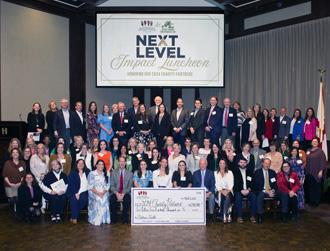
For more than eight decades, the Monday Morning Quarterback Club (MMQBC) has exemplified how passion, community and purpose can intersect to create lasting impact. United by a love of football, MMQBC members have elevated volunteer fundraising into an art form. Through the Quarterbacking Children’s Health Foundation, they have raised and dispersed more than $40 million to over 65 organizations supporting children’s health initiatives across Alabama.
MMQBC’s commitment extends far beyond financial contributions. Its members devote time, resources and expertise to ensure that critical programs in pediatric care, medical research and therapeutic services receive the support they need to thrive. From funding life-saving medical equipment to enriching the lives of children through specialized therapies, the club’s impact resonates far beyond the football field.
For more than 30 years, MMQBC has been a steadfast partner to United Ability. Their thoughtful and consistent generosity has strengthened our programs and expanded our capacity to serve children with medical complexities. From funding the community’s first therapeutic sensory room to advancing innovative medical, therapeutic and educational services, MMQBC has helped United Ability remain a leader in care for children with disabilities.
Stories of children who have benefited from these efforts highlight the very essence of MMQBC’s volunteer-driven philanthropy — where commitment, vision and leadership converge to create measurable, lasting change.
With immense gratitude and admiration, United Ability proudly honors the Monday Morning Quarterback Club as this year’s VIP (Volunteer in Philanthropy).


Honored by The Bell Center
Founded in 1958, The Service Guild of Birmingham is a dynamic women’s volunteer organization dedicated to serving children with special needs. With a mission rooted in compassion and community service, the Guild has played a pivotal role in shaping early intervention efforts in Birmingham.
In 1984, recognizing a critical gap in services for young children with developmental delays, the Guild envisioned an early intervention program and recruited Betty Bell, a pioneering developmental nurse, to bring that vision to life. Her leadership and expertise laid the foundation for what would become The Bell Center for Early Intervention Programs.
More than four decades later, The Bell Center continues to thrive, providing life-changing support to children and families across the region. As The Bell Center’s lifetime partner, The Service Guild remains deeply involved, offering hands-on volunteer support in classrooms and spearheading fundraising initiatives to sustain and expand programming. Last year alone, Guild members contributed 3,552 volunteer hours and raised an impressive $380,000 to help fund The Bell Center’s vital services.
Today, The Service Guild is comprised of 180 dedicated and passionate volunteers who embody the spirit of service and advocacy. Their unwavering commitment ensures that children with special needs receive the early support they need to reach their full potential. Through its enduring partnership with The Bell Center, The Service Guild of Birmingham continues to be a beacon of hope, empowerment and community impact.
Honored by Greater Birmingham Humane Society
For years, Bob Stafford has been one of the Greater Birmingham Humane Society’s most dedicated and compassionate volunteers. Known by staff, fellow volunteers and rescue partners as one of the very best, Bob has devoted countless hours to transporting animals to their new beginnings. His work has carried dogs and cats across the country, ensuring they make it safely into the arms of rescue partners and, ultimately, their forever families.
What sets Bob apart is not just his reliability and commitment, but the kindness he shows every animal he meets. Each transport ends with “Bob’s Good Luck Kiss” — a gentle tradition that has become a symbol of hope and love for the pets heading toward their brighter futures.
Bob is an invaluable part of the GBHS family. His unwavering support of our mission and his willingness to step in whenever help is needed make him an extraordinary asset to both the shelter and the animals we serve. Because of volunteers like Bob, thousands of animals get the second chance they deserve.

Honored by the University of Alabama at Birmingham
Frank Tomlinson has been an active and impactful volunteer at the University of Alabama at Birmingham (UAB) since joining the UAB School of Nursing’s Junior Board of Visitors (JBOV) in 2017. In 2021, he served as the chair of the School of Nursing JBOV, helping to raise a record number of corporate sponsorships for the JBOV’s signature event, the No-Show Ball. Between 2021 and 2023, Frank spearheaded three VIP Dinner events, bringing together the School of Nursing’s board of visitors and the JBOV to support the No-Show Ball, while recognizing and honoring key leaders in the community.
In 2024, Frank joined the UAB O’Neal Comprehensive Cancer Center Supporter’s board and led a fundraising initiative to help the center and the School of Nursing expand the availability of cancer-related clinical trials in Birmingham by increasing the number of nurses prepared to manage clinical trials. Thanks to Frank’s leadership, a total of $255,000 was pledged to fund 10 new scholarships and other essential program needs for the School of Nursing to launch a clinical research management curriculum.
Frank is a graduate of Mountain Brook High School and Auburn University, where he received his bachelor’s degree in marketing and was a member of Sigma Nu fraternity. He works in medical distribution and sales and is the founder of Southern Medical Solutions. He and his wife, Emily, have two children and live in Mountain Brook.

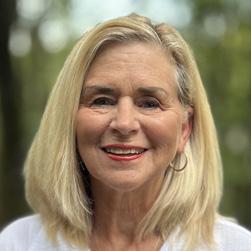
Honored by Megan Montgomery Foundation
Over the past three years, Nancy Cargile Tumlin and Dr. Dotti Bailey have poured hundreds of hours into making Megan’s Foundation’s Gingerbread Jam one of the most anticipated holiday traditions in Central Alabama. What began in 2022 as a heartfelt idea inspired by Meredith and Megan Montgomery’s childhood tradition of decorating gingerbread houses has grown into a beloved community event that has raised more than $37,000 to fund healthy relationship education in Alabama schools.
Nancy, newly retired after a 37-year career with United Way of Central Alabama, embraced the challenge of serving as the inaugural chair for the Gingerbread Jam. With her expertise in marketing and communications, she helped shape the event’s vision, promoted it widely — including television appearances — and brought her passion for teaching and mentoring children to every detail. Today, she continues to serve her community in ways that reflect her lifelong commitment to helping others.
Dotti, co-chair of the event and a founding board member of the Megan Montgomery Foundation, elevated the Jam with her creativity, leadership and example of generous giving. A Licensed Clinical Social Worker with more than 25 years of experience, Dotti is the founder of Bailey Wellness Group and a respected advocate for children and families affected by trauma. Her professional expertise and personal dedication have strengthened the Foundation’s mission to prevent relationship violence through education and early intervention.
Nancy and Dotti transformed a family tradition into a powerful community movement.

Honored by the Birmingham Zoo
After retiring for a second time in 2003, Larry and Phyllis Wojciechowski moved to Birmingham from Michigan and Arizona. They quickly invested in their community by giving generously to the Alabama Symphony Orchestra, Birmingham Zoo, Red Mountain Theatre, College Counts, Scholarships for Kids, Cahaba River Society, Hoover Monitor and Vets4Vets. Additionally, they served on the boards of Support Committee for the Alabama National Cemetery, Alabama Fallen Warrior Project, Southlake Residence Association and Valley Lake Association. They also contribute to their church and other meaningful causes.
In 2017, upon attending an event at the Birmingham Zoo, Phyllis and Larry were touched when they met several dedicated animal care professionals. The following year, they made their first endowed gift to the zoo for conservation establishing the Phyllaris Fund. This fund supports the zoo’s Passion into Conservation Action (PiCA) program, which awards grants to staff involved in conservation projects and worldwide research.
In 2023, Phyllis and Larry demonstrated their dedication to the zoo’s future by making a $1 million leadership gift to name the new Cougar Crossing habitat, leading the fundraising campaign by committing early to this keystone habitat. More than 200 donors followed their example, contributing $1,000 or more to display their names on paw prints at the exhibit. In March 2025, Cougar Crossing opened to the public, housing two cougar kittens and two adult bobcats (all orphaned/ rescues) who have settled — beautifully — into their forever homes.
The Birmingham Zoo takes great pride in honoring Phyllis and Larry and their heartfelt generosity.


But it’s sometimes tough to find just the right property
By DEBORAH STOREY
Commercial real estate entrepreneurs in Alabama are getting creative in finding new properties. They may not get their first choice of location or opt for smaller locations. Complicating the picture are the realities of politics and workforce shortages.
Experts find that the demand for commercial space continues to be healthy in many areas, but that space is costing more because of rising construction costs and rent.
Retail trade, including food services and drinking places, accounts for roughly 473,000 jobs in Alabama, according to the Alabama Retail Association. The group represents more than 4,000 members with some 6,000 locations selling food, furniture and more.
Their figures show that retailers employ a quarter of the private-sector employees in the state with a payroll nearing $11 billion.
Retail Specialists, a commercial real estate firm headquartered in Birmingham, has been serving property owners and retailers for 20 years. Its team includes 37 licensed real estate agents and more than 70 employees in Alabama, Mississippi, Georgia, Texas and California.
In 2011, Retail Specialists launched Retail Strategies, a consulting firm specializing in retail recruitment, education, downtown revitalization and small-business support.
David Ashford is executive vice president of leasing and brokerage at Retail Specialists. He says what they’re finding in Alabama is that retailers and restaurant owners want to bring new business here. With rising construction costs and rents, though, they’re having to be flexible.
Overall, “we are certainly seeing prices go up,” Ashford says. “Prices have gone up on land. Prices have gone up on shop space. It’s created a lot of headaches in our world just trying to find sites because of the availability.”
Lack of options “can cause retailers to completely pass on a market and move on to somewhere else,” he says. “And we’ve seen that. We had a retailer that we’re working with that is a food and beverage concept, and they wanted to locate on Highway 280” in Birmingham for their first location in the state.
“There’s nothing available to them that they like well enough to lease. So, they’ve moved on to another market. Now their focus is on Dothan and South Alabama.”
If they can’t find the space they want and it can’t be built for them reasonably, Ashford says, “then they’re just going to move on to somewhere else that they can.”
As rents and construction costs go up, fewer new shopping centers are popping up, too. Some retailers are opting for smaller spaces.
“A lot of 20,000-square-foot retailers have gone down to
David Ashford Retail Specialists

{“I think there’s a strain on the labor market right now in construction. And so with all those costs, demand hasn’t stopped. There is demand for renovating space and there’s demand for new build.”
12,000 feet and they’re looking in towns that have, say 50,000 to 100,000 people or 50,000 to 100,000 population trade areas,” Ashford says.
Five Below is a good example, he says, as it moves to locate smaller stores outside big urban areas.
“They used to be a 16- to 18,000-square-foot store. They’re now looking at 8- to 10,000-square-foot stores in cities like Hartselle, Sylacauga and places like that.”
With rent in the mid-$40s per square foot, Ashford says retailers have to “figure out how do I get lower rents, and tertiary markets is a good way for them to do that.”
With increasing competition from online retailers, smaller cities “need the support,” he says.
“I do think specialty brands are starting to emerge in brick and mortar. Higher-end people like Warby Parker and things like that that are expanding,” he says.
College towns like Tuscaloosa and Auburn are seeing an influx of retailers. Locating in downtowns, too, is increasingly popular.
“Really all of the major metros are seeing an uptick in retail activity,” Ashford says.
Alabama is “pretty retail heavy,” he says. Publix, for example, “does very well in Alabama.”
Since the worst days of the COVID pandemic, the market has rebounded as people want to get out of the house, shop and socialize.
“People are spending more dollars on food and beverage and entertainment,” Ashford says. “I think that we’ve just seen that trend and it’s just continued. So, it’s kind of fueled growth, which has been very positive for those of us in the retail industry.”
Retail Specialists also is seeing city incentives and publicprivate partnerships, especially in new construction, he says.
“That’s become a big trend. I would say that most new construction today cannot happen without a public-private partnership unless it’s a major booming market.”
Attractive areas like Huntsville, for example, don’t need to offer a lot of incentives “because the retailers want to go there.”
Within smaller markets, “we educate our cities on how to
structure tax incentive packages and things like that,” Ashford says.
The market for coffee and breakfast places is still “huge,” he says. New retailers, particularly food and beverage concepts, like Small Sliders, continue to show interest in Alabama.
“We are working with and are trying to bring Dog Haus, which is an LA concept” with a biergarten atmosphere, gourmet hot dogs and sausages.
But economic and political realities influence the best-laid plans.
“Cost of steel is still up,” he says. “You don’t know what’s going to happen with tariffs and all that moving forward in construction.”
Construction is probably going to be backlogged, he expects.
“I think there’s a strain on the labor market right now in construction. And so with all those costs, demand hasn’t stopped. There is demand for renovating space and there’s demand for new build,” Ashford says.
Even if retailers find a second-generation space that works, rents are going up. Renovation may cost in the mid-$20s per square foot versus $40 on a new build.
And then there’s the federal crackdown on undocumented workers.
ICE raids “have affected the labor market,” the association is finding. One Alabama contractor says some of his workers just aren’t showing up, and 30 or so people who did were pulled off a job site at midday. Even a simple roofing job takes longer with a smaller crew.
“That means that the cost of labor is going to go up,” Ashford says. “You’ve got to find somebody to replace those people. And typically, your more certified skilled labor is going to be more expensive than people who are going out and hiring unskilled laborer to do this work.”
The overall picture is still mixed, though. In South Alabama, one real estate agency is finding that inquiries for property are down at the moment.
Chris Harle is managing broker of commercial sales and leas-
ing at White-Spunner Realty in Mobile.
“I think the biggest reason is that the cost of doing business has risen so dramatically in the last few years,” Harle says. “Occupancy rates are at an all-time high and the spaces that do remain are not going to be your top-class A spaces, or they need a bunch of work, and because occupancy is so high, rental rates have risen dramatically as well.”
Finding enough people to work is hard, too. Harle has two former restaurant spaces that have been vacant for a while.
“A year ago, I would have had them leased within a week of going on the market. I got calls almost daily from people looking for restaurant space,” he says. “I have reached out to lots of restaurant operators I know, and they all say they would love to expand but they can’t hire enough people to staff what they have now.”
At White-Spunner, too, they’re seeing the majority of retail business owners look for existing property.
“The cost of construction has raised rent prices so high it’s really hard for retailers to make the numbers work on new construction,” Harle says. “That’s what has led to such high occupancy rates and why new developments have slowed dramatically in the last few years.”
The University of Alabama’s Alabama Center for Real Estate Commercial Real Estate Index Survey measures future expectations from professionals in commercial real estate and related
fields. The ACRE 2025 third-quarter survey earned a score of 59.9, indicating moderate expectations for commercial real estate expansion.
Wages are up, too, which helps.
ACRE Director Stuart Norton says that according to the most recent National Association of Realtors Commercial Real Estate metro market report, the Birmingham-Hoover metro area had one-year wage growth of 8.1% in March 2025 – above the national average of 3.6.
“Wages in the area are growing at over twice the national rate, and this is a very good sign for Birmingham’s retail market as it is driven by consumer spending,” Norton says.
In the Birmingham metro area, retail properties reported a 12-month market rent growth of 3.5% during the first quarter of 2025, a significant improvement from the negative 1.2% showing in market rents during the first quarter of 2024. The vacancy rate there is 4.1%.
“The current level reflects a relatively low level of risk and relatively high valuations for retail properties,” he says.
The Huntsville metro area, in particular, he says, should see a large boost in demand for all property types with the relocation of U.S. Space Command from Colorado.
Deborah Storey is a Huntsville-based freelance contributor to Business Alabama.



By DEBORAH STOREY
No one opens a restaurant or retail business expecting to fail. Complicated algorithms can determine success. Maintenance costs go up. The location isn’t ideal. Workers don’t show up.
Owners of distress properties in Alabama have options, though, experts say.
Carter Burwell is managing director at JLL Real Estate in Birmingham. He specializes in tenant representation and site selection for office and industrial occupiers throughout Alabama.
JLL gained a lot of experience with distressed properties during the Great Recession and beginning stages of the COVID-19 shutdown, he says. “Now we are seeing it again with the current reset in office markets in Alabama and across the country,” Burwell says.
Good communication between all parties makes it easier to turn things around along the way, Burwell says.
“It will serve them well to communicate early and often with their lenders, tenants, vendors and anyone else that may be affected by their current situation,” Burwell says.
Fortunately, experts in these situations are available to help.
“When landlords find themselves in

‘‘
When landlords find themselves in financial distress, the first thing they need to do is partner with a seasoned real estate attorney that understands lenders and tenants and has a lot of experience in this area.”
— CARTER BURWELL, JLL REAL ESTATE
financial distress, the first thing they need to do is partner with a seasoned real estate attorney that understands lenders and tenants and has a lot of experience in this area,” Burwell says.
Selling the property seems like a quick fix but might not be the best solution.
“It can be almost impossible to sell a property in a distressed market,” Burwell says. “Often times the best — and only option — is to find a way to hold on and wait for the capital markets to turn in a positive direction.”
Even a quick AI search offers suggestions for owners of distressed properties.
Commercial real estate owners can try loan modifications with extended terms, delayed payments and lower interest rates; forebearance agreements that pause payments; a deed in lieu of foreclosure; short sales; refinancing; or strategic bankruptcy.
Lenders can offer loan workouts or modifications, non-judicial foreclosures that invoke power of sale clauses, or loan purchases.
Investors in distressed commercial real estate can consider direct purchase through foreclosure or bankruptcy or acquiring the loan from the existing lender at a discount. Other options are converting the property to offices or residential
real estate or hard-money loans for a fix-and-flip.
When a sale seems the right way to go, private equity firms are always on the lookout for a good deal.
Heather Jamison is a creditors’ rights and bankruptcy partner at Birminghambased law firm Burr & Forman’s real estate practice. The firm is part of a growing cohort of private equity-backed players that are buying office, industrial and mixed-use buildings at steep discounts.
Tools they use for distressed asset transactions include loan-to-own strategies, lease renegotiations, forbearance agreements, receiverships and foreclosures.
Typically, distressed properties have either low tenant occupancy or belowmarket rent, Jamison says.
“Right now, especially for industrial property or retail property, tenant occupancy is low,” she says.
In recent years rent has increased substantially.
“This means that properties with longterm leases and set rental rates have little negotiation power available to increase rental rates,” she says.
Their office is seeing landlords become
— HEATHER JAMISON, BURR & FORMAN ‘‘
It can be almost impossible to sell a property in a distressed market. Often times the best — and only option — is to find a way to hold on and wait for the capital markets to turn in a positive direction.”
— CARTER
BURWELL,
JLL REAL ESTATE
very aggressive in declaring defaults in an attempt to dispossess below-market leases. After that, however, the landlord is faced with the problem of finding a tenant for the vacant space.
“These property owners have to very carefully walk a tightrope to strike the right balance,” Jamison says.
Distressed properties are often owned by private equity rather than a large real estate company, she notes.
“In this case, without other properties to offset the loss from distressed properties, private equity becomes very aggressive in attempting to address the distressed property,” she says.
Sometimes the approach is successful, Jamison says, “but it can backfire with a sophisticated tenant.”
Most distressed properties have a mortgage. In those situations, the property owners’ first steps typically are to approach the lender to work out a payment plan or provide a deed in lieu for the property, Jamison explains. That gives title to the lender in exchange for forgiveness of the mortgage.
“In some cases, either the property owners have a reason to not approach the lender or cannot work out a solution with
Right now, especially for industrial property or retail property, tenant occupancy is low. This means that properties with longterm leases and set rental rates have little negotiation power available to increase rental rates.”
the lender,” Jamison says.
In those situations, “property owners must take affirmative action to protect the property.”
The most likely option is bankruptcy protection – usually Chapter 11 so the owner can keep the property. That’s expensive, though, and can be prohibitive to the owner of a single distressed property.
In one recent situation, an industrial landlord attempted to dispossess a paying tenant, Jamison recalls. Through aggressive litigation and positioning, “the parties were able to reach a resolution of the matter, which involved a new lease between the landlord and tenant,” she says.
The landlord came away with a higher rental rate and concessions from the tenant to make improvements on the property.
One real estate firm in Mobile is finding that lenders are willing to work with owners of financially distressed properties.
Chris Harle is managing broker of Commercial Sales and Leasing at White-Spunner Realty in Mobile.
“We expected a large influx of distressed properties over the last year or so from people who borrowed money five years ago at 3% or 4% with a five-year



‘‘
We expected a large influx of distressed properties over the last year or so from people who borrowed money five years ago at 3% or 4% with a five-year term. If they refinanced now rates would be almost double and the figures wouldn’t cash flow for them. However, that hasn’t really happened. Banks have worked with them to try and adjust term or payments and keep them above water.”
— CHRIS HARLE, WHITE-SPUNNER REALTY
term,” he says.
If they refinanced now rates would be almost double and the figures wouldn’t cash flow for them, Harle says.
“However, that hasn’t really happened. Banks have worked with them to try and adjust term or payments and keep them above water.”
Deborah Storey is a Huntsville-based freelance contributor to Business Alabama.
2
3
Ranked by number of Alabama employees. In cases of a tie, those firms are ranked by
Andrew Patterson
5 NAI Chase Real Estate Services Inc.
Charles E. Grelier Jr.
6 Retail Specialists Robert Jolly, Mead Silsbee
Sam Heide, Jackson Ratliff, Mary Beyer Lell
8 Southpace Properties Bryan Holt
9 Cushman & Wakefield
EGS Commercial Real Estate
Mark Byers
southpace.com
35203
3rd Ave. N., Ste. 700,
John Carter says there is Noah doubt that computer data can improve basketball shooting
By CARY ESTES —
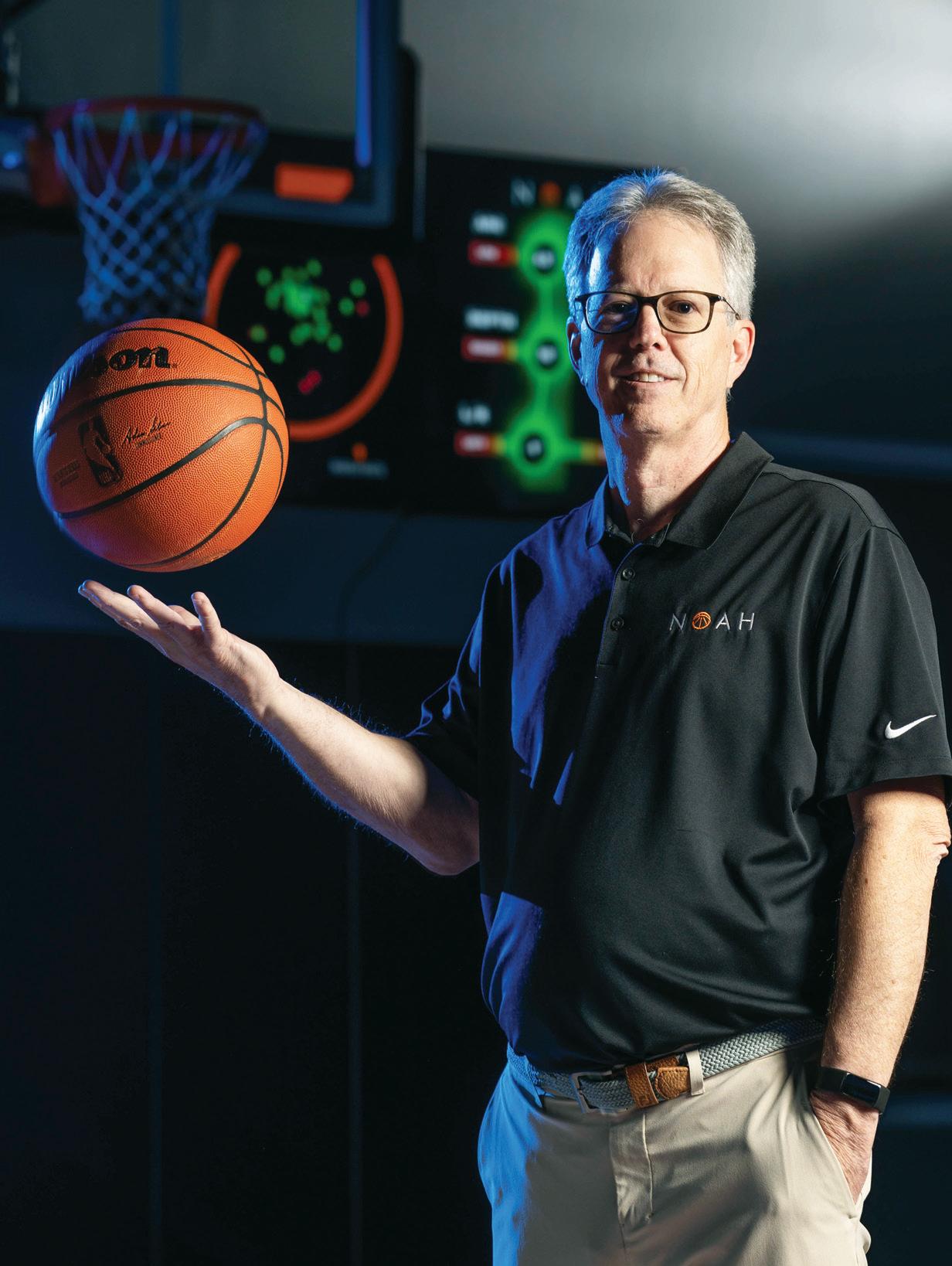
HIGGINBOTHAM

Longtime UAB Blazers head basketball coach Gene Bartow had a simple – though somewhat grammatically incorrect – way of summing up the thin line between success and failure in his chosen sport.
“Well, there’s no doubt, if you don’t shoot good you don’t look good,” Bartow often said in his folksy manner.
Indeed, while rebounding, passing and defense are all important components of the game, the bottom-line goal of basketball is to put the basketball in the goal. And for more than 20 years, Alabama native John Carter has been utilizing technology to help players become better shooters though the Noah Basketball System.
The original concept of Noah Basketball was to employ computer sensors and data to analyze and adjust the arc that players put on their shots in an effort to improve their shooting percentage. The company name is a play on words in reference to the biblical Noah, who Carter said had “the perfect arc.”
The idea began in the early 2000s with a California physicist and venture capitalist named Alan Marty, who simply wanted to help his high school-aged daughter with her shooting. But Carter took Marty’s design and set out on a fastbreak with it. Two decades later, the Noah Basketball system is now used by 28 of the 30 teams in the NBA and several in the WNBA, along with more than 200 college programs and more than 1,000 highschool teams.
“I pinch myself occasionally, because I’m just a guy from Elkmont, Alabama, who loves basketball and engineering, and now I have NBA coaches who want to talk with me,” Carter says with a chuckle.
That certainly was not the case initially, as the company scuffled along for several years while trying to gain widespread acceptance. In fact, Carter says some of the coaches he talked to in those early days were downright “rude” in their rejections.
“The resistance we received was strong,” Carter says. “The most common quote I got was, ‘You can’t use a computer to teach a player to shoot a basketball.’ And I’d say about 80% of the players didn’t like it either.”
But Carter gradually gained converts as the system proved to be successful in improving a team’s shooting percentage. One of the earliest was current Samford head coach Lennie Acuff, who was head coach at the University of Alabama in Huntsville from 1997 to 2019.
“John showed up and said he had this machine that can tell you the perfect arc for a basketball shot,” Acuff recalls. “He seemed like a really nice guy, so I said we’d try it. Then he wheels in this big machine that looked like an old jukebox.
“I felt like we were kind of his guinea pigs for what he was trying to do. Then the next thing I know, everything he was saying was working. It was giving kids immediate data-driven feedback, and they became better shooters.”
Still, the system had limitations, and success was hardly a slam dunk. But things changed dramatically in 2017 when Noah Basketball began analyzing shots with depth sensors, the types that are used in driverless cars and other robotic devices.
“That was huge, because instead of only being able to track a free throw or a straight-ahead shot, now we were able to track every shot on the floor,” Carter says. “And not only could we track the trajectory (arc), but we are able to track the position

within the rim (depth) as well as how far the shots went to the left or right.”
Carter and his small team took this new product to the annual MIT Sloan Sports Analytics Conference in Boston. Officials there were so impressed that Noah Basketball won first place in both the research category and the startup company competition.
“We went from having a couple of NBA teams interested in us to suddenly having NBA teams all over us,” Carter says. “That really was almost a relaunch for the company.”
Since then, Noah Basketball has expanded its ability to monitor shots, as well as the type of data it produces. The company now uses facial recognition technology, eliminating the need for players to wear sensors or outside parties to enter data. In addition, the former “jukebox” machine has been reduced to a single sensor that easily can be attached to a backboard.
The system has become so advanced that a coach can use an app to access video of every shot a player has taken, then filter it to show only shots that were missed in a certain way (i.e., to the left, off the back rim, etc.). “So, the coach can get with a player and have all that data and those videos filtered immediately, and they can go over it together,” Carter says.
Of course, there are still plenty of old-school coaches who might resist the thought of putting so much computerized data into a sport that often relies on instincts and split-second decision making. Acuff, who is 60, says he doesn’t want players “to have paralysis by analysis.”
“I don’t want our guys to be so analytical they become robots,”

Acuff says. “But this is really something you use more in workouts. What you’re trying to create is muscle memory. If you do it often enough, you automatically know it. So, it becomes more of a teaching mechanism. If you really buy into the numbers and figure out consistency of arc, consistency of depth, it works.”
Plus, as Carter points out, “We now have a whole generation of players who grew up with technology in their pockets. So, they expect data and apps and computers in almost everything they do.”
The growth of Noah Basketball has enabled the company to move into a 12,000-square-foot facility in Madison that includes an indoor basketball court (previously, the company had to reserve space at local gyms to test its products). Carter says Noah now has more than 20 full-time employees, most of whom have some sort of basketball-playing experience in their background.
And perhaps most importantly, Noah Basketball has collected data from more than 600 million basketball shots over the years.
“After all that, we know the answers of what leads to good shooting and what leads to poor shooting,” Carter says. “So, we can quickly diagnose what the problem is, and then they can go back and work on those. If you have the answers to the test, you’re a pretty smart person.”
And in turn, you’ll look pretty good on the basketball court.
Cary Estes and David Higginbotham are freelance contributors to Business Alabama. Estes is based in Birmingham and Higginbotham in Decatur.
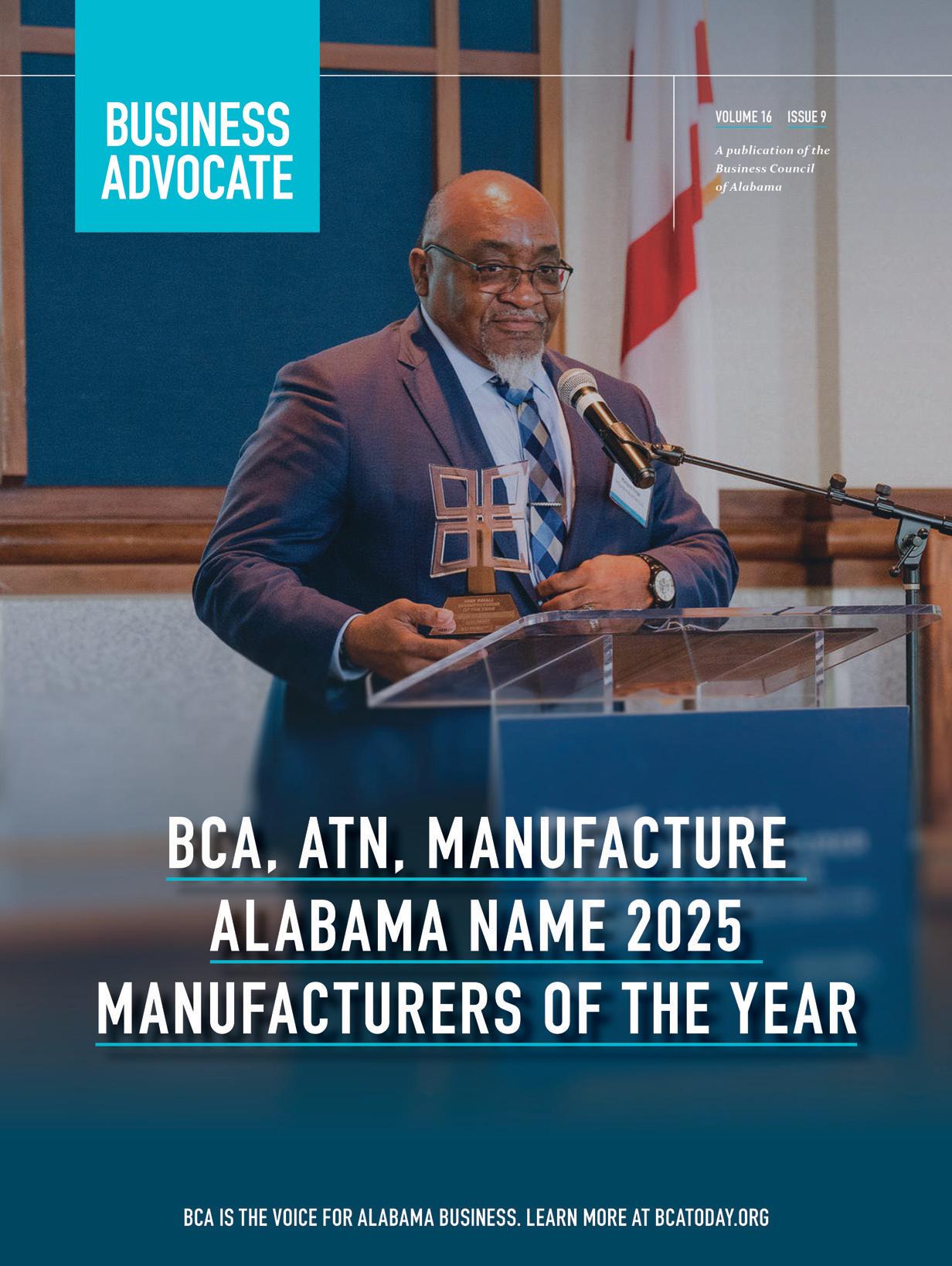
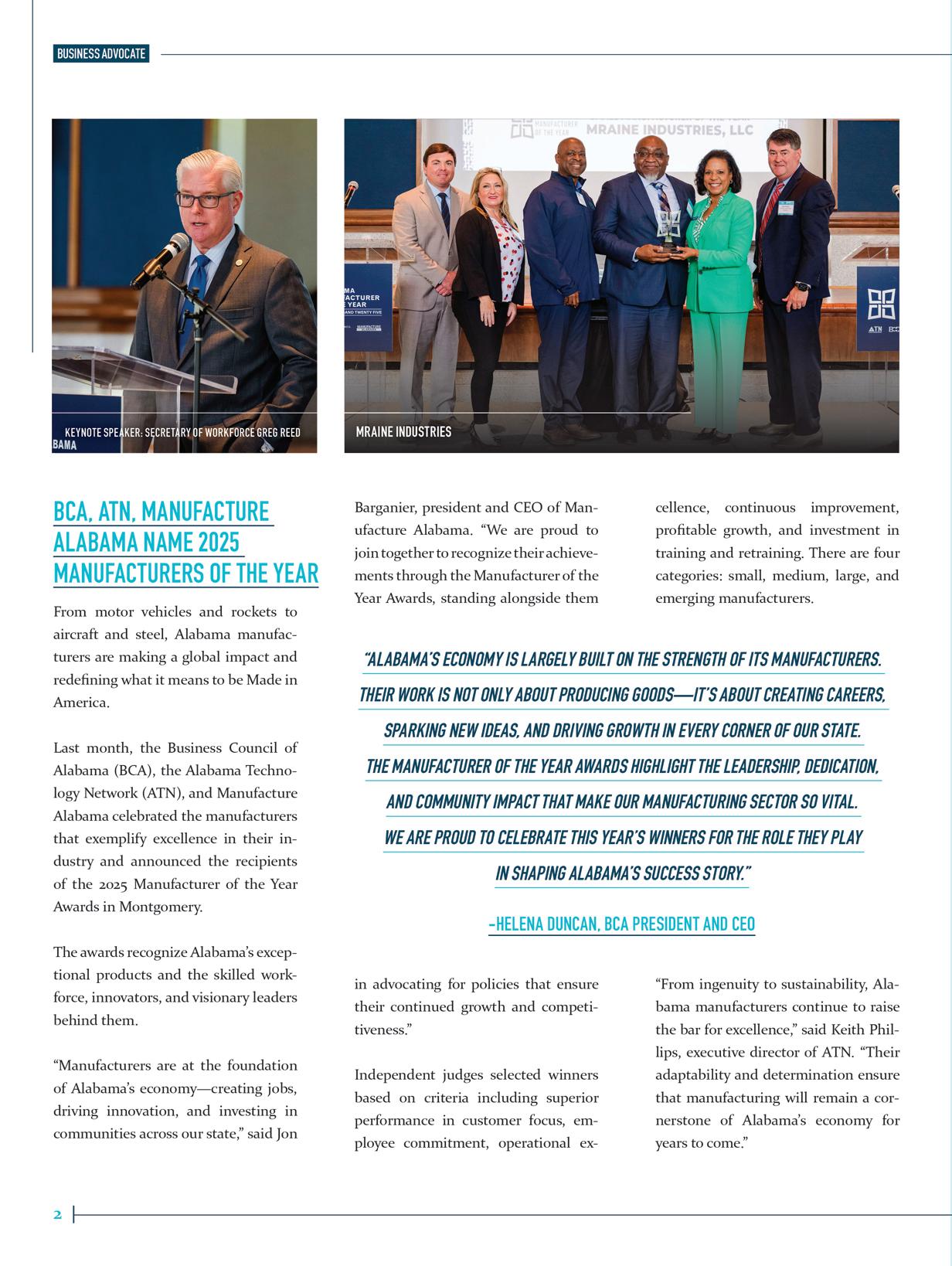
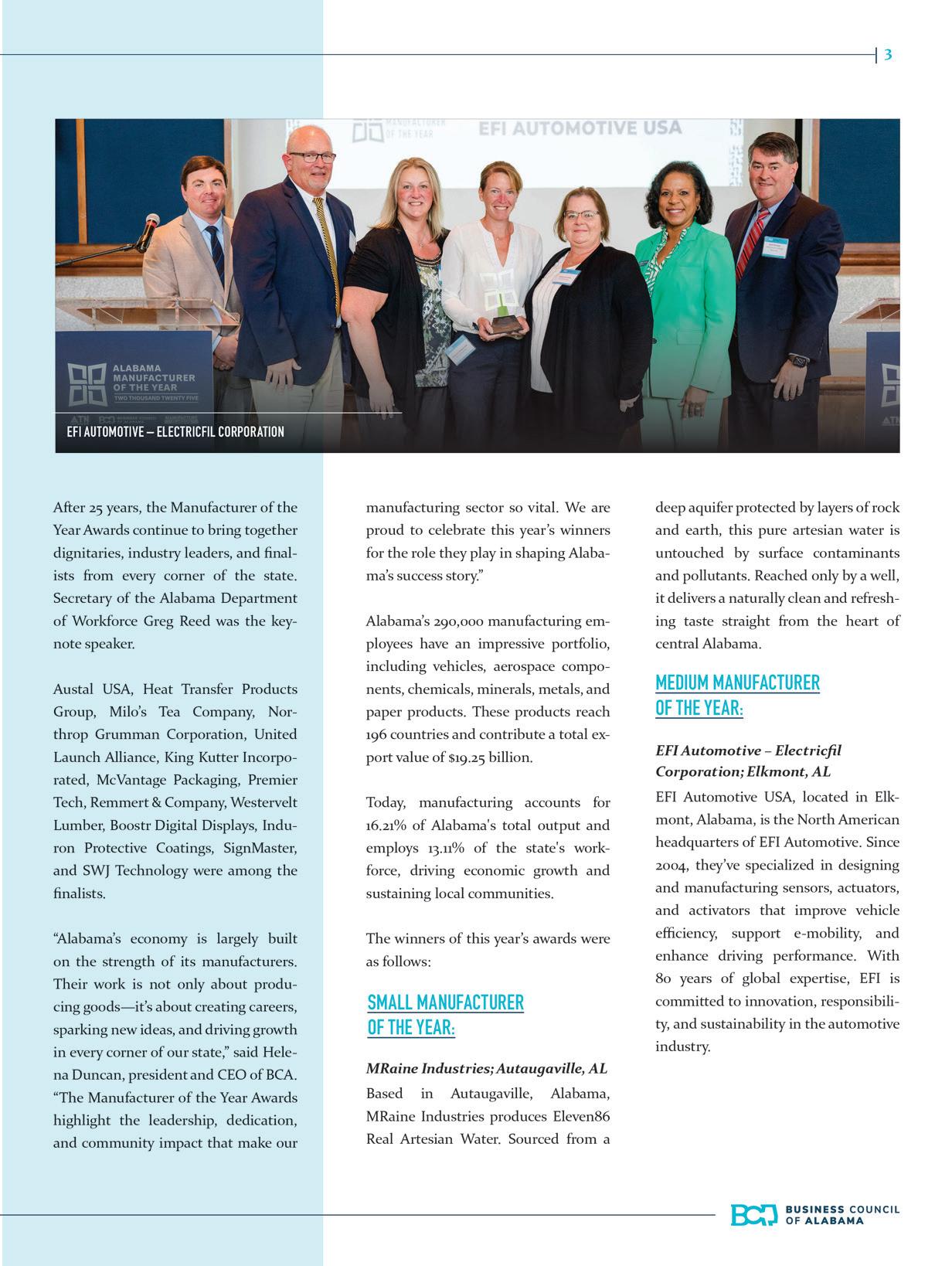
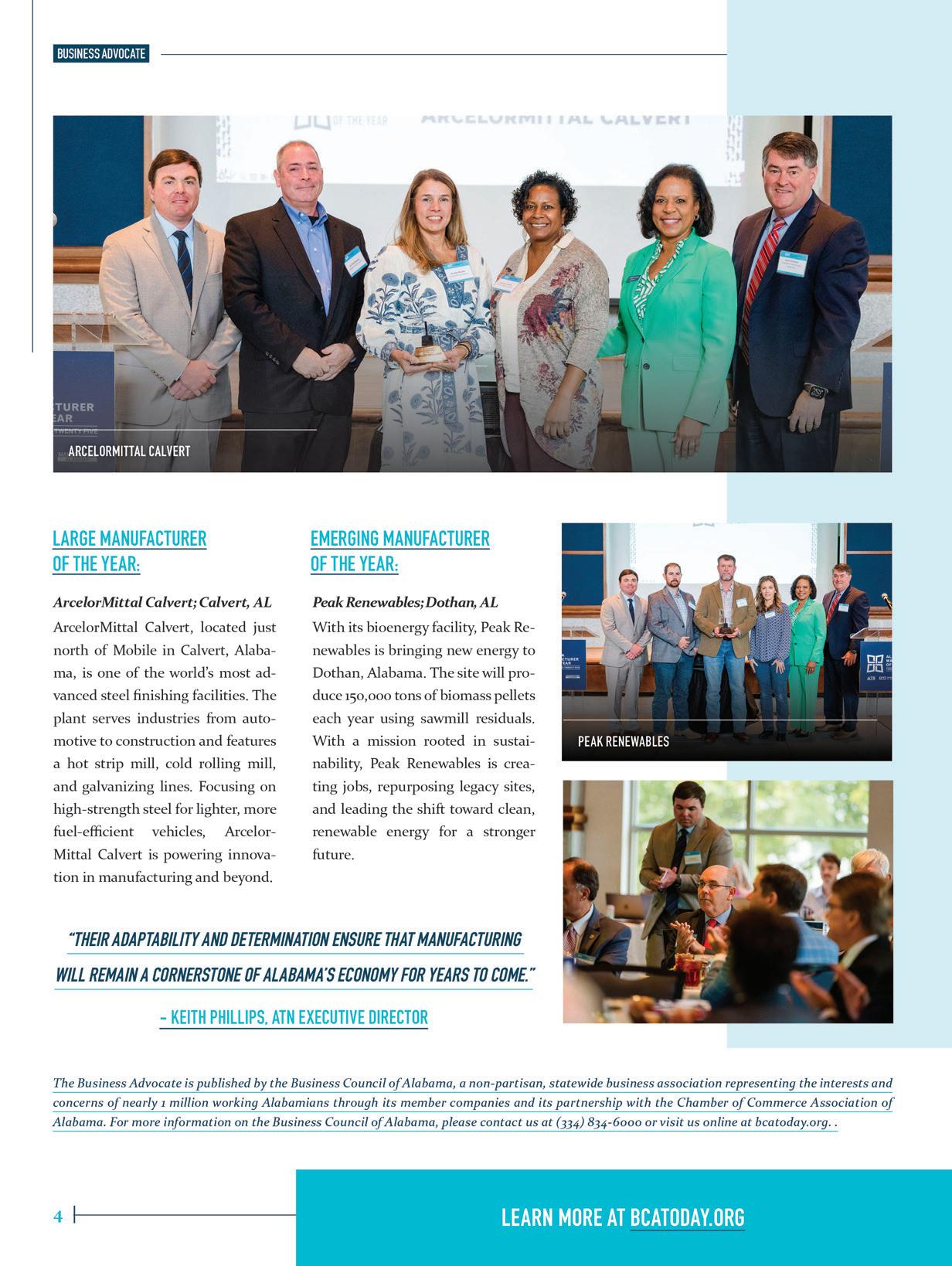

Photos by DAVID HIGGINBOTHAM
About four years after a floating guide wall on the lock at Wilson Dam sank, the Tennessee Valley Authority in September took local news media aboard its Tugboat Freedom to see the repairs and visit the power generation facilities at the dam, which is 100 years old this year.
The guide wall sank Aug. 31, 2021, during storms related to the remnants of Hurricane Ida.



Damage to the lock resulted in lengthy delays for river traffic, which ordinarily amounts to some 11 million tons of goods annually.
Beginning in May, TVA created a temporary wall made from three ocean-going spud barges. Though temporary, the wall is expected to last up to 10 years.
TVA provided construction management oversight with its Equipment Support Services Group providing boat services during positioning and installation. The U.S. Army Corps of Engineers will manage lock traffic.
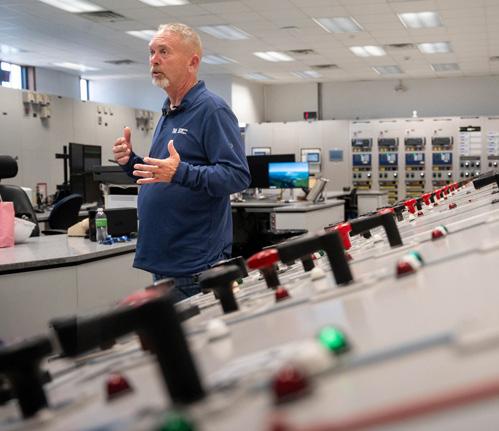
TOP: One of the crew members of the TVA Freedom. The tugboats in TVA’s fleet are responsible for transporting valuable assets up and down the Tennessee River.
by KATHERINE MacGILVRAY

Located in northeast Alabama, Jackson, Marshall, DeKalb and Cherokee counties benefit from their proximity to several major metropolitan areas — Cherokee County is equally distanced between Atlanta, Birmingham and Chattanooga — as well as the thriving manufacturing environment of the Huntsville/Madison County area. Access to key transportation routes, including major interstates and highways, Tennessee River port, rail connections and airports also play an important role in supporting local industry.
“We are seeing increasing overlaps in our local economy with the two growing markets of Huntsville and Chattanooga,” says Dr. Brett Johnson, director of the DeKalb County Economic Development Authority. “Manufacturers, retailers and home builders are seeing the northeast Alabama corridor as a prime location for low-cost, high-quality living leading to higher returns on economic and workforce investment. From the mountains and valleys to the interstate and railways, our region continues to be the proven place for business.”
Strong secondary and post-secondary workforce development programs help fuel the workforce in the region.
DeKalb County will soon be home to a $40 million Career Technical Education Facility thanks in part to $18 million from the Alabama Career and Technical Education Facilities Grant Program. The 95,000-square-foot facility will offer programs in cybersecurity, advanced manufacturing and business with multimedia marketing.
Northeast Alabama Community College celebrated the launch of a new Entrepreneurial Center in Rainsville earlier this year. The E-Center will boost economic development in DeKalb and Jackson counties and surrounding areas by providing office and

collaborative workspaces as well as access to mentors, funding opportunities and workshops.
Last fall, Snead State Community College celebrated the opening of a Workforce and Career Institute located between Albertville and Guntersville. It offers skills training in industrial systems technology, HVAC/R, machine tool technology, welding and additive manufacturing as well as short-term non-credit workforce development opportunities.
Gadsden State Community College’s 2+2 Poultry Science
Madison County: $83,528
Baldwin County: $75,019
Morgan County: $64,858
Jefferson County: $64,589
Blount County: $61,096
Marshall County: $60,946
Montgomery County: $58,153
Mobile County: $58,119
Etowah County: $53,070
DeKalb County: $51,149
Cherokee County: $50,769
Jackson County: $49,454
Program prepares students to work in the state’s most profitable agricultural industry. Students enrolled in the partnership program complete their core curriculum as well as an introductory agriculture class at Gadsden State Cherokee before transferring to Auburn University to complete a bachelor’s degree.
The surrounding foothills of the Appalachian Mountains and the Tennessee River offer an abundance of outdoor recreation opportunities that are a major draw for tourism. Lake Guntersville in Marshall County is a world-renowned bass fishing destination
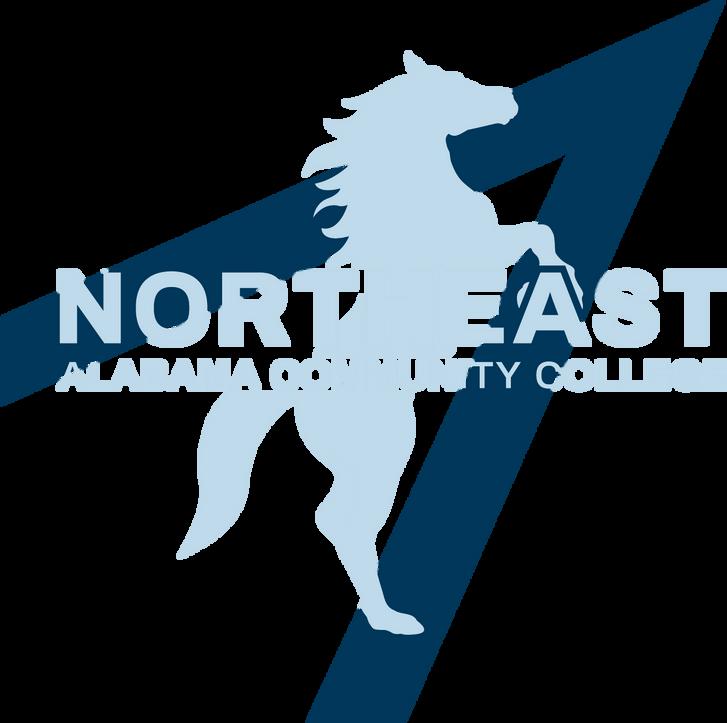
POPULATION Total Alabama Population: 5,157,699
Jefferson County: 664,744
Madison County: 423,355
Mobile County: 412,339
Baldwin County: 261,608
Montgomery County: 225,894
Etowah County: 103,207
Marshall County: 102,156
DeKalb County: 72,569
Blount County: 60,163
Jackson County: 53,780
Cherokee County: 26,138
and Lake Weiss in Cherokee County is known as the “Crappie Fishing Capital of the World.” Jackson County has more caves per square mile than any other county in the country, and DeKalb County is home to two state parks, DeSoto State Park and Buck’s Pocket State Park, and one national preserve, Little River Canyon.
Katherine MacGilvray is a Huntsville-based freelance contributor to Business Alabama.




Builders Supply Co. broke ground on its $10.6 million, 23,000-square-foot manufacturing facility in Fort Payne in September 2024.
CARPET / RUG
MANUFACTURING / FLOORING
Tufted rug manufacturer Maples Industries Inc. operates four facilities in Scottsboro and is a leading employer in Northeast Alabama.
In Bridgeport, Engineered Floors manufactures residential and commercial flooring products, and Mohawk Industries, a global leader in the flooring industry, operates a facility that produces carpet fibers.
In Scottsboro, Ohio-based Sanoh America Inc. manufactures automotive brake tubing, fuel tubing and chassis tubing, and PHP Fibers produces nylon yarns used in airbags.
KTNA, in Hollywood, produces acoustical products and carpeting.
Other top employers in Jackson County include commercial refrigeration unit manufacturer HTPG Inc.; Smurfit WestRock, which manufactures containerboard liners and flutings for corrugated board and packaging; industrial plastics producer Polymer Industries; Lozier Corp., which produces retail store fixtures; and USG Corp., which manufactures gypsum products.
Marshall County leads the state in poultry processing, and the industry accounts for half of the top 10 employers in the county. They include Pilgrim’s Pride, Farm Fresh Foods, AlaTrade Foods, Wayne Farms, Tyson Foods Inc. and OK Foods.
AUGUST 2025: Advanced Displays, a leading distributor of Lozier’s shelving systems, opens a 300,000-square-foot distribution center, providing faster service, lower freight costs and better logistics for its customers.
APRIL 2025: Fast Pace Health opens a walk-in urgent care clinic that will provide urgent, primary and preventative
care services to Scottsboro and the surrounding communities.
FEBRUARY 2025: Citizens Bank & Trust breaks ground on a second location in Scottsboro.
NOVEMBER 2024: Renovations begin on the Jackson County Courthouse, including shoring up the foundation, repairing the
roof, replacing portico slabs and exterior features, renovating the public restrooms and adding new stairs and a wheelchair lift. The county also will relocate several courthouse offices to the Jackson County Courthouse Annex.
AUGUST 2025: Marshall Medical Centers is awarded the Rural Residency Planning
3.5%
2.5%
1.5%
2%
2%
Tourism in Marshall County centers on Lake Guntersville, a renowned destination for bass fishing and outdoor recreation.
The Alabama Tourism Department ranked the four-mile Sunset Drive walking trail in Guntersville among the top 25 walking trails in the state, and the city recently completed a new expansion of the trail that goes beneath the River Bridge on Highway 431, making the entire peninsula of Lake Guntersville walkable.
City Harbor, a mixed-use lakefront development with restaurants, retail and event venues, welcomed a new 88-room Home2 Suites by Hilton this year.
Sand Mountain Park & Amphitheater, in Albertville, is a 130-acre venue for sports and entertainment, including a water park, public play areas, a 6,000-seat amphitheater and athletic facilities.
AUTOMOTIVE SUPPLIERS / DIVERSIFIED MANUFACTURING
Marshall County plays a significant role in supporting the automotive industry. TS Tech Alabama manufactures automotive seating at its Boaz facility, and in Albertville, Newman Technology produces door sashes and exhaust components for Honda Alabama Auto Plant.
Diverse manufacturing companies also are among the county’s top employers. They include ColorMasters, which specializes in flexible packaging for a variety of industries; Mueller, a fire hydrant manufacturer; Progress Rail, a subsidiary of Caterpillar that supplies locomotive, freight car and infrastructure solutions and technologies for the global rail industry; and Atrion Medical Products, which develops and manufactures medical devic-
es for the ophthalmic, pharmaceutical and biotech industries.
Marshall County continues to develop its aerospace sector. Ace Aeronautics, a full-service contractor for rotary-wing aircraft with a strong focus on Black Hawk helicopters, is headquartered in Guntersville and has doubled in size in recent years. Last fall, the company partnered with the Aviation Department at Snead State Community College to offer students apprenticeships, jobs and hands-on experience in the high-demand industry.
Diverse manufacturing is the leading industry in DeKalb County. Heil Environmental, a manufacturer of refuse collection vehicles, has its flagship plant in Fort Payne; PlayCore (formerly GameTime), a leading manufacturer of commercial playground equipment, has its Southern Fulfillment Center in Fort Payne; and Vulcraft operates one of its seven steel joist manufacturing facilities in Fort Payne. The city also is home to GH Metal Solutions, a full-service metal fabrication supplier.
For the automotive industry, the Moriroku Technology North America Rainsville Plant and Plasman Corp., in Fort Payne, manufacture injected plastic parts.
The Children’s Place Retail Stores operates a 700,000-square-foot automated distribution center, and Ferguson Enterprises, a plumbing supplier, has a 645,000-square-foot distribution center.
Tourists are drawn to DeKalb County for its outdoor recreation opportunities, and it has been getting some national attention. The county is home to two state parks, DeSoto State Park and Buck’s Pocket State Park, as well as the Little River Canyon National Preserve, which was recently featured on USA Today’s list of “most breathtaking views in the South.” In fact, the three parks make up 36% of Alabama’s protected lands within a 50mile radius.
POULTRY
Like Marshall County, DeKalb is one of the state’s top poultry processing counties. Koch Foods operates a processing plant and two hatcheries, and Pilgrim’s Pride also operates a production facility in DeKalb County.
AGRICULTURE
Top agribusiness employers in Cherokee County include Weiss Lake Egg Co., a family-owned egg production facility; Cherokee Milling Co., a grain and feed mill; and two wholesale greenhouses, Dixie Green and Sawyer Nursery.
The county also is home to the Cherokee Gin & Cotton Co., one of the largest cotton gins in the Southeast. It serves Northeast Alabama and Northwest Georgia.
The tourism industry in Cherokee County centers on Weiss Lake. Known as the “Crappie Fishing Capital of the World,” it also offers year-round bass fishing. Other outdoor recreation destinations include
and Development Program Grant from the Health Resources and Services Administration, a division of the U.S. Department of Health and Human Services, to support planning and developing a new rural residence program to grow the physician workforce in medically underserved areas.
JULY 2025: The city of Albertville breaks ground on Alleyway Entertainment, a 30,000-squarefoot family-friendly fun center that
includes bowling, axe throwing, bumper cars, a virtual reality arcade, 5D theaters, a restaurant and private party rooms.
MAY 2025: Work begins on Sand Mountain Marketplace, a 250,000-square-foot development in Albertville that will include Target, Academy Sports + Outdoors, HomeGoods and Burlington, along with restaurants and additional stores.
JANUARY 2025: Guntersville City Schools celebrates the opening of the new Guntersville High School, a 140,000-square-foot, $54 million building. Plans are underway to add a new sports arena and auxiliary gym to the high school campus.
JULY 2025: The town of Mentone celebrates the opening of Legionnaire Park. The park, located behind the American
Legion Post 215, features a fenced-in picnic area and a grill.
JUNE 2025: The DeKalb County Commission gives preliminary plat approval for Mentone Acres, a 27-lot planned subdivision located off County Road 641. The project also includes 4,000 feet of new road.
MARCH 2025: Gov. Kay Ivey announces $600,000 in grants to support projects to upgrade
Maples Industries
600 employees • Bath rugs
HTPG
550 employees • Refrigeration units
Lozier Corp.
444 employees • Store fixtures
WestRock
416 employees • Corrugated paperboard
Polymer Industries
266 employees • Industrial plastics
Engineered Floors
250 employees • Hardwood flooring
Sanoh America
247 employees • Automotive brake lines
U.S. Gypsum Corp.
216 employees • Gypsum wall board
Mohawk Industries
190 employees Carpet backing
Pilgrim’s Pride
1,614 employees • Poultry processing
Farm Fresh Foods
1,613 employees • Poultry processing
Indian Mountain ATV Park in Piedmont, which has 4,700 acres for OHV trail riding, camping, fishing and hiking; and for the more daring, Cherokee Rock Village is a destination for rock climbing, bouldering and rappelling. The park also is popular for hiking, camping and bird watching and has an observation deck,
Mentone’s water system and repurpose the Moon Lake Elementary School into a business and community center.
SEPTEMBER 2024: Builders Supply Co. breaks ground on a $10.6 million manufacturing facility in Fort Payne. The familyowned business provides custom concrete blocks, lumber, pallets, crates, trusses, plumbing and electrical supplies to contractors and do-it-yourself homeowners.
AlaTrade Foods
1,094 employees • Poultry processing
Wayne Farms
950 employees • Poultry processing
Tyson Foods Inc.
927 employees • Poultry processing
Colormasters
832 employees • Food packaging
TS Tech Alabama 615 employees • Automotive supplier
Emmaus Foods 529 employees • Poultry processing
Mueller 500 employees • Fire hydrants
Heil Environmental 900 employees • Garbage truck bodies manufacturer
The Children’s Place 800 employees • Distribution center
JCG Foods of Alabama/Koch’s 800 employees • Poultry processing
Moriroku Technology North America 496 employees • Injected plastic automotive parts manufacturer
pavilion and playground.
KTH Leesburg Products is Cherokee County’s top manufacturing employer. The company produces welded steel frame components for the state’s automotive
SEPTEMBER 2025: Cherokee County Schools celebrates the opening of a new Cal Ripken Sr. Foundation STEM Center at Sand Rock School. The new after-school learning space provides hands-on STEM education to local students and is made possible through the support of the Cal Ripken Sr. Foundation and the Tennessee Valley Authority.
Renfro Corp.
486 employees • Textile hosiery
PlayCore
450 employees • Playground and park equipment manufacturer
GH Metal Solutions Inc.
367 employees • Plate/sheet metal fabrication manufacturer
Nucor-Vulcraft
344 employees • Fabricated structural metal manufacturer
Plasman Corp.
337 employees • Injected plastic automotive parts manufacturer
KTH Leesburg Products 464 employees • Honda automotive parts
American Apparel 228 employees • Military outerwear
Pemco International 85 employees • Porcelain and enamel frits
Dixie Green Inc.
47 employees • Wholesale greenhouse
Cherokee Gin & Cotton Co. 45 employees • Cotton ginning
Sources: Local economic development officials
industry and was named Large Manufacturer of the Year in 2024 by the Alabama Automotive Manufacturers Association. American Apparel manufactures combat and utility uniforms for the military and is the county’s second-largest employer.
MARCH 2025: The Alabama Department of Economic and Community Affairs awards the Cherokee County Sheriff’s Office a $200,000 grant to establish a professional crisis intervention team. The funds will support a CIT officer, necessary equipment and provide CIT training to law enforcement personnel.
MARCH 2025: A new Women’s Imaging Suite opens at the Atrium Health Floyd Cherokee Medical
Center in Centre, offering easier access to mammograms for women in northeast Alabama.
NOVEMBER 2024: KTH Leesburg Products, a manufacturer of welded steel frame components for the automotive industry, is named Large Manufacturer of the Year by the Alabama Automotive Manufacturers Association.
Source: Economic developers


Northeast Alabama Community College (NACC), located at the Jackson-DeKalb county line near Rainsville, has celebrated some record enrollment numbers in 2025. This fall, NACC saw its highest enrollment to date with more than 3,500 for-credit students.
In the spring, the college also saw a record number of high-school students taking advantage of its popular dualenrollment program, with nearly 1,600 students registered, and 1,800 dualenrollment students registered for the fall 2025 semester. Most dual-enrollment courses at NACC are tuition-free and credits transfer easily to any public university in Alabama. Additionally, NACC provides loyalty scholarships for dual-enrollment students when they finish high school, offering $500 for completing 13-23 dual enrollment hours and $1,000 for completing 24 or more hours.
Beginning in January, NACC is adding two new health care programs — diagnostic medical sonography and medical laboratory technology.
The college also received a $3 million appropriation from the Alabama Legislature to implement services for rural health care in North Alabama, and part of the funding is being used to upgrade the school’s technology laboratory to house the two new programs.
Early this year, the college launched its Entrepreneurial Center in Rainsville, offering office space, mentors, workshops and funding opportunities.
NACC, in partnership with the town of Mentone, began offering courses at
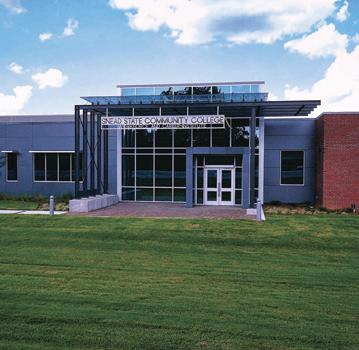
writing, music appreciation, vocal ensemble and English 101.
NACC athletics continues to grow, and the school supports men’s and women’s golf, cross country and track, plus men’s soccer, women’s softball and esports. A new softball stadium and training facility opened in November 2024, and construction is underway for a new soccer field.
With 381 employees, NACC is one of DeKalb County’s top employers.
SNEAD STATE COMMUNITY COLLEGE
Snead State Community College is located on a 45-acre campus in Boaz and serves students in Marshall, DeKalb, Blount and Etowah counties and the surrounding areas. The school has 2,900 students enrolled and offers 11 associate in applied science degrees and certificate programs, including a new additive manufacturing program, that are designed to be fully completed at Snead State. The school also offers more than 60 associate in science degree programs for students who plan to go on to pursue a bachelor’s or higher degree.
In addition to its main campus in Boaz, Snead State also operates the Alabama Aviation College in Albertville, which offers degrees in airframe technology and power plant technology, and the Arab Instructional Site.
In September 2024, the college celebrated the opening of a Workforce and Career Institute. The 50,000-square-foot facility, located between Albertville and Guntersville, will offer skills training in industrial systems technology, HVAC/R, machine tool technology, welding and
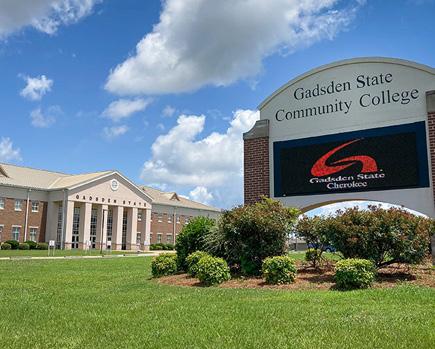
additive manufacturing. It also will offer short-term, non-credit workforce development opportunities.
GADSDEN STATE CHEROKEE
In July, Gadsden State Community College held a special celebration in recognition of the school’s Cherokee Campus and the role it has played in the college’s 100-year legacy.
Gadsden State’s Cherokee Campus opened in 2002 in response to community and government efforts to address growing educational needs in the region.
The 4,000-square-foot leased facility in Centre was Gadsden State’s first standalone instructional site in Cherokee County and offered evening classes in computer science, mathematics, biology and the humanities. In 2008, the Cherokee Campus relocated to its current 85,000-square-foot multi-level complex and expanded its course offerings for students pursuing an associate degree or looking to transfer to a four-year institution. The school offers associate degrees, university transfer pathways, a standalone Registered Nursing program and a variety of workforce and adult education programs.
The school’s 2+2 Poultry Science Program prepares students to work in the state’s most profitable agricultural industry. Students complete their core curriculum as well as an introductory agriculture class at Gadsden State Cherokee before transferring to Auburn University to complete a bachelor’s degree.
The Gadsden State Cherokee facility also houses some offices of the Cherokee County Chamber of Commerce and a 2,500-seat arena.

LEIGH DOLLAR is mayor of Guntersville, recently reelected for a fourth term. Dollar is a University of Alabama graduate and a CPA. She is a past president of the Alabama League of Municipalities and a graduate of Marshall County Leadership Challenge and Leadership Alabama. Active with the Lake Guntersville Chamber of Commerce and many civic organizations, she is a board member and past board chairman of Marshall County Gas District.

SANDY GOFF has served as the executive director of the Rainsville Chamber of Commerce since 2016. In addition to overseeing the day-to-day operations of the chamber, she assists in planning key events such as the Annual Banquet, Administrative Professionals Day Luncheon and the Annual Scholarship Golf Tournament. She also helps coordinate city events, including the Halloween Spook-Tacular, the Rainsville Christmas Parade and Christmas at the Tom Bevill Center. Beyond her chamber responsibilities, Goff has been a consultant to developers of affordable housing for more than 25 years and been instrumental in the development of more than 30 housing projects across the state of Alabama.
KADE GRIFFITH is an agri-intelligence technician at Helena Agri Enterprises in Centre. Griffith earned an associate degree at Northeast Alabama Community College and a bachelor’s degree in crop, soil and environmental sciences at Auburn University. Griffith is an active member

of Auburn University Young Farmers and served as vice chairman. He also is an active member of Jackson County Young Farmers and serves as treasurer.

TRACY HONEA recently was re-elected to his fourth term as mayor of Albertville and is a lifelong resident of the city. Honea is a graduate of Marshall County Leadership Challenge and has served on several local boards and commissions, including the Albertville Board of Education, Albertville Chamber of Commerce board of directors, United Way of Marshall County board of directors, the Albertville Commercial Development Authority, and, currently, the Marshall County Gas Board.

BRETT JOHNSON is executive director of the DeKalb County Economic Development Authority. Johnson is a former member of the Boaz City Board of Education, Boaz Housing Authority Board of Commissioners and Gadsden Planning Commission. He also teaches American government as an adjunct faculty member at Jacksonville State University and other Alabama community colleges. He earned a Ph.D. in leadership from the University of the Cumberlands and an MPA and B.A. in political science and communication from Jacksonville State University.

JOHN-PAUL LAMBERT is president of Lambert Inc., a full-scale, heavy civil contractor based in Stevenson. Lambert is a graduate of Pisgah High School and attends Kash Creek Community Church. He also serves as adjunct instructor for Northeast Alabama Community College’s heavy equipment operator program.

ZACH LEE is chair of the Guntersville Industrial Development Board, leading the city’s economic development activities. A native of Guntersville and graduate of the University of Alabama, Lee is the regional external affairs liaison for the Alabama Community College System. He previously served in several state positions and has broad experience in workforce development. He’s a graduate of the Delta Regional Leadership Academy and Marshall County Leadership, and he serves on the board of Marshall County Manufacturers Association.

RICH LINDSEY JR. is a partner and manager of Cherokee Gin & Cotton Co., the state’s largest producing cotton gin; a partner of Coosa River Land Co., a 4,000-acre row-cropping operation; and a partner of Alexis Farms LLC, a five-house poultry operation. Lindsey also is a 22year veteran of the McCord’s Crossroads Volunteer Fire Department and has served as chief for the last 14 years. Additionally,
he serves as director to the Southeastern Cotton Ginners and National Cotton Ginners associations, is an alternate director to the Alabama Association of Volunteer Fire Departments and currently chairs the Cherokee County Association of Volunteer Fire Department’s Radio Communications Committee.

JENNIFER MCCURDY is the director of the Northeast Alabama Community College Entrepreneurial Center and previously served as director of the Fort Payne Chamber of Commerce. McCurdy holds a B.A. in health services administration from Auburn University. She also has earned the Economic Development Association of Alabama Leadership Institute Certification and the Intensive Economic Development Training Course Certification from Auburn University Government and Economic Development Institute. She serves on the Boom Days Committee for the city of Fort Payne, is a trustee for THRIVE Regional Partnership, a past board member for Leadership DeKalb and currently is participating in the ACCS Economic Development Academy.
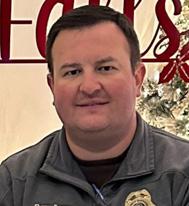
SHAWN ROGERS serves as the director of the Emergency Management Agency and 911 administrator for Cherokee County. Rogers has held prominent statewide leadership roles, including president of the Alabama Association of 911 Districts, chair of the Alabama State 911 Legislative Committee and president of the North Alabama Emergency Management Mutual Assistance Association. Nationally, he was appointed
to the FirstNet Authority Emergency Management Cohort, contributing to broadband integration in emergency services.

DANIEL STEELE serves as county administrator for Cherokee County. He is a graduate of Gaylesville High School and of Shorter University, where he earned a degree in business administration. Steele also serves as executive director of the Cherokee County Industrial Development Authority and is a member of the Gaylesville Town Council.
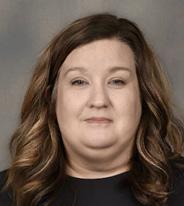
KAREN SUGGS is project manager at the Jackson County Economic Development Authority. She also serves on the University of Alabama Geological Sciences Board, Junior Leadership Jackson County, the IMPACT Learning Center board, the Launch 2035 Land Use and Infrastructure Committee and the Jackson County United Givers Fund board and is a member of the Scottsboro Rotary Club. Suggs earned a master’s degree in geological science with a concentration in geochemistry from the University of Alabama and a graduate certificate from Auburn’s Government & Economic Development Institute.







The Highlands Medical Center (HMC) in Scottsboro is part of the Huntsville Hospital Health System and operates a 170-bed hospital that offers a variety of emergency, inpatient and outpatient services. It also provides services through several related facilities across the community, including two rehabilitation and long-term care nursing homes. HMC supports more than 800 jobs and is one of the top employers in Jackson County.
In July, HMC, in partnership with Northeast Alabama Community College, offered a free six-week certified nursing assistant (CNA) course in the hopes of bringing more trained CNAs to rural parts of Jackson County.
This summer HMC also implemented EasyConnect Jaguar, an interface engine designed by iatricSystems that streamlines the transfer of data between health care systems, and added three new upgraded ambulances to its fleet.
Marshall Medical Centers, an affiliate of the Huntsville Hospital Health System, is represented on three campuses in Marshall County.
Marshall Medical Center North, in Guntersville, is a 90-bed acute care facility that serves the northern part of the county and operates a Certified Trauma III Emergency Department. Its sister hospital, Marshall Medical South, in Boaz, is a 150-bed facility and also operates a Certified Trauma III Emergency Department. Wellness facilities at both hospitals offer the latest aerobic equipment, free weights and machines and a variety of classes and are home to the only Olympic-size pools in the county, providing opportunities for the public and therapy patients to participate in aquatic workouts.
The Gary R. Gore Medical Complex, in Albertville, is home to the Marshall Professional Center, which provides outpatient services including wound healing, imaging and rheumatology services, and the Marshall Cancer Care Center, a 22,000-square-foot facility that offers medical and radiation oncology and hematology services.
With more than 1,700 employees, Marshall Medical Centers is among the



county’s largest employers. The medical staff consists of 186 physicians representing 27 specialties.
In August, the Health Resources and Services Administration, a division of the U.S. Department of Health and Human Services, awarded Marshall Medical Centers the Rural Residency Planning and Development Program Grant to support planning and developing a new rural residence program to grow the physician workforce in medically underserved areas.
DeKalb Regional Medical Center, a 134bed hospital in Fort Payne that provides health care services for DeKalb County and adjacent communities in west Georgia, joined the Huntsville Hospital Health System in April 2024. Its services include 24/7 emergency care, women’s and children’s services, orthopedic surgery, cardiac catheterization, diagnostic imaging, geriatric psychiatric care and sleep medicine.
DeKalb Regional is accredited by The Joint Commission and the American College of Cardiology as a primary stroke center and chest pain center. In 2025, the hospital was awarded the Get With The Guidelines Rural Stroke Gold and Get With The Guidelines Stroke Silver
Quality Awards by the American Heart & Stroke Association.
This summer, DeKalb Regional announced that starting in September its Emergency Department will be managed by a new physician group, New Gen, as part of its ongoing efforts to enhance emergency care.
HEALTH FLOYD CHEROKEE
Atrium Health Floyd Cherokee Medical Center, in Centre, is a not-for-profit 50bed hospital that provides emergency care, drug and alcohol treatment, lab work, respiratory care and surgical services.
The hospital is part of the Atrium Health Floyd system, which has locations throughout northwest Georgia and northeast Alabama. Other facilities in DeKalb County include a rural health clinic in Centre that provides immediate and after-hours non-emergency care to patients and a rural health clinic in Piedmont that offers chronic disease management and preventive care services and sick visits for patients of all ages.
In March, the hospital opened a Women’s Imaging Suite that will provide easier access to mammograms for people in northeast Alabama.


Located between Huntsville and Chattanooga, Tennessee, Jackson County benefits from its proximity to five major interstates — I-565, I-65, I-24, I-59 and I-75 are all within a one-hour drive -— and it is served by the CSX, Norfolk Southern and Sequatchie Valley railroads.
In Scottsboro, the county seat, renovations are underway on the Jackson County Courthouse. And three new housing developments, totalling 278 homes, are in progress.
New housing developments also are underway in Scottsboro, including the Jackson Bend Development, planned for 116 single-family homes; the Stone Bridge Development, planned for 150 single-family homes; and Feathered Oaks, which began with 12 homes and has nine more planned this year.
Several road projects wrapped up in 2024-2025, including resurfacing 8.1 miles of streets representing a $1.87 million investment.
The city added three acres to the Scottsboro Municipal Airport site in preparation for future growth and completed an updated airport layout plan for long term development, and the city council recently discussed the addition of a maintenance hangar.
Scottsboro has seen several new retail developments in the past year. Advanced Displays, a leading distributor of Lozier’s shelving systems, opened a 300,000-square-foot distribution center in August. In April, Fast Pace Health Care
celebrated the grand opening of a walk-in urgent care clinic that will serve Scottsboro and the surrounding communities. Alabama Farm Credit opened a new branch downtown in March, and Citizens Bank & Trust broke ground for a second facility in February. Hobby Lobby plans to open a new store in November.
Downtown Scottsboro is a Main Street Alabama-designated community and is moving forward with projects like facade improvements and a pocket park on Peachtree Street that is nearing completion. The downtown district received three awards at the 2025 Main Street Alabama Awards of Excellence event, including the Excellence in Reinvestment Award honoring $5 million in investment to the development of the area.
“The city’s commitment to downtown shows how collaboration and vision can breathe new life into historic spaces, with city leaders standing alongside us every step of the way to support revitalization and growth,” says Julia Whitehead, director of Downtown Scottsboro.
Jackson County is located on the northern shore of Lake Guntersville, a world-renowned bass fishing destination, and the Tennessee River runs nearly through its center. The county is part of the Tennessee RiverLine, a connection of outdoor recreational experiences that stretches 652 miles from Knoxville, Tennessee, to Paducah, Kentucky, and the Singing River Trail, a greenway system that connects Jackson, Marshall, Madison, Limestone, Morgan, Lawrence,
Lauderdale and Colbert counties.
Scottsboro is home to the Ultimate Angler Championship, a bass fishing tournament hosted by Unified Pros and the State of Alabama, and hosted the annual Toyota Bonus Bucks Owners Tournament this October.
“Scottsboro is stepping onto the national stage in a big way,” says Mayor Jim McCamy. “Hosting the Ultimate Angler Championship and the Toyota Owners Series puts our community in front of thousands of visitors and millions in tourism impact. Events like these showcase what makes Scottsboro special while supporting our local economy.”
MARSHALL COUNTY
Marshall County is known for lake living. Guntersville, the county seat, is located on the southernmost end of the Tennessee River and is surrounded by Lake Guntersville, a hub for bass fishing and outdoor recreation and the county’s centerpiece attraction.
The City Harbor welcomed an 88room Home2 Suites by Hilton with a grand opening in May. The mixed-use lakefront development features restaurants, retail and entertainment venues and generated over $800,000 in local revenue for the city in 2024.
The Alabama Tourism Department ranked the four-mile Sunset Drive walking trail among the top 25 walking trails in the state. The city recently completed an expansion taking the trail beneath the River Bridge on Highway 431, making the entire peninsula of Lake Guntersville walkable.
The Guntersville Recreation Center added a splash pad and two ballfields last year. Earlier this year, a $4 million recycling center opened in the city’s public works complex in the Conners Island Business Park. Other projects in the city are wrapping up, including construction of a new Rotary Cabin rental facility that can accommodate more than 90 people, a full renovation of the Senior Center and rebuilding the Kiwanis Pier and Lurleen Wallace Pavilion.
Conners Island Business Park will soon have a new tenant. JST, a Japanese electronic connector manufacturer, announced in December its plans to open a
300,000-square-foot engineering and manufacturing facility and add 80 new jobs.
Guntersville City Schools officially celebrated the opening of the new Guntersville High School in January. Construction on the 140,000-squarefoot, $54 million building began in 2023. Plans are underway to add a sports arena and auxiliary gym to the high school campus.
The city of Albertville broke ground on the Sand Mountain Marketplace in May. The 246,000-square-foot shopping center will be home to Target, Academy Sports + Outdoors, HomeGoods and Burlington along with other retailers and additional outparcel restaurants and stores. In July, the city broke ground on Alleyway Entertainment, a 30,000-square-foot fun center that includes 20 bowling lanes, axe throwing, bumper cars, laser tag, golf simulators, a virtual reality arcade, 5D theaters, a restaurant and private party rooms.
Albertville City Schools celebrated the opening of the Albertville Innovation Academy last fall. It offers high school students hands-on experience and training in 12 career and technical education programs, including additive manufacturing, cybersecurity, health science, precision manufacturing and more.
DeKalb County offers convenient access to major metropolitan areas, including Huntsville, Birmingham, Chattanooga and Atlanta, but with a lower cost of living, and has a healthy workforce pipeline, thanks to advanced training programs offered through Northeast Alabama Community College, DeKalb County Schools and Fort Payne City Schools.
DeKalb County will soon be home to a $40 million Career Technical Education Facility thanks in part to $18 million from the Alabama Career and Technical Education Facilities Grant Program. The 95,000-square-foot facility will replace the current DeKalb County Technology Center that has operated for more than 50 years and will offer programs in cybersecurity, advanced manufacturing and business with multi-media marketing. It also will be home to the DeKalb Fine Arts Academy and an 800-seat auditorium.
In January, Northeast Alabama Com-
munity College celebrated the launch of an Entrepreneurial Center in Rainsville.
Recent road projects in DeKalb County include a $13.7 million bridge replacement on SR-75 over Town Creek at Lakeview that was completed in July and a reconstructed four-mile segment of northbound I-59 between Fort Payne and Hammondville opened in May. Other projects are in progress on I-59.
DeKalb County is home to two state parks, DeSoto State Park and Buck’s Pocket State Park, and one national preserve, Little River Canyon, accounting for 36% of the state’s protected lands within a 50-mile radius in the county. DeSoto State Park opened an upgraded pool house in July that includes changing rooms for visitors and lifeguards and new ADA-compliant walkways. This summer Little River Canyon was featured on USA Today’s list of “most breathtaking views in the South.”
The town of Mentone is set to tackle some quality-of-life improvement projects thanks to two grants totaling nearly $600,000 provided by the Appalachian Regional Commission. A $295,000 grant will support upgrades to the town’s aging water system, and a $300,000 grant will support restoring and repurposing the historic Moon Lake Elementary School into a business and community center.
Other developments in the community include the opening of Legionnaire Park in July, featuring a fenced-in picnic area with a grill.
And in June, the DeKalb County Commission gave preliminary approval for Mentone Acres, a 27-lot subdivision off County Road 641.
Fort Payne, the county seat, has invested $70 million in infrastructure, public safety and quality-of-life initiatives in the past five years.
Currently, the city is undertaking a three-phase comprehensive digital radio system upgrade to modernize public safety communications and support first responders.
The Isbell Field Airport, in Fort Payne, recently completed a repaving project of its runway and taxiways, made possible by funding provided by the Alabama Department of Transportation and the city.
The city will welcome a new Marshalls
and Five Below at the DeKalb Plaza Shopping Center in 2026 with more stores set to follow.
Fort Payne City Schools broke ground on a new Wildcat Arena on the Fort Payne High School campus in March. The facility will host sports plus cosmetology, computer science, a storm shelter and more.
The Fort Payne High School BEAT Center opened in April 2024, with programs in construction electric vehicles and aviation.
Cherokee County was one of the fastest growing counties in Alabama in 2024 with a 1.7% population increase. The county is known for agribusiness, particularly egg and grain processing, and manufacturing. Tourism is driven by natural attractions like 31,000-acre Lake Weiss.
The county recently completed construction of a new courthouse in downtown Centre, the county seat. The two-story building on East Main Street will replace the original 1937 building located on West Main Street. Plans are in place to build a new city hall across the street from the new courthouse.
In March, the Alabama Department of Economic and Community Affairs awarded the Cherokee County Sheriff’s Office a $200,000 grant to establish a professional crisis intervention team (CIT). The funds will support a CIT officer, necessary equipment and provide CIT training to law enforcement personnel. The Sheriff’s Office also opened a new training center in Leesburg this summer.
Also in March, Cherokee County celebrated the opening of a Women’s Imaging Suite at the Atrium Health Floyd Cherokee Medical Center. The Atrium Health Floyd system has managed the hospital in Centre since 2018 and has invested more than $15.5 million in the facility and emergency medical services in Cherokee County.
In September, Cherokee County Schools opened the new Cal Ripken Sr. Foundation STEM Center at Sand Rock School. The new after-school learning space was made possible through the support of the Cal Ripken Sr. Foundation and the Tennessee Valley Authority.
Located along the Tennessee River in Scottsboro, Jackson County Park is a destination for boating and fishing and features a swimming area, walking trails, campsites and rental cabins. In addition to Alabama’s largest lake, Lake Guntersville State Park is home to 6,000 acres of natural woodlands, an 18-hole championship golf course, the Screaming Eagle Zipline, a beach complex and 36 miles of hiking and biking trails. Paint Rock River is a free-flowing tributary of the Tennessee River that offers opportunities for kayaking, canoeing, fishing and wildlife viewing.
In Cherokee County, water recreation opportunities abound. Leesburg Landing hosts many Weiss Lake fishing tournaments; Slackland Beach is a day-use park for fishing, swimming and birdwatching; and Terrapin Creek is a Class I-II recreational stream for familyfriendly canoeing and kayaking. Pirates Bay Waterpark, in Leesburg, overlooks Weiss Lake and has more than a dozen water attractions, including tube slides, body slides, waterfalls and a splash playground.
Lake Guntersville is a world-renowned bass fishing destination, and Scottsboro is home to the Ultimate Angler Championship, a bass fishing tournament hosted by Unified Pros and the State of Alabama. In Cherokee County, Weiss Lake is a 12-month fishery and known as “The Crappie Capital of the World,” and with 14 miles of floatable water, Terrapin Creek is a prime location for spotted, largemouth and redeye bass and fly-fishing.
The 491-acre Graham Farm and Nature Center, an educational outreach location for the Alabama Cooperative Extension System, is a great place to learn about environmental stewardship while enjoying nature through a variety of programs and outdoor activities. Take a stroll along the nature trail at Cornwall Furnace, a 5.5acre park that is home to the first waterpowered cold blast furnace in the country, said to be one of the best preserved in the Southeast. Indian Mountain ATV

Park, in Piedmont, offers 4,700 acres of mountainside trails and tracks for ATVs, UTVs and dirt bikes as well as camping, fishing and hiking. Shady Grove Horse Ranch, near Mentone, has 800 acres of wooded wilderness and miles of picturesque trails that wind atop Lookout Mountain. For the more daring, True Adventure Sports, in Fort Payne, has rappelling, rock climbing, zip lining and even scuba diving.
Part of the roughly 80-mile Appalachian Highlands Scenic Byway runs through DeKalb and Cherokee counties, and a portion of 93-mile Lookout Mountain Parkway passes through DeKalb County. Both offer scenic views and access to nearby attractions. Little River Canyon Nature Preserve is located along the borders of DeKalb and Cherokee counties and is one of the deepest canyon systems east of the Mississippi River and the deepest in Alabama. This summer it was featured on USA Today’s list of “most breathtaking views in the South.” The Little River is notable because it flows for most of its length atop Lookout Mountain. In Cherokee County, Leesburg is home to picturesque Yellow Creek Falls, a 100-foot waterfall that is best accessed by kayak or canoe, and Cherokee Rock Village, a destination for rock climbing, bouldering and rappelling. In DeKalb County, High Falls Park is known for its 35-foot waterfall and a natural rock bridge located at the bottom of the falls.
Located along the Alabama-Tennessee state line in Jackson County, The Walls of Jericho is more than a popular hiking destination — it also offers opportunities for camping, horseback riding, hunting and stream fishing. Pisgah Gorge is known for its scenic waterfalls and serene hiking trails. Jackson County also is home to part of the long-distance Pinhoti Trail before the trail enters Georgia and ultimately connects to the Appalachian Trail. Be sure to catch the sunset over the Tennessee River from the overlook at Weathington Park. The park also has a well-maintained .25-mile loop trail and is an ideal spot for picnics.
Jackson County has more caves per square mile than any other county in the country. Popular destinations include Stephens Gap Callahan Cave Preserve and Neversink Cave Preserve, which both require a permit and specialty rappelling gear, but reward adventurers with stunning views. More accessible caving opportunities include John T. Dolberry Tumbling Rock Cave Preserve, which features more than six miles of surveyed passage, huge column formations and a nearly 400-foot waterfall, and Cathedral Caverns State Park, which has one of the largest cave openings in the world. JC Russell Cave National Monument protects one of the most complete records of prehistoric cultures in the Southeast, and Sauta Cave National Wildlife Refuge protects federally endangered gray and Indiana

bats and offers a variety of recreational activities.
Located atop Sand Mountain, Buck’s Pocket State Park spans DeKalb, Jackson and Marshall counties, has more than 15 miles of hiking trails and is home to the state’s first-ever state park off-highway vehicle trail. DeSoto State Park, on Lookout Mountain, is home to DeSoto Falls and offers a variety of recreational activities and lodging facilities. The park opened a new pool house facility in July.
There are several opportunities to hit the links in Marshall County, including the Lake Guntersville State Park Golf Course, Cherokee Ridge Golf Course, Gunter’s Landing, Brookside Golf Course, Broken Arrow Golf Course, Boaz Golf Club and Big Spring Lake In addition to two 18-hole championship golf courses, Goose Pond Colony Resort, located on the banks of the Tennessee River and Lake Guntersville, is home to lakeside cottages, a lodge, a waterfront campground, a full-service marina, restaurant and beach area.
A few stops along the North Alabama Train Depot Trail are located in Jackson and DeKalb counties. The Stevenson Railroad Depot Museum, Bridgeport Depot Museum & Cultural Center, Scottsboro Railroad Depot Museum and the Fort Payne Depot Museum showcase railroad memorabilia and exhibits that preserve local history.
Located in the historic Joyce Chapel, the Scottsboro Boys Museum pays tribute to the lives and legacy of nine African American teenagers whose pivotal 1930s case turned an international spotlight on race-based injustice in the American South. The Jackson County Heritage Center is dedicated to preserving the history and culture of the county and features the neo-classical Brown-Proctor house built in 1881, the “Sagetown” pioneer village and the 1868 Jackson County Courthouse as well as a genealogy center. Both the Albertville Museum and the Guntersville Museum display local historical artifacts and memorabilia; the Guntersville Museum also includes a permanent Frank Nelson watercolor collection, a natural history collection and a Native American exhibit.
The Arab Historic Village showcases 10 historic buildings preserved with authentic furnishings depicting life in a rural North Alabama community between the 1880s and 1940s.
Fort Payne used to be known as “The Sock Capital of the World,” and the Hosiery Museum pays tribute to that legacy with exhibits showcasing the history of the industry. Also in Fort Payne, the Alabama Fan Club Museum houses personal items and memorabilia spanning the country music group’s more than 50-year career.
The Cherokee Historical Museum, in Centre, includes exhibits about trains, steamboats, canons, quilts and more. The Mentone Arts Center preserves the artistic, musical and cultural heritage of Mentone and the greater Lookout
Mountain area, hosts classes and workshops and has a gift shop and art gallery.
Sample traditional wines as well as sweet muscadine wines and locally sourced sweet fruit wines at Jules J. Berta Vineyards & Winery in Albertville.
Little River Orchard is a small familyowned apple orchard where you can pick a variety of apples. Plenty of farms in DeKalb County welcome visitors, including Blueberry Falls Farm, Breezy Acres Flower Farm, Moonflower Farms and Town Creek Field and Farm. In the fall, be sure to stop by Down on the Farm to pick pumpkins and visit the corn maze.
Occupying an entire city block in Scottsboro, Unclaimed Baggage Center is one of Alabama’s top shopping and tourist attractions and is the only store in the country that buys and sells unclaimed and lost items from airlines. The City Harbor development at Lake Guntersville has restaurants, shopping, live entertainment and short-term luxury condominium accommodations, and is accessible by land or water. The Rock Zoo is a free roadside attraction at Dawson Farms in Fackler that features boulders painted to look like animals.
Sand Mountain Park & Amphitheater is a 130-acre destination for sports, events and entertainment and includes a water park, public play areas, a 6,000-seat amphitheater and stateof-the-art athletic facilities. The Whole Backstage Theatre, in Guntersville, is the oldest continually operating community theater in North Alabama and produces a wide variety of family-friendly plays and musicals. The 411 Drive-In, in Cherokee County, is open year-round on Fridays, Saturdays and Sundays and shows newly released movies with two double features to choose from. Scottsboro is home to Alabama’s oldest soda fountain. Payne’s Sandwich Shop and Soda Fountain is a well-known landmark that’s been open since 1869.
You can design and blow your own glassware with a little help from the experts at Orbix Hot Glass in Fort Payne.










Mauldin & Jenkins has promoted Jamie Quinn to partner in the firm’s Athens office.
Wilkins Miller has hired Jennifer Kambic, David Maldonado and Peyton King. In addition, the firm has promoted Brandy Pate to chief operating officer; Hayley Carlton to operations & recruitment coordinator; Mary Katherine Hudson and Catherine Quackenbush to manager; and Karah Champion, Joyce Casolino and Shawna Robinson to senior associate.
The Montgomery Area Chamber of Commerce has named Caleb Goodwyn chief officer economic development.
Tim Hightower, owner and president of Southern Carpet, Hardwood & Tile, is the recipient of Associated Builders & Contractors of Alabama’s Cornerstone Award.
Gary Zank, director of the Center for Space Plasma and Aeronomic Research at the University of Alabama in Huntsville, has received the 2025 John Adam Fleming Medal, presented by the American Geophysical Union.
by ERICA JOINER WEST





Troy Regional has hired Steven Lisenby as chief financial officer.
Baldwin Bone & Joint, in Daphne, has named Anthony J. Palazzo its chief financial officer.
Ilya M. Gutman, M.D., has joined OrthoAlabama Spine & Sports in its Birmingham and Hoover offices.
Southeast Health has hired Kathy Hill as associate chief financial officer and Layton Anderson as chief human resources officer. In addition, Paula Carothers, RN, MSN, and Kathy Meadows, MEd, have been appointed to the Houston County Health Care Authority, which is the governing body of Southeast Health.
The Mobile Arts & Sports Association has announced that Angus R. Cooper II is stepping down as chairman of the organization he has led for 14 years. He will be succeeded by Scott Cooper, who currently serves as president of MASA.
Alvin Briggs, a native of Greenville, has been named executive director of the Central Alabama Sports Commission
MartinFed Consulting LLC, of Huntsville, has promoted Brad Fuller to chief operating officer.


By SCOTTY E. KIRKLAND
Among the immigrant stories that fill Alabama’s business history, none may be as meteoric as that of the Weil brothers. In 1869, when young Isidor and Herman Weil left Bavaria for America, neither of the lads spoke English. Less than a decade later, they launched a cotton brokerage that, over subsequent generations, grew into one of the world’s largest.
Shopkeeper Abraham Weil had American dreams for his children. In the years after the Civil War, he arranged for most of his sons to make the journey to the New World. Isidor, not yet 13 years of age, and his younger brother, Herman, arrived in 1869, with instructions to make their way to Huntsville where their uncles Isha and Hermann, younger brothers of their father, had a mercantile business. After a few years in Huntsville, Isidor and Herman Weil relocated to the east Alabama town of Opelika to aid another uncle, Moses Lemle, in his mercantile business. Isidor’s knack for the work allowed Lemle to gradually retreat from the business. He eventually retired to Ohio.
Mercantile businesses thrive on credit, particularly from

farmers who need to purchase goods in the planting and growing seasons when funds can be scarce. In late-19thcentury Alabama where the Weils plied their trade, cotton was not only king; it was currency. After a harvest, many of their agrarian clients would pay them in cotton. It then fell to Isidor to sell that cotton at market. So great was this portion of their business, that, in 1878, Isidor and Herman started their own cotton brokerage.

Weil Bros. Cotton soon expanded into other markets, with small offices in nearby Columbus, Georgia, and in Alabama towns including Selma, Dothan, Eufaula, Mobile and Decatur. Just two years into its operation, the company quickly made the jump into the overseas market, securing its first foreign customer at a cotton mill in northern Italy.
Herman Weil departed for New Orleans after a decade. He was replaced in the Opelika business by Emil, another of Abraham Weil’s America-bound sons. Emil managed the mercantile store and kept the books while Isidor Weil built the brokerage business, buying small loads of cotton nearby and warehouses full of the fleecy staple throughout the country.
George S. Bush, who wrote a 1982 history of Weil Bros., described Isidor in this way: “In today’s lingo, he’d be pigeonholed as a workaholic; except for his family and friends, nothing mattered to him but making the business grow. His sole avocations were the study of history and the reading of the classics. All else struck him as a nuisance.”
The brokerage soon began to feel constrained in Opelika. In 1890, Weil Bros. worked with other surrounding firms to launch the Opelika Compress Co. to generate more market-ready cotton bales and to entice the Central of Georgia Railroad to stop long enough in the east Alabama town to load them. Soon, the compress was handling up to 70,000 bales. The railroad later bought it outright. By the turn of the century, however, Weil Bros. was a six-figure business that Opelika could not hold. Ahead of the 1903 harvest season, the company moved to Montgomery. The relocation put them closer to a larger market of the highly desirable “canebrake cotton,” and a regional railroad hub. But the move also put the growing Weil family closer to other members of the Jewish faith.
They established offices in a multi-story building on Bibb Street. From there, the company bought thousands of bales of cotton, some in smaller batches from farmers crowding Montgomery’s Court Square, and even more from larger-scale producers, purchasing entire harvests at once and arranging transport directly from the farm to a warehouse. In one 1906 transaction, for instance, Weil purchased 3,000 bales from an
Andalusia man for $200,000 (roughly $7.1 million today).
Isidor Weil became a fixture of Montgomery’s business life. He sat on the board of directors of two banks, and he gave freely of his own wealth for the benefit of others. During World War I, while both of his sons were serving in the military, he ran the Capital City’s Liberty Loan drives, to which he contributed generously out of his own purse. Of the $75,000 raised by May 1919, $13,000 came from him. A few years later, he spearheaded the state’s Jewish War Relief campaign. “Can you imagine your immediate family torn asunder,” he wrote in an intensely personal appeal, “scattered in all directions, seeking to get together again, to unite under a family shelter and home?” The effort raised nearly $100,000. A third of that sum came from Montgomery.
Although he never officially retired, Isidor Weil’s role in the company he founded changed once his sons returned from the war. As new generations of his family carried the company to new heights, the patriarch occupied himself with philanthropy and his study of history, though his failing eyesight made the latter more challenging. He still played an important role as a company advisor. One of his grandsons recalled that he often would pull him aside at gatherings. “Lookahere,” he would say. “Don’t take any foolish chances.” In a way, those words of advice were at the core of Weil Bros. When the firm announced its closure in 2008, after 130 years in business, the multi-million-dollar company operated in more than two dozen countries and was one of the largest in the world.
Isidor Weil died in 1946 at the age of 89. Three decades later, he was posthumously inducted into the Alabama Business Hall of Fame, as part of a 1981 class that included James Comer, Robert Jemison Jr. and A. G. Gaston. These words ushered him into the hall of fame: “He had seen the fruits of his labor passed on to his children and to his children’s children, and he must have understood, as perhaps only an immigrant can, what it is to attain his own version of the American Dream.”
Historian Scotty E. Kirkland is a freelance contributor to Business Alabama. He lives in Wetumpka.
Heart & Stroke Association 91
American Pipe and Supply ...............................11
American Promotional Events 11
American Village 10
American Water Works Inc. 11
AmFirst ...........................................................47
Anderson, Layton 97
Anderson, Terry C. 11
Apex3 Systems 8
APM Terminals Mobile .....................................10
Appalachian Highlands Scenic Byway 95
Appalachian Regional Commission 93
Arab Historic Village ........................................95
ArcelorMittal Calvert .....................................102
Ardito, Tony 37 Armstrong, Sandra 37 Arnold, Tanya 102
Ashford, David 63
Associated Builders & Contractors of Alabama 97
Association of Fundraising Professionals
Athens State University ...................................33
Atrion Medical Products 83
Atrium Health Floyd Cherokee Medical Center ............................................ 83, 91, 93
Atrium Health Floyd System 91
Auburn University 11, 34, 35, 47, 79, 88, 102
Auburn University at Montgomery 34 Austal USA ......................................................37
Autauga County 102
BAE Systems 37
Bailey Wellness Group 47
Bailey, Dotti 47
Baldwin Bone & Joint 97
Baltimore Corps 47
Barbara Bush Foundation’s Equity & Access Working Group ...........................................47
Bartow, Gene 70 Battle, Tommy 9
Bear Creek Collaborative 102 Beier
Georgia Railroad 98 Champion, Karah 97
Charles Phillips Antiques...............................102
Chavers, Bishop 102 Cherokee County 88
Cherokee County Association of Volunteer Fire Departments ........................88
Cherokee County Emergency Management Agency 88
Cherokee County Industrial Development Authority ..............................88
Cherokee County Schools 83
Cherokee Gin & Cotton Co. 83, 85, 88
Cherokee Historical Museum ...........................95
Cherokee Milling Co. .......................................83
Cherokee Rock Village 83, 95
Children’s Health Foundation 47
Children’s of Alabama .....................................47
Children’s Place......................................... 83, 85
Citizens Bank & Trust 83, 93
City Harbor, Guntersville
Colbert
College Counts
ColorMasters
Conecuh
Configura
Conners Island Business Park 93
Coosa River Land Co.........................................88
Cornwall Furnace.............................................95
CSX Corp. 93
Cullman Christkindlmarkt 102
Cumberland School of Law...............................47
Cummings Research Park ..................................9
DeKalb County 83
DeKalb County Economic Development Authority ........................ 79, 88
DeKalb Plaza Shopping Center 93
DeKalb Regional Medical Center 91
Delta Regional Leadership Academy 88
Dentons Sirote ................................................47
DeSoto Fall 95
DeSoto State Park 79, 83, 93, 95
Disability Resource Network 102
Distilled Spirits Council of the United States .....44
Dixie Green Inc. 83, 85
Dog Haus 63
Dollar, Leigh 88 Down on the Farm ...........................................95
Downs, Matthew 33 Downtown Huntsville Inc. 7 Downtown Scottsboro......................................93
DSI Security Services ..........................................8
Dun & Bradstreet 102
Durwood Greene Construction Co. 8
Eastern Shore Children’s Clinic .........................47
Economic Development Association of Alabama 88 Emmaus Foods 85 Encyclopedia of Alabama ...............................103
Energy Institute of Alabama ..............................7 Engineered Floors 83, 85
ESPN Events 10
Michelle
Below ......................................................63
Payne Chamber of Commerce 88
Payne Depot Museum 95
Fort Payne, City of 88 Franks N’ Steins ...............................................47
Frios Gourmet Pops 41 Fuller, Brad 97
Gadsden Planning Commission .......................88
Gadsden State Community College . 34, 35, 79, 87 Gale, Fornier J. III 11
Galesville
Lake Guntersville State Park 95
Lakeland LHD ....................................................9
Lambert Inc. ....................................................88
Lambert, John-Paul 88
Land and Water Conservation Fund, The 9
LaRussa, Benny Jr. 11
Launch 2035 ...................................................88
Leadership Alabama 34
Leadership Birmingham 47
Leadership DeKalb ..........................................88
LeBlanc & Associates ........................................37
Lee, Zach 88
Leesburg Landing 95
Legionnaire Park, Mentone ..............................83
Lemle, Moses 98
Libby’s Friends 47
Liberty University 35
Limestone County .............................................9
Lindsey, Rich Jr. 88
Lisenby, Steven 97
Literacy Council of Central Alabama, The 47
Little River Canyon National Preserve ... 83, 93, 95
Little River Orchard 95
Lookout Mountain Parkway 95
Loxley, City of 102
Lozier Corp. ......................................... 83, 85, 93
Luckie 7
Madison Chamber of Commerce 102
Main Street Alabama .......................................93
Main Street Mobile ........................................102
Maldonado, David 97
Maples Industries Inc. 83, 85
Marshall Cancer Care Center ............................91
Marshall County Leadership ............................88
Marshall County Manufacturers Association 88
Marshall Medical Center North 91
Marshall Medical Center South ........................91
Marshall Medical Centers ................................83
Marshall Professional Center 91
Marshall Space Flight Center 7, 10
Marshall County Gas District ............................88
Marshall County Leadership Challenge ............88
Martin, Ted 7
MartinFederal Consulting 7, 97
Marty, Alan 70
Mattson, Jody 47
Mauldin & Jenkins 97 May, Billy 44 May, Clyde 44 May, Kenny 44
May, L.C. 44
May, Steve 44
Maynard Nexsen PC.........................................11
McCamy, Jim 93
McCord’s Crossroads Volunteer Fire Department .........................................88
McCurdy, Jennifer 88
McDuffie Coal Terminal 10
McKinney, Katiya 102
McNair, Ellen 7
McWane Science Center ...................................47
Meadows, Kathy 97
Megan Montgomery Foundation 47, 102
Mentone Arts Center........................................95
Mentone,
Samford
Sand
Sand Mountain Park & Amphitheater 83, 95
Sanders Capital Partners ....................................8
Sanders, Angie L. 9
Sanders, Rance M. 9
Sandlin Foundation for Kids and Kindness 10
Sandlin, Dwight 10
Sandlin, Sandy 10
Sanoh America Inc. 83, 85
Sauta Cave National Wildlife Refuge 95
Sawyer Nursery ...............................................83
Scholarships for Kids .......................................47
Scofield, Clay 7
Scottsboro Boys Museum 95
Scottsboro BBQ Festival .................................102
Scottsboro Municipal Airport 93
Scottsboro Railroad Depot Museum 95
Sequatchie Valley 93
Service Guild of Birmingham, The ....................47
ServisFirst Bank 102
Shady Grove Horse Ranch 95
Shorter University 88
Signature Homes.............................................10
Singing River Trail 93
SIP Oasis 102
Skyline Farms 103
Slackland Beach ..............................................95
Small Sliders 63
Smash My Trash 102
Smith, Alan 35
Smurfit WestRock ............................................83
Snead State Community College 79, 83, 87
Snow Hinton Park, Tuscaloosa 7
South Industrial Park, Prattville .........................8
Southeast Health .............................................97
Southeastern Cotton Ginners 88
Southern Carpet,
Emily 47
Tomlinson, Frank Hilton-Green Jr. 47 Town Creek Field and Farm 95 Toyota Alabama 10 Toyota Bonus Bucks Owners Tournament..........93 Trinity Design Group 8 Troy Regional 97 Troy University 34 True Adventure Sports .....................................95 TS Tech Alabama 83, 85
Tumlin, Nancy Cargile
by ERICA JOINER WEST

Partners for Environmental Progress recently presented its Environmental Stewardship awards, at left, to those making contributions to the Gulf Coast region. The companies and individuals honored are Moffatt & Nichol, Goodwyn Mills Cawood, Ransom Solutions, ArcelorMittal Calvert, Outokumpu Stainless USA LLC and Tate & Lyle. In addition, the 2025 Community Partner Award went to Robert Swann, director of the Mobile Bay National Estuary Program, and the Sustainable Small Business Champion Award was presented to Smash My Trash.
The Alabama Mountain Lakes Tourist Association has awarded its 2025 PEAK Awards. The companies/events honored are Visit Cullman/Cullman County Tourism Bureau, River Clay Fine Arts Festival, Historic Decatur Union Depot, Scottsboro BBQ Festival and Cullman Christkindlmarkt. The individuals honored are Tanya Arnold of Visit Cullman, Wyatt Oliver of Bear Creek Collaborative, Curtis Venetta of Madison Chamber of Commerce, Susann Hamlin of Colbert County Tourism and Convention Bureau, Bishop Chavers of Alabama Magazine, Katiya McKinney of Madison, Codie Gopher of Meridian Media and Claire Workinger of Holistic Performance Group.
Autauga County was noted as one of the top five fastest-growing small-business markets in the U.S. by Dun & Bradstreet.
Bradley has received the Exceptional Service Award by the American Bar Association’s Death Penalty Representation Project.
HudsonAlpha Institute for Biotechnology, Auburn University and the University of Tennessee’s BRIDGES Engine proposal has advanced as a finalist in the U.S. National Science Foundation Regional Innovation Engines program.
Charles Phillips Antiques, in Theodore, is celebrating its 50th anniversary.
Goodwyn Mills Cawood has received the Excellence in Architecture and Design
Award from Main Street Mobile for its work on the Isom Clemon Civil Rights Memorial Park.
Loxley, in Baldwin County, has received the Technology in Bloom – Best Use of Technology in Gardening award from the America In Bloom Program.
The Megan Montgomery Foundation has awarded $75,000 in grants to schools and nonprofits across Alabama out of its summer grant cycle. The grantees are Disability Resource Network, Fairfield City Schools, Girls Inc., Horizons School, Jefferson State Community College, Penelope House, Reid State Technical College, Southern Union State Community College and the University of Alabama Camellia Center.
Odette Furniture, in Birmingham, was recently recognized by House Beautiful as one of the Best Home Stores in America.
ServisFirst Bank earned the exclusive statewide endorsement by the Ohio Bankers League for its Agency Credit Card program.
SIP Oasis, of Birmingham, has been approved as the only Configura Service Partner for IT in the Southeast.
The University of North Alabama’s Occupational Therapy Assistant Baccalaureate Program has been granted candidacy status by the Accreditation Council for Occupational Therapy Education.




Workers at a sawmill prep wood for new houses being built at Skyline Farms in September 1935. The Skyline Farms project, established by the federal government in Jackson County in 1934, was a cooperative farming experiment, according to the Encyclopedia of Alabama. Skyline was one of 43 projects developed in various parts of the U.S. Photo by Arthur Rothstein, courtesy Library of Congress.
Do you have a photo you’d like us to consider for Historic Alabama? Send it to Erica West at ewest@pmtpublishing.com.
November 2025:
Q: Alabama’s oldest college is less than five years from its bicentennial. What’s the name of this venerable institution, founded in 1830?
A) Huntingdon College
B) Samford University
C) Spring Hill College
D) Stillman College
October 2025 (one month ago):
Q: Two companies announced investments in Alabama paper mills, totaling more than $1 billion. International Paper announced a $250 million investment in its Selma Riverdale mill. Which mill is expecting an $800 million upgrade?
A) Georgia-Pacific in Monroe County
B) Kimberly-Clark in Mobile County
C) Weyerhaeuser in Escambia County
D) Wiregrass Pulp & Paper in Dothan
Challenge yourself with these puzzlers from past issues of Business Alabama magazine. Beginning Nov. 20, work the quiz online and check your answers at businessalabama.com.
November 2024 (one year ago):
Q: Toyota Motor Manufacturing Alabama celebrated a milestone in fall of 2024. What was the achievement?
A) Addition of automobile production
B) First electric engine for Toyota
C) Move from Huntsville to Birmingham
D) Ten millionth engine produced
November 2020 (five years ago):
Q: Airbus celebrated its fifth anniversary in Mobile. In that time the company produced 186 A320-family planes and helped Airbus increase from 40% of the market share to 70%. How many passengers and miles do those planes account for?
A) 25 million passengers and 100 million miles
B) 40 million passengers and 500 million miles
C) 60 million passengers and 500 million miles
D) 75 million passengers and 250 million miles
November 2015 (10 years ago):
Q: Florence, Alabama, is known for its many contributions to American music. One native son is credited as being Father of the Blues. Who is honored as such in Florence and beyond?
A) George Gershwin
B) W.C. Handy
C) Pete Seeger
D) Hank Williams Sr.
November 2000 (25 years ago):
Q: Our November 2000 issue included our annual listing of the top 100 private companies in Alabama. Which of these topped the list? Careful: all of these are in the top 10.
A) Avondale Mills, Sylacauga
B) Brasfield & Gorrie, Birmingham
C) Bruno’s, Birmingham
D) O’Neal Steel, Birmingham
From DeKalb to Colbert County and from Marshall to Lincoln County, and places in between, Huntsville Hospital Health System covers the beautiful Tennessee Valley. We are a system of community hospitals working together to serve our friends, neighbors and families. We’re here when you need us and where you need us.


For more information visit hh.health